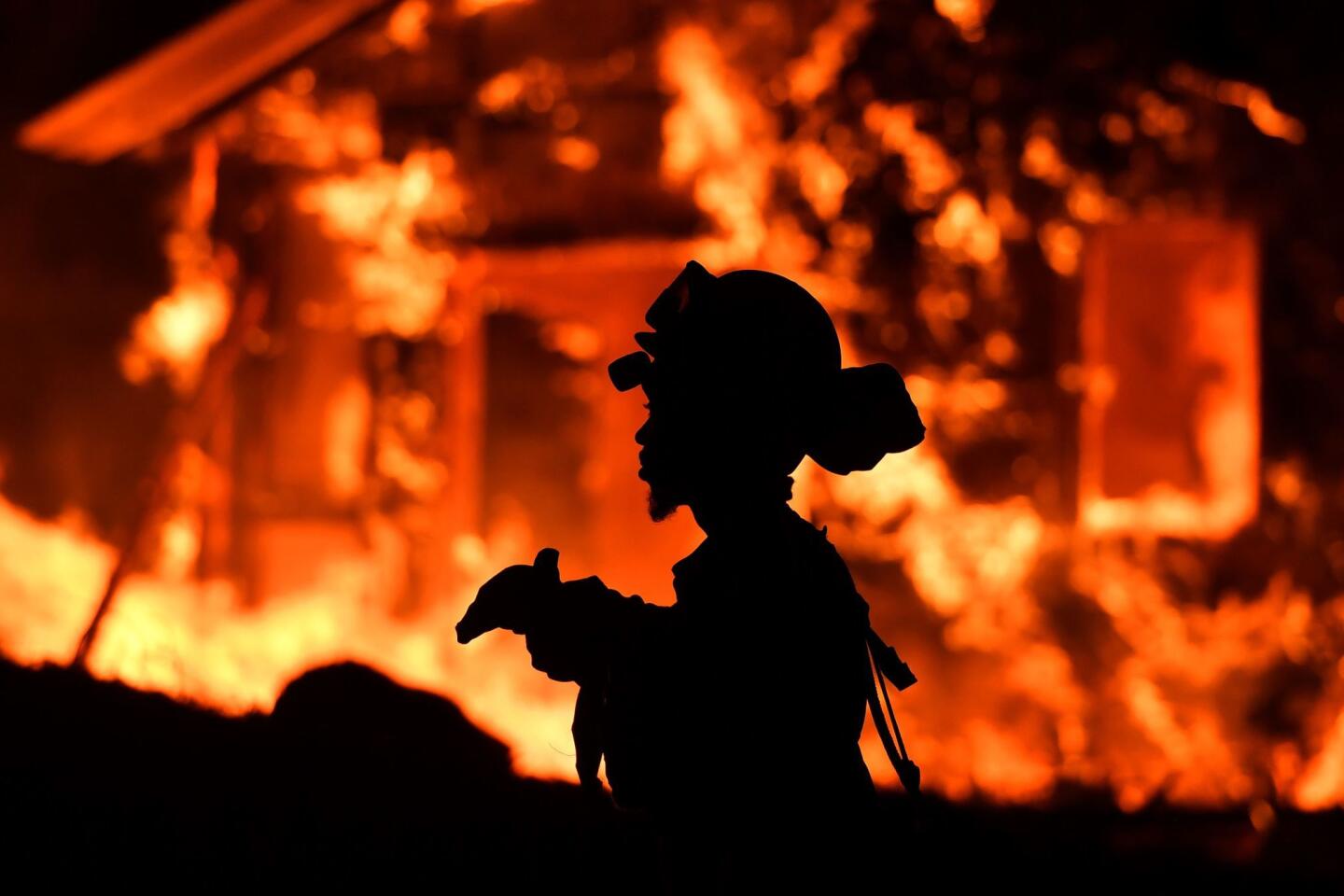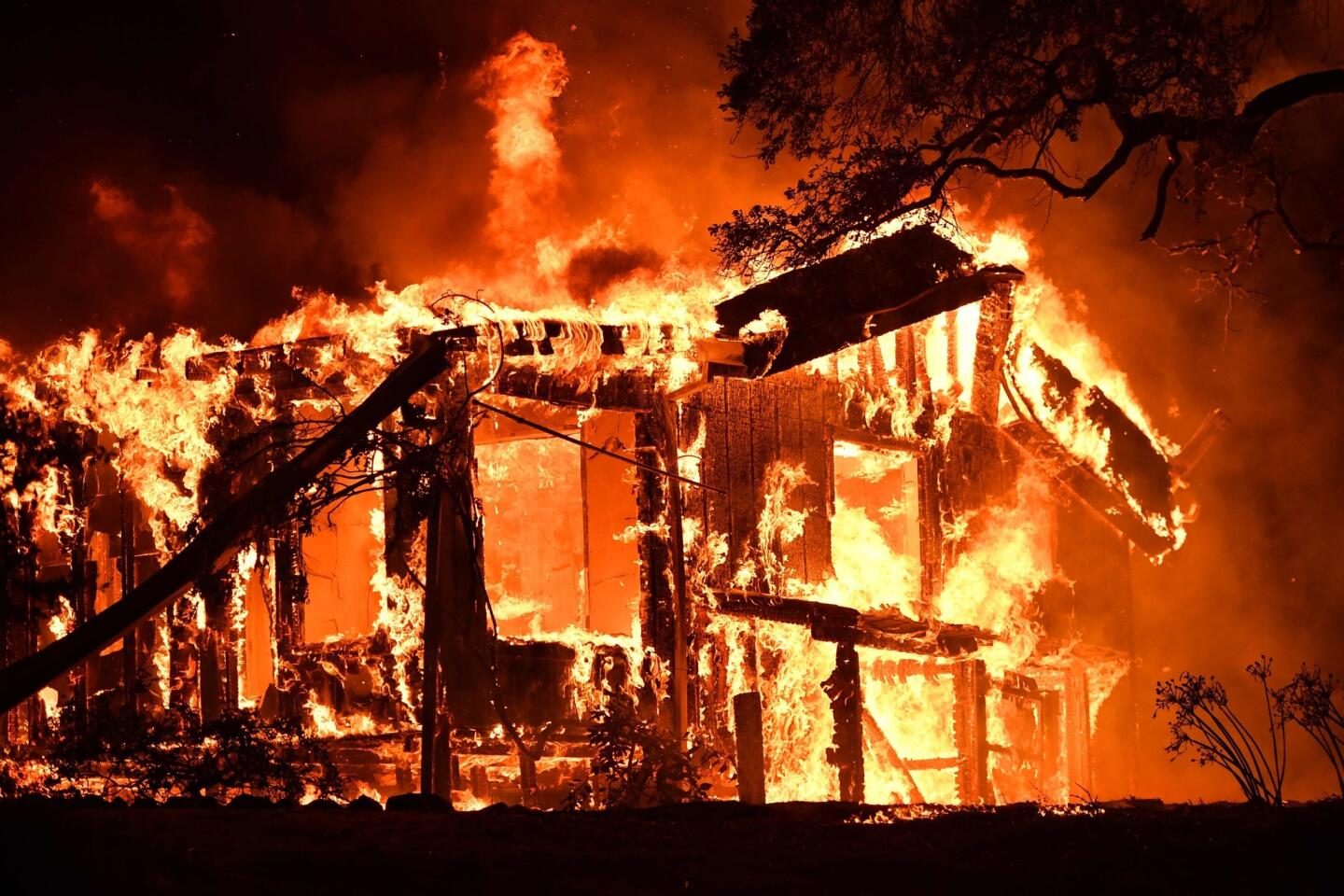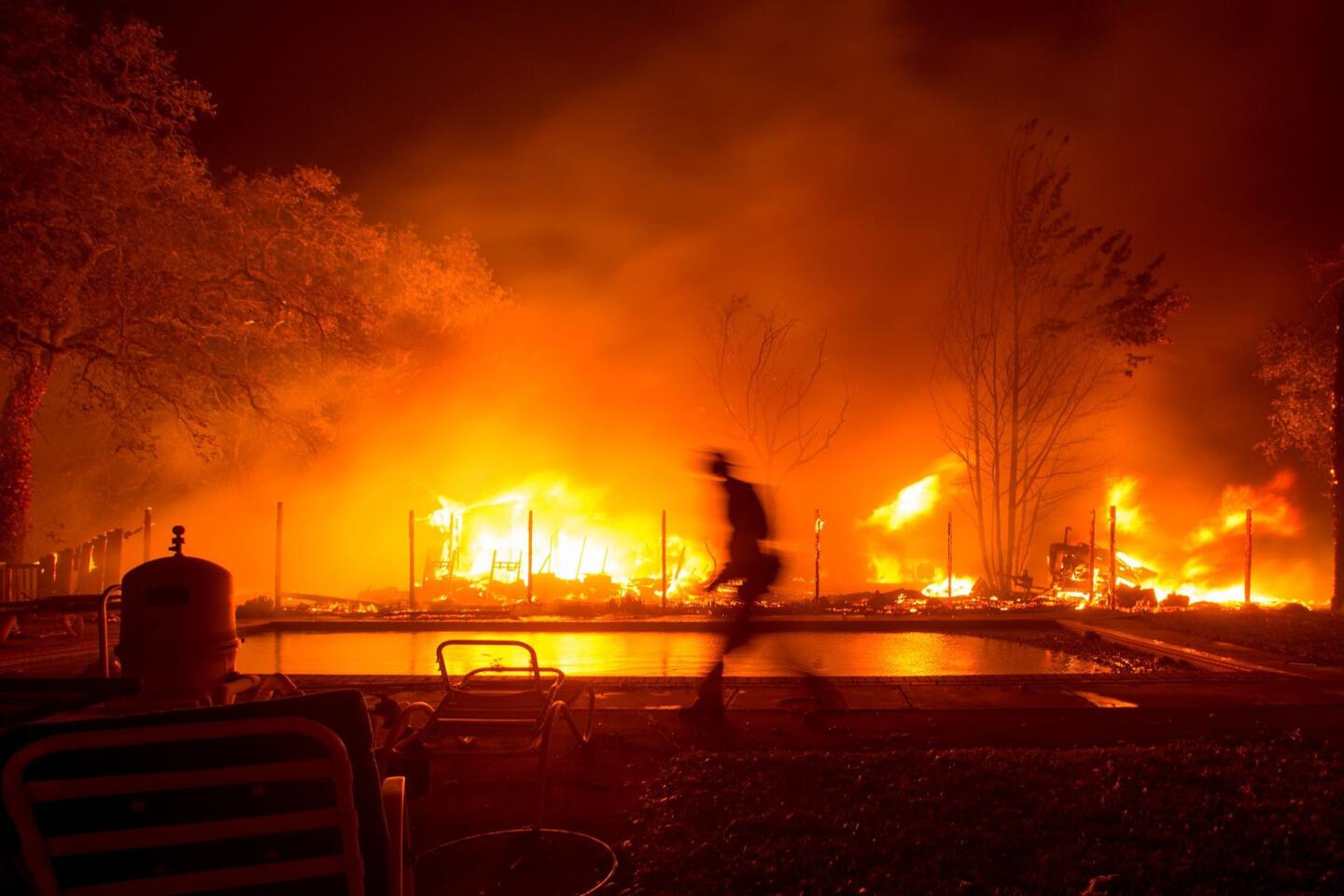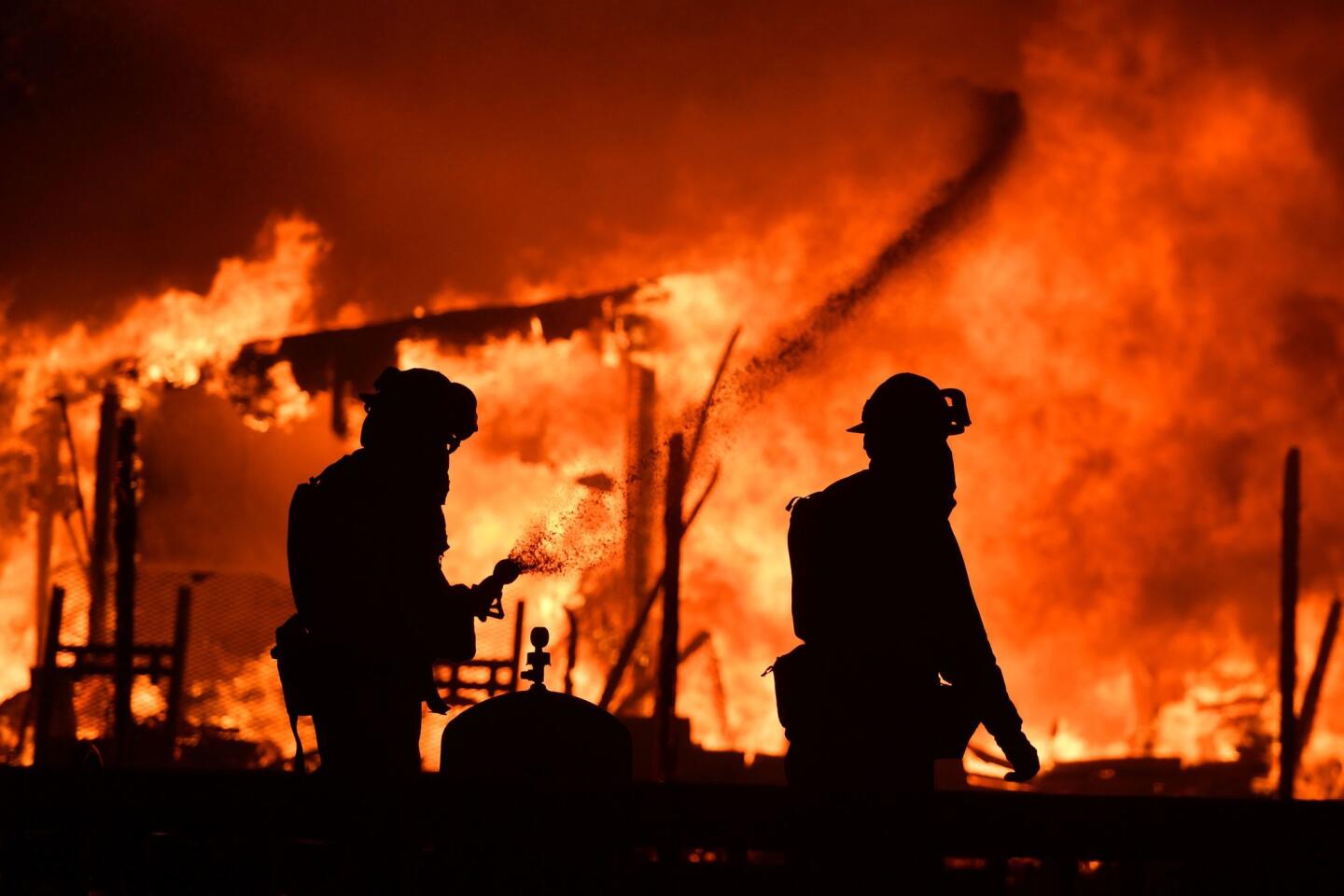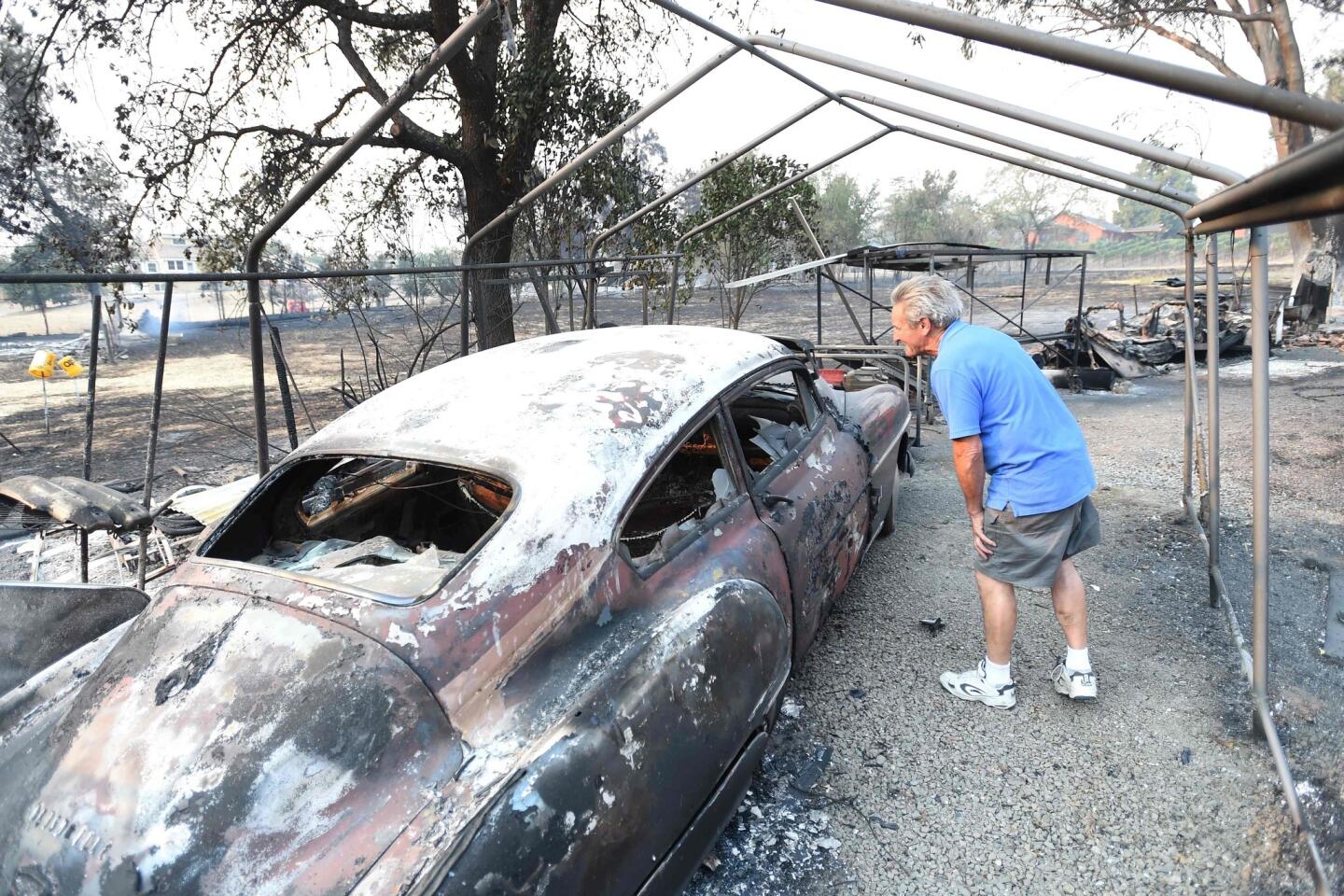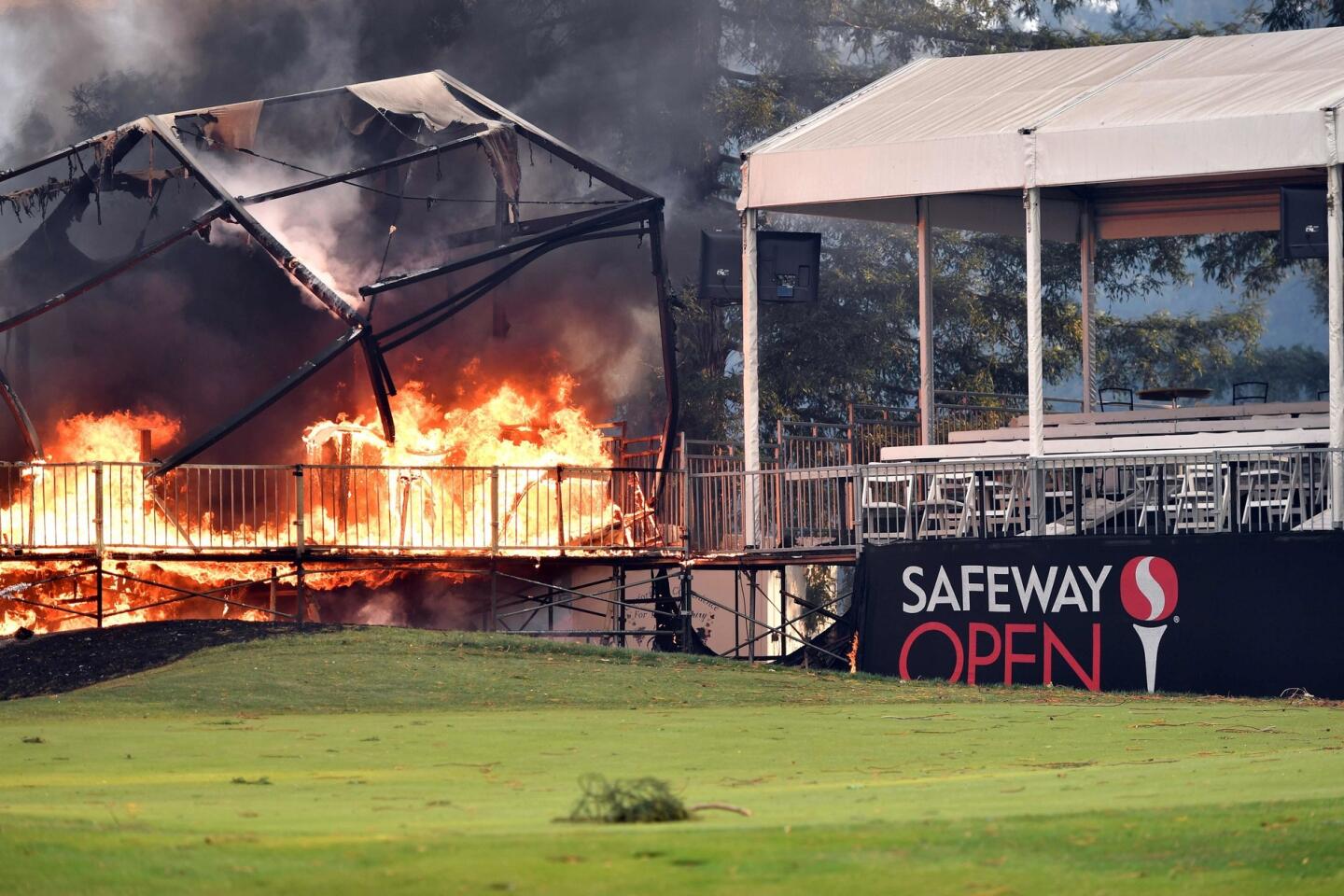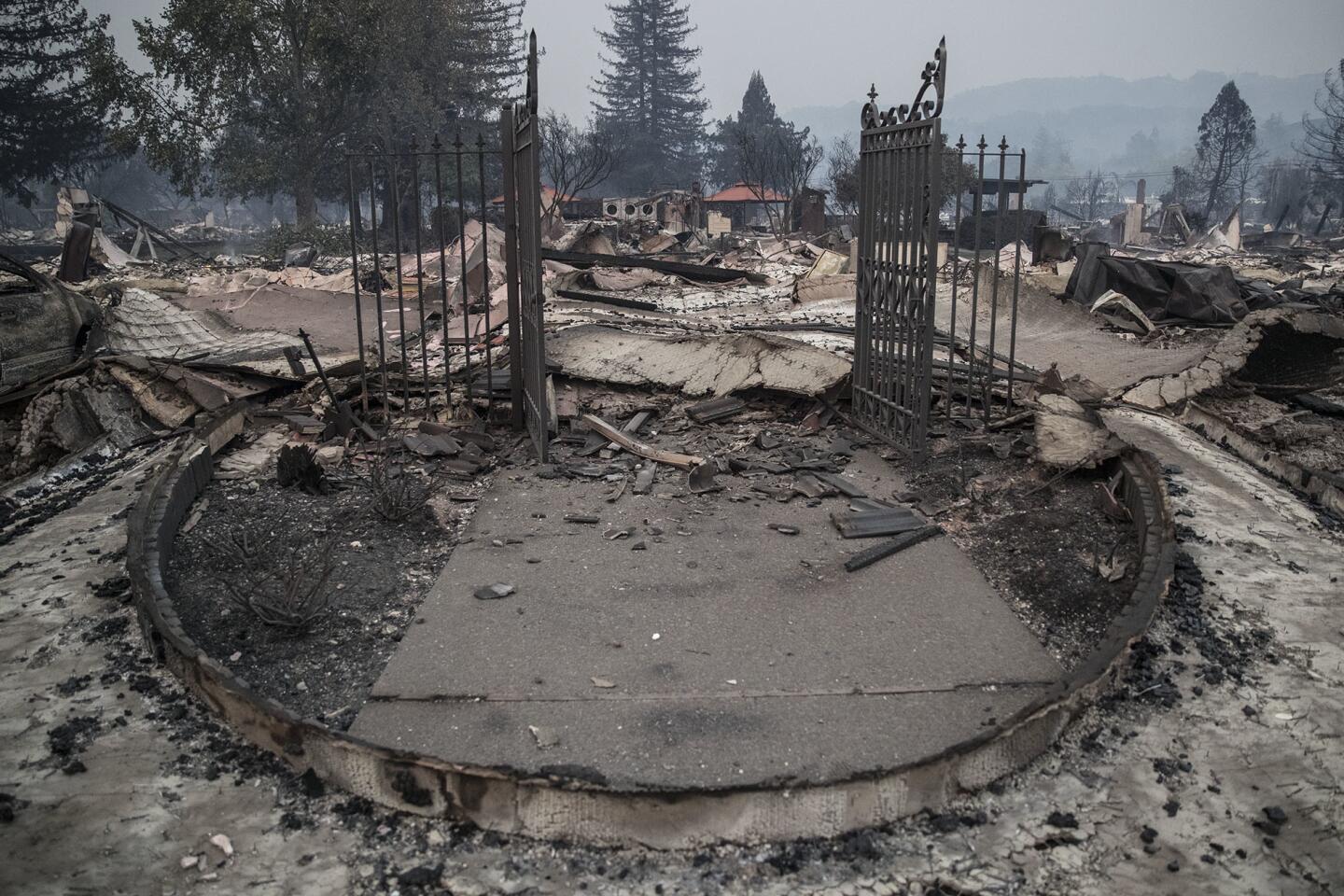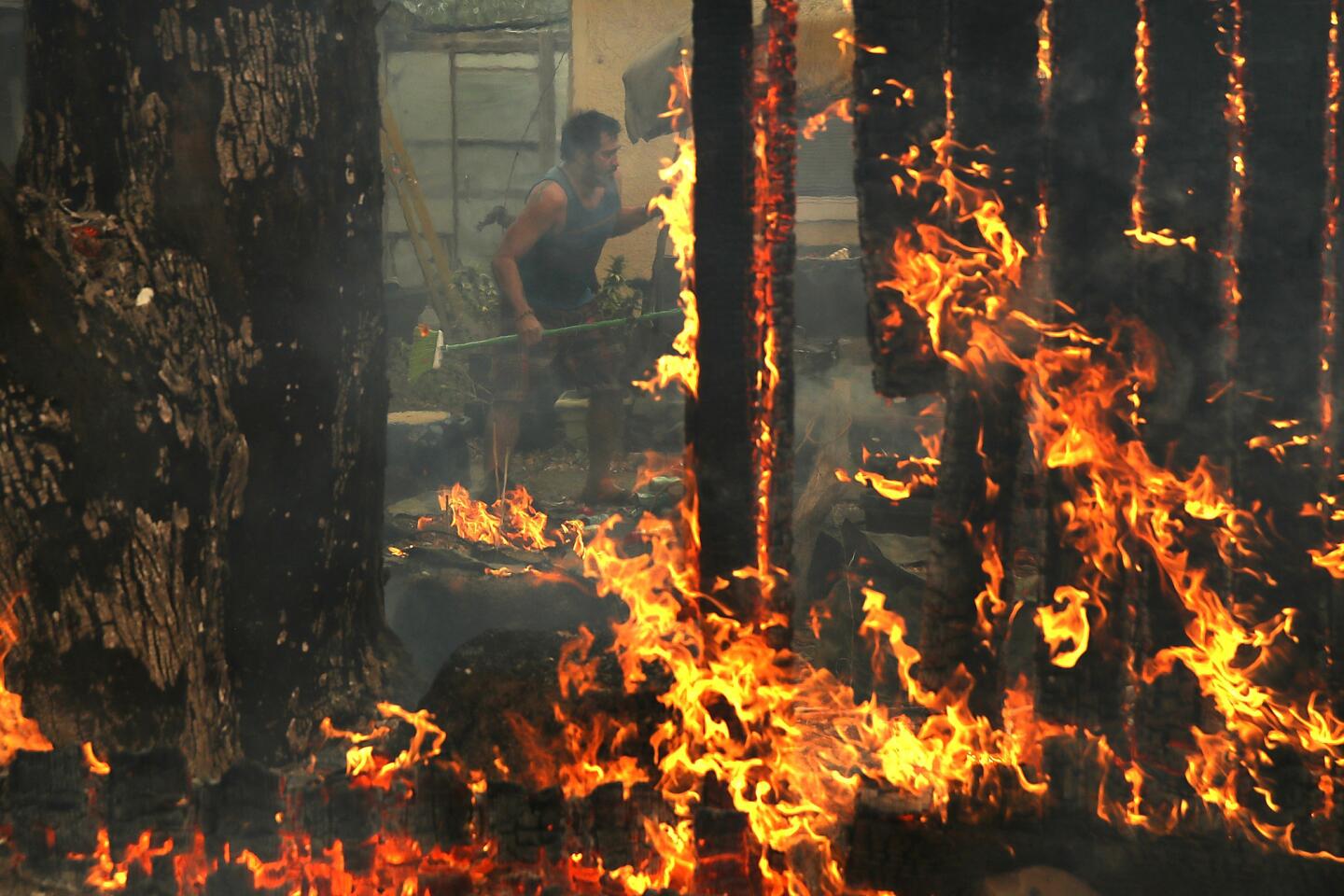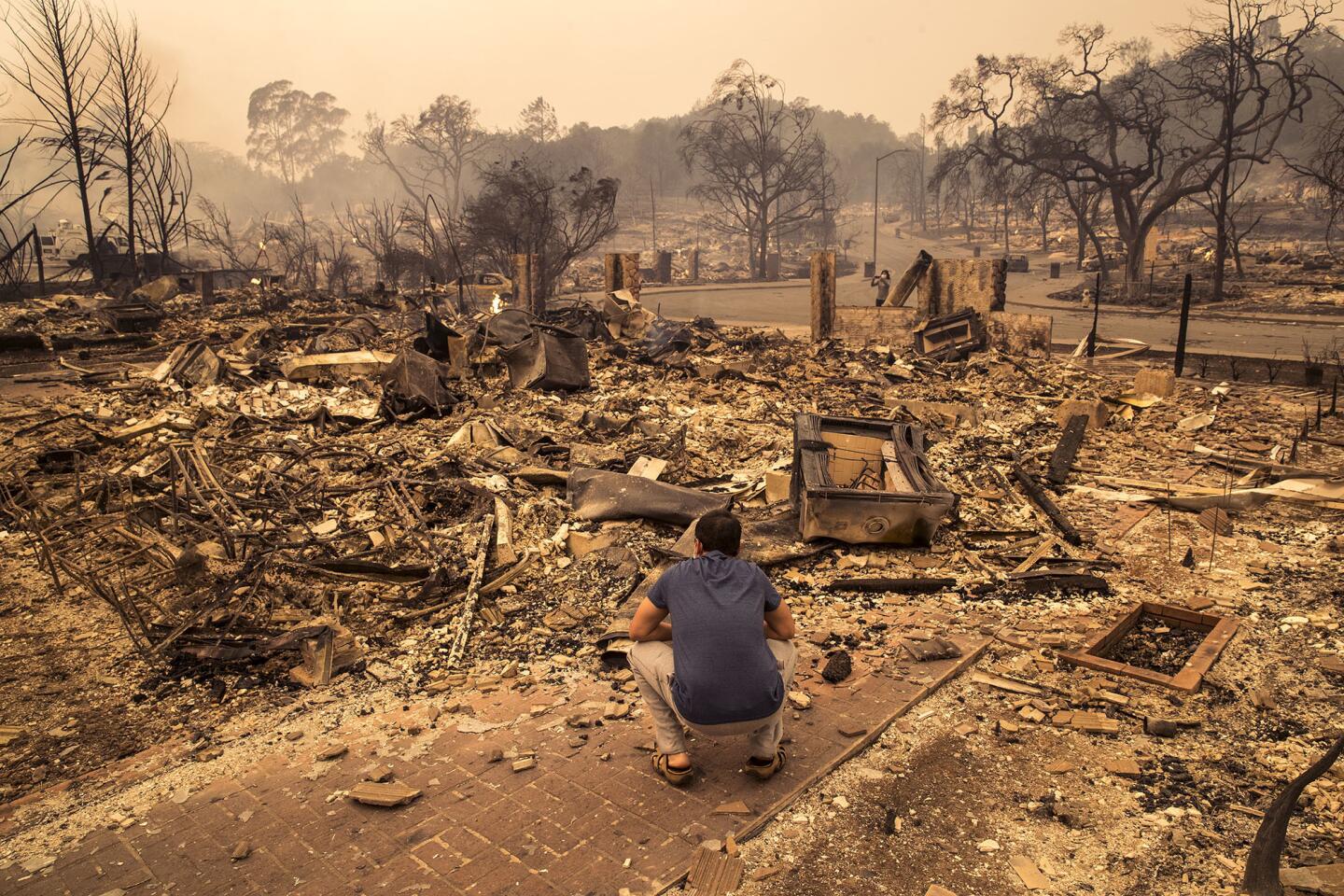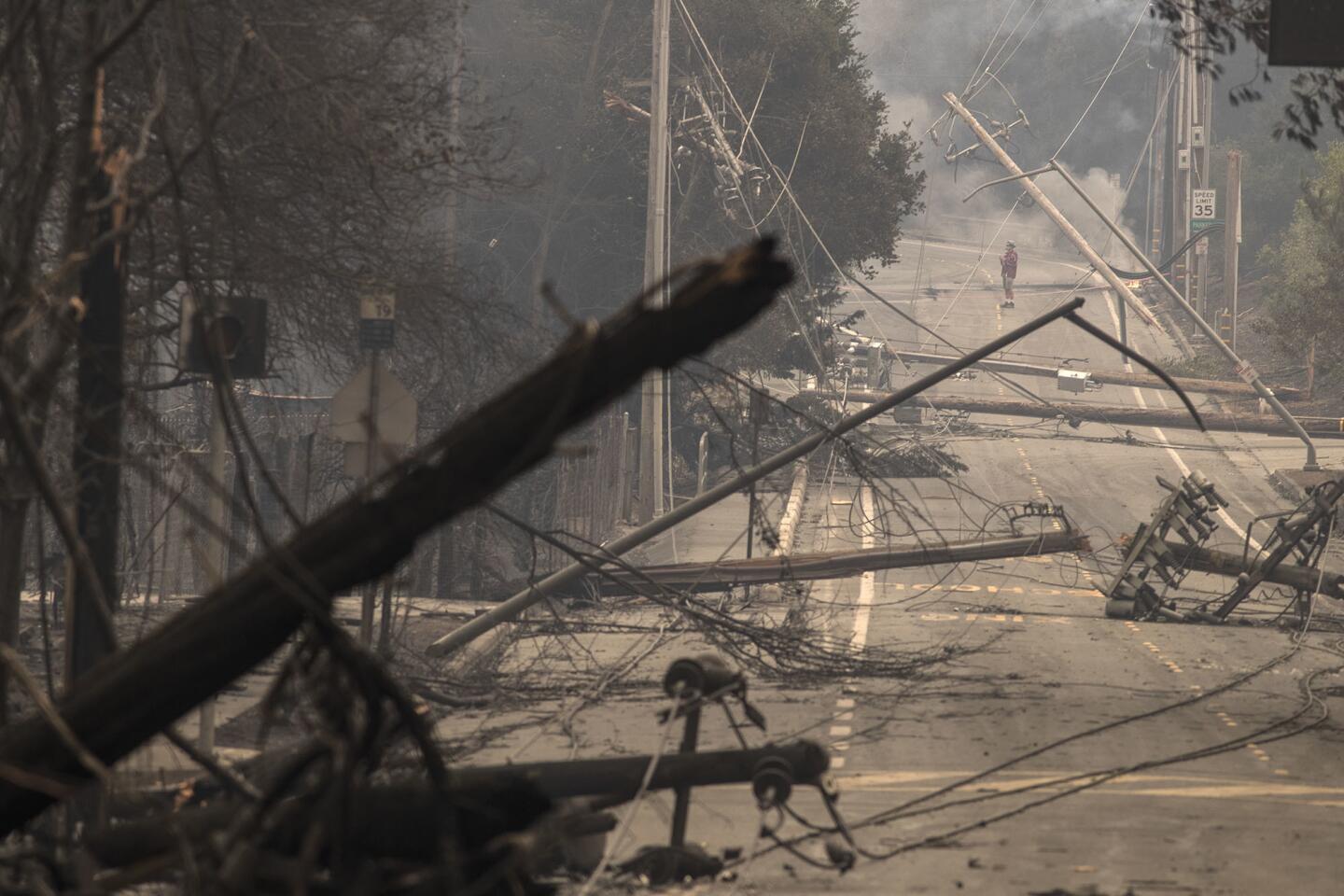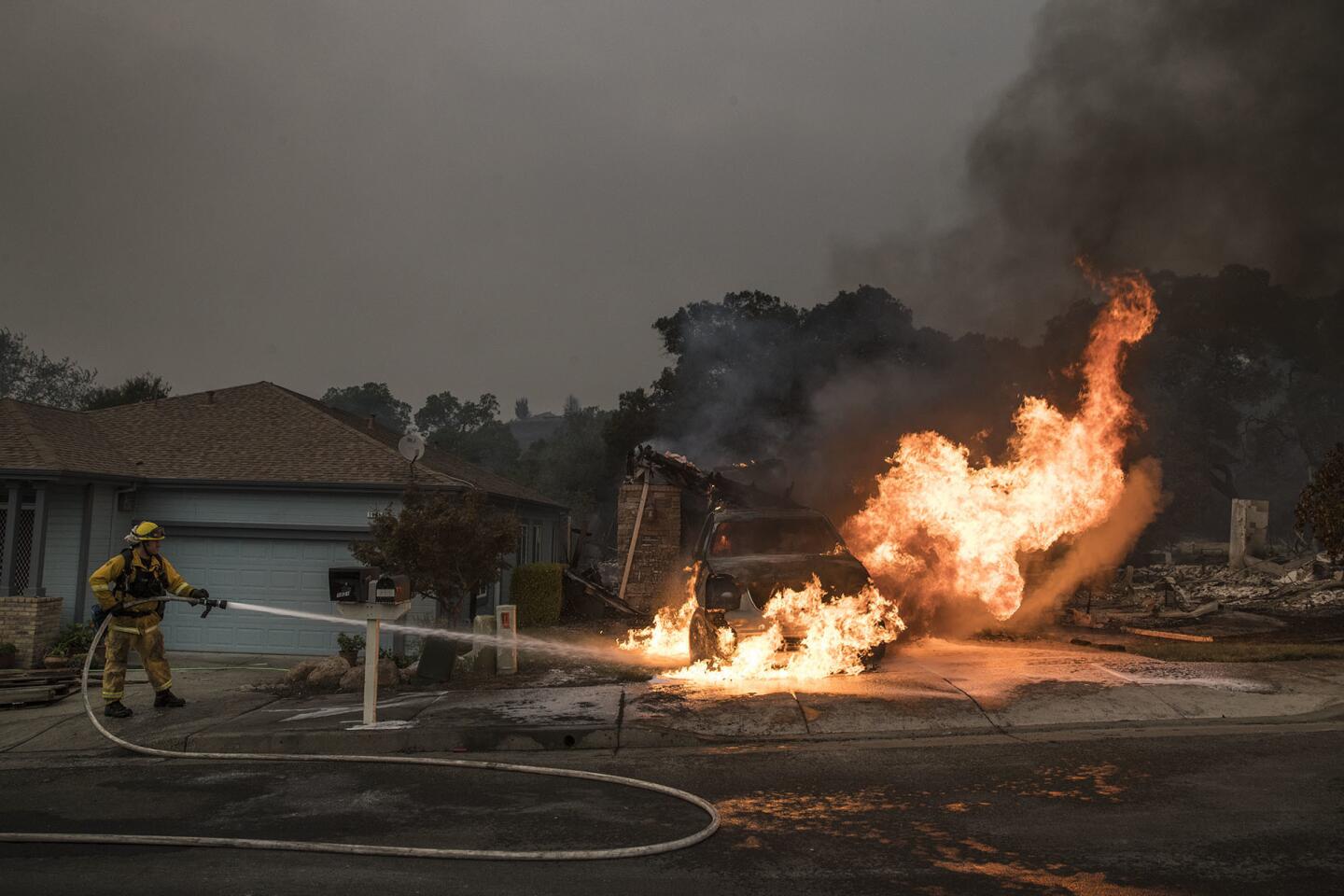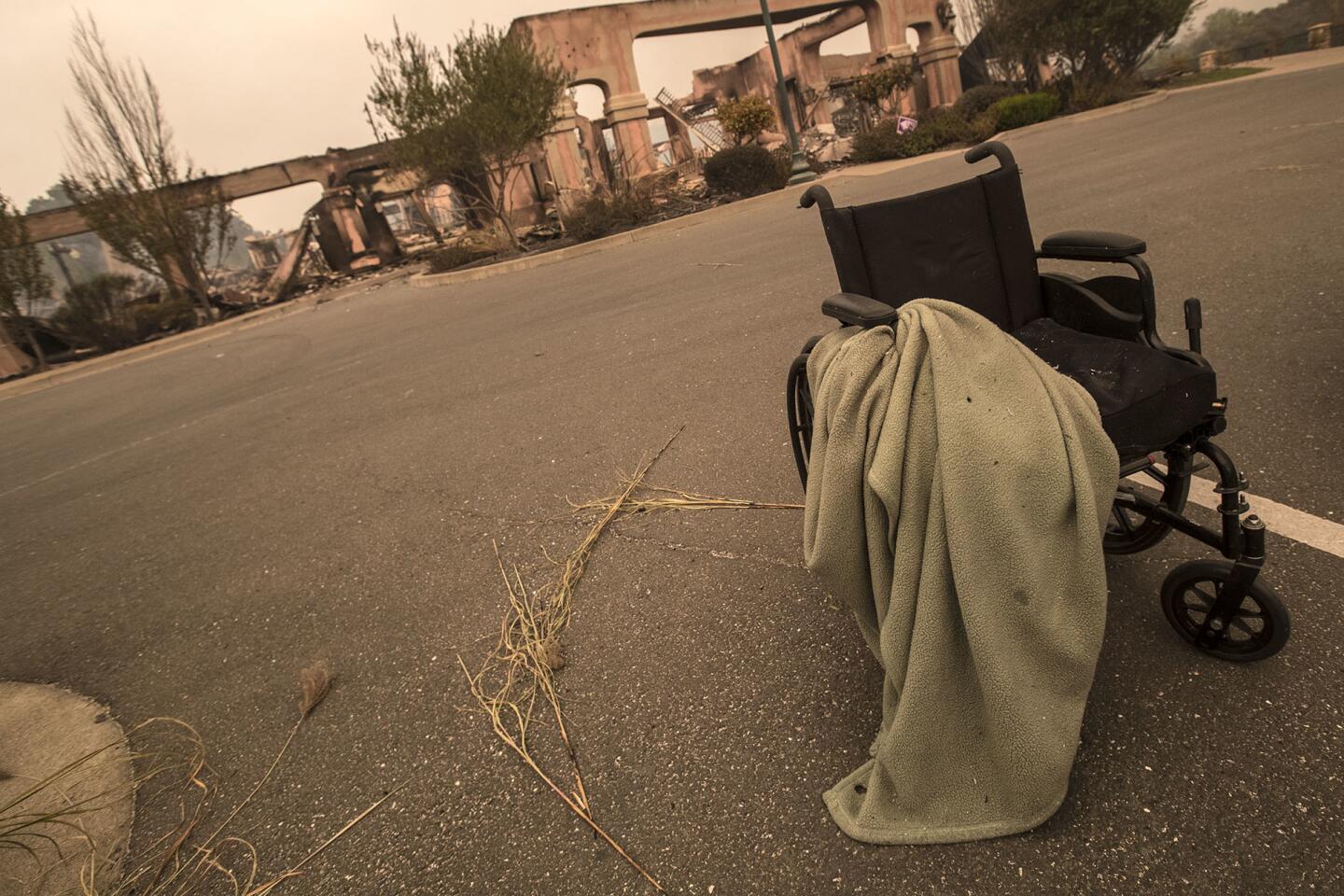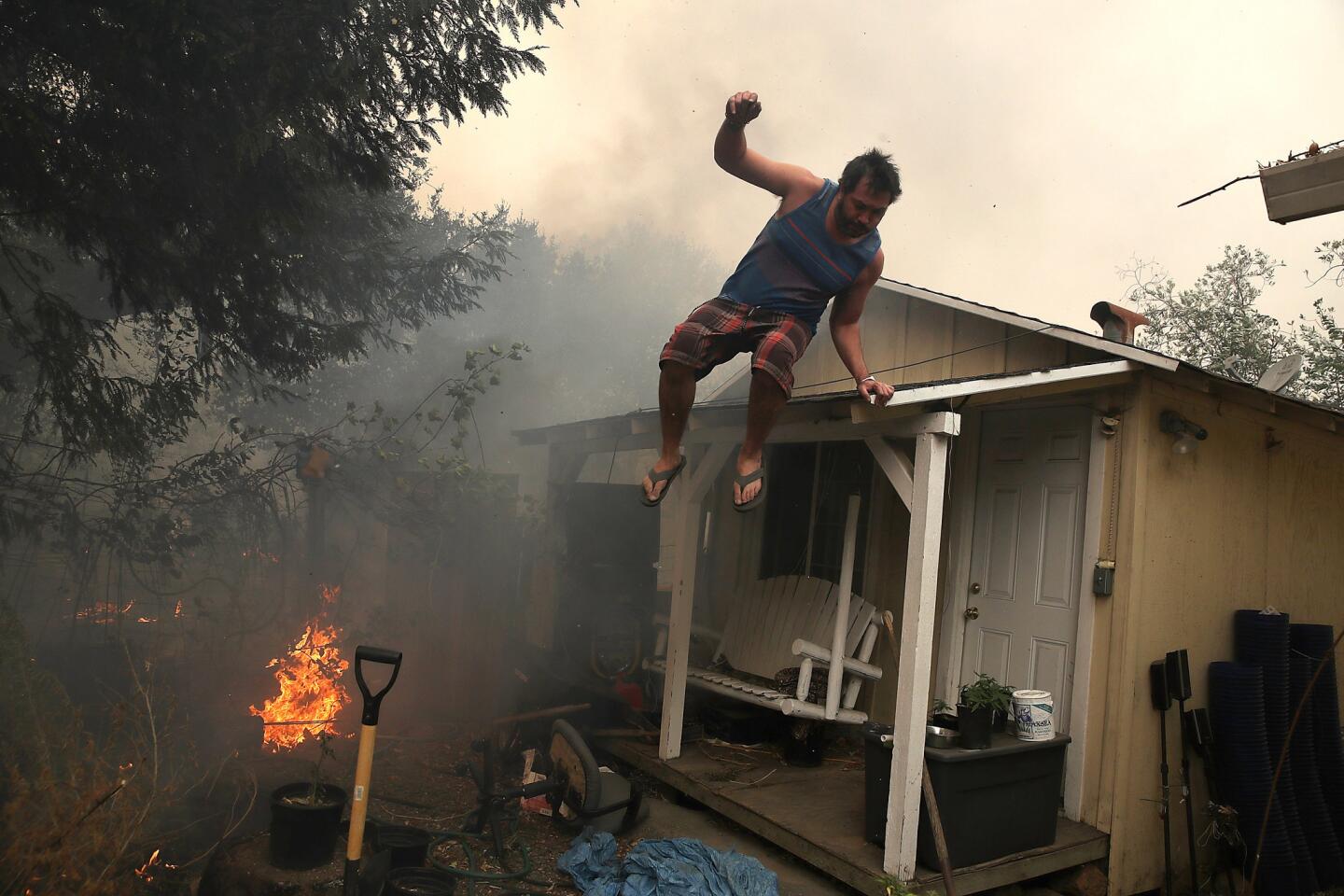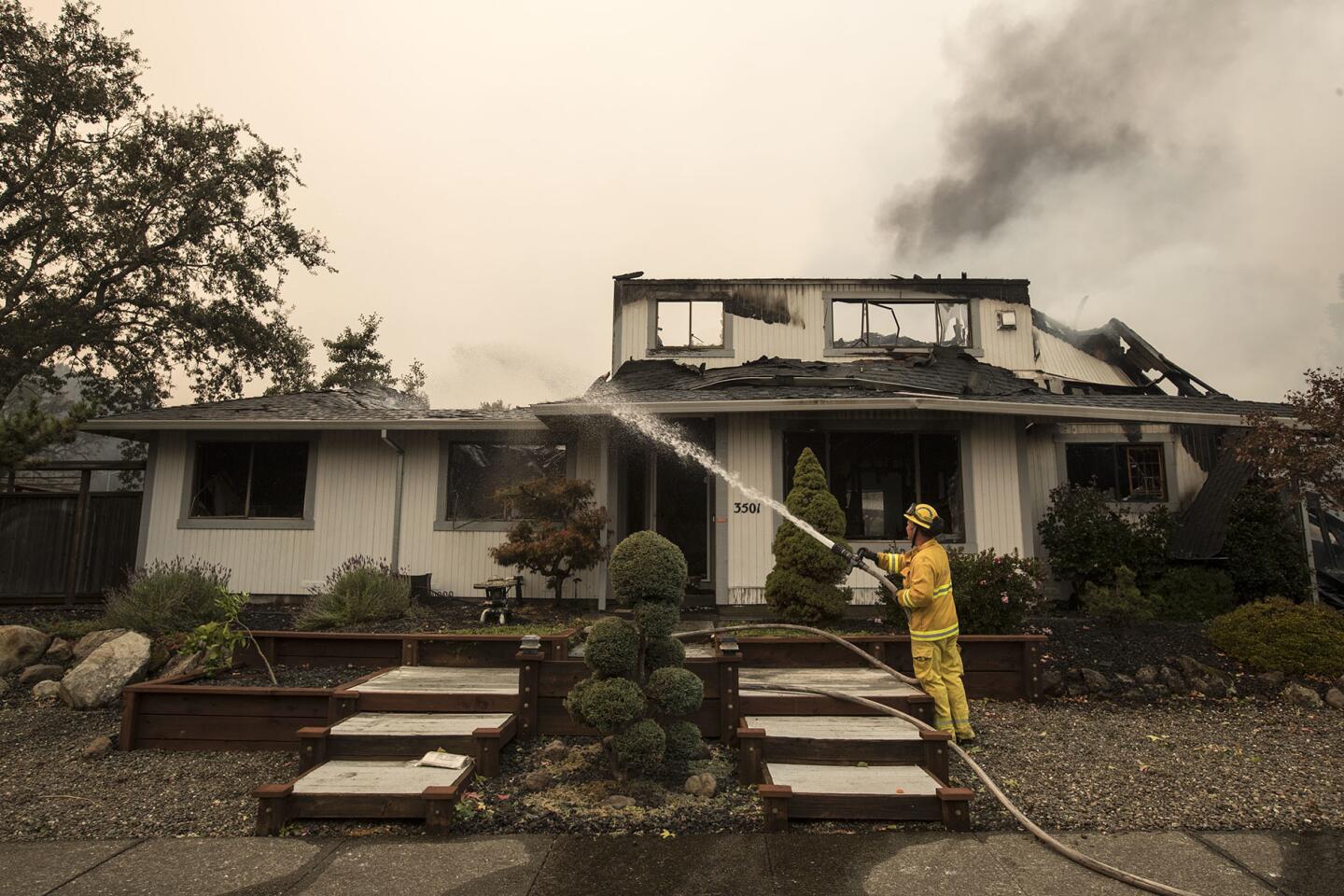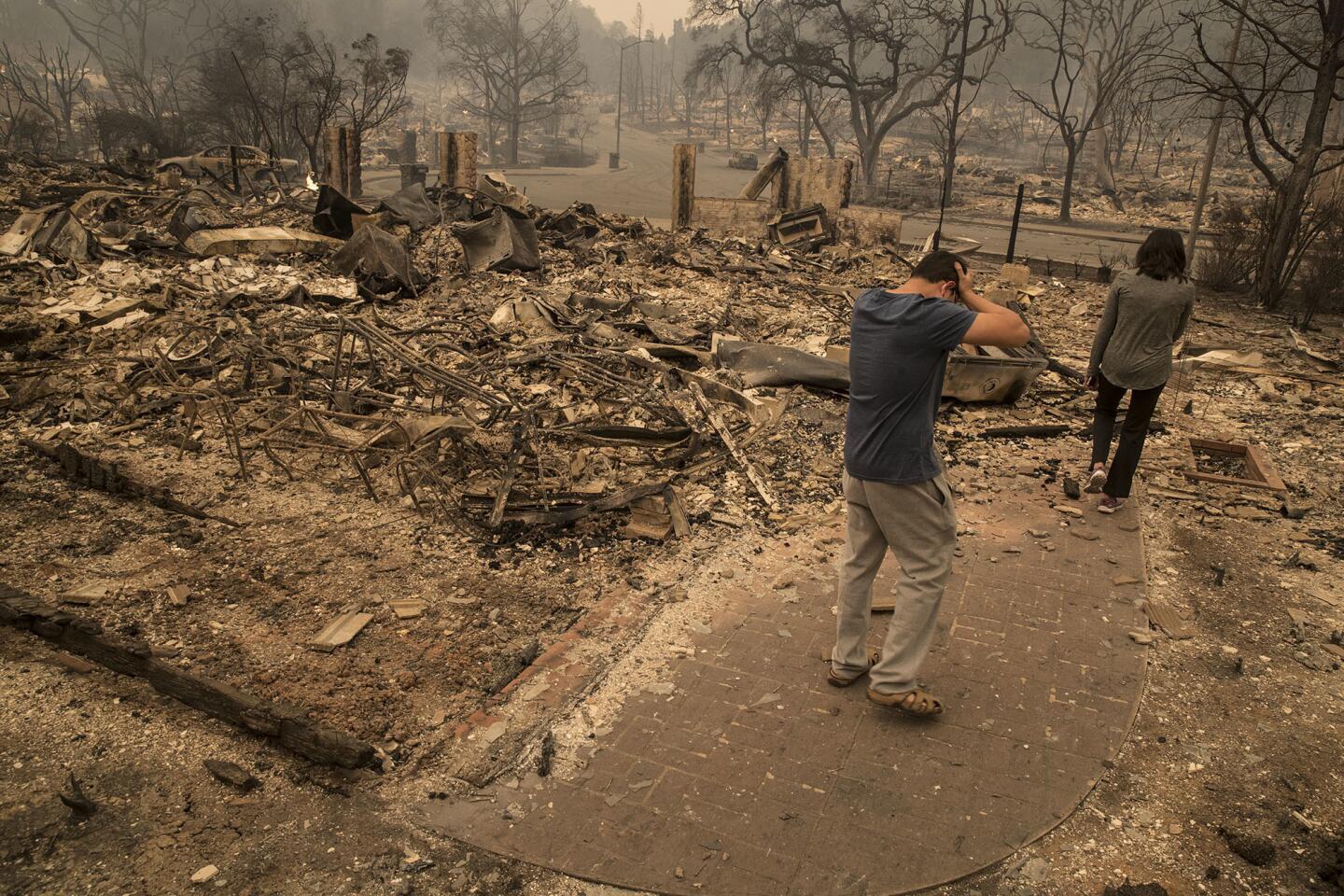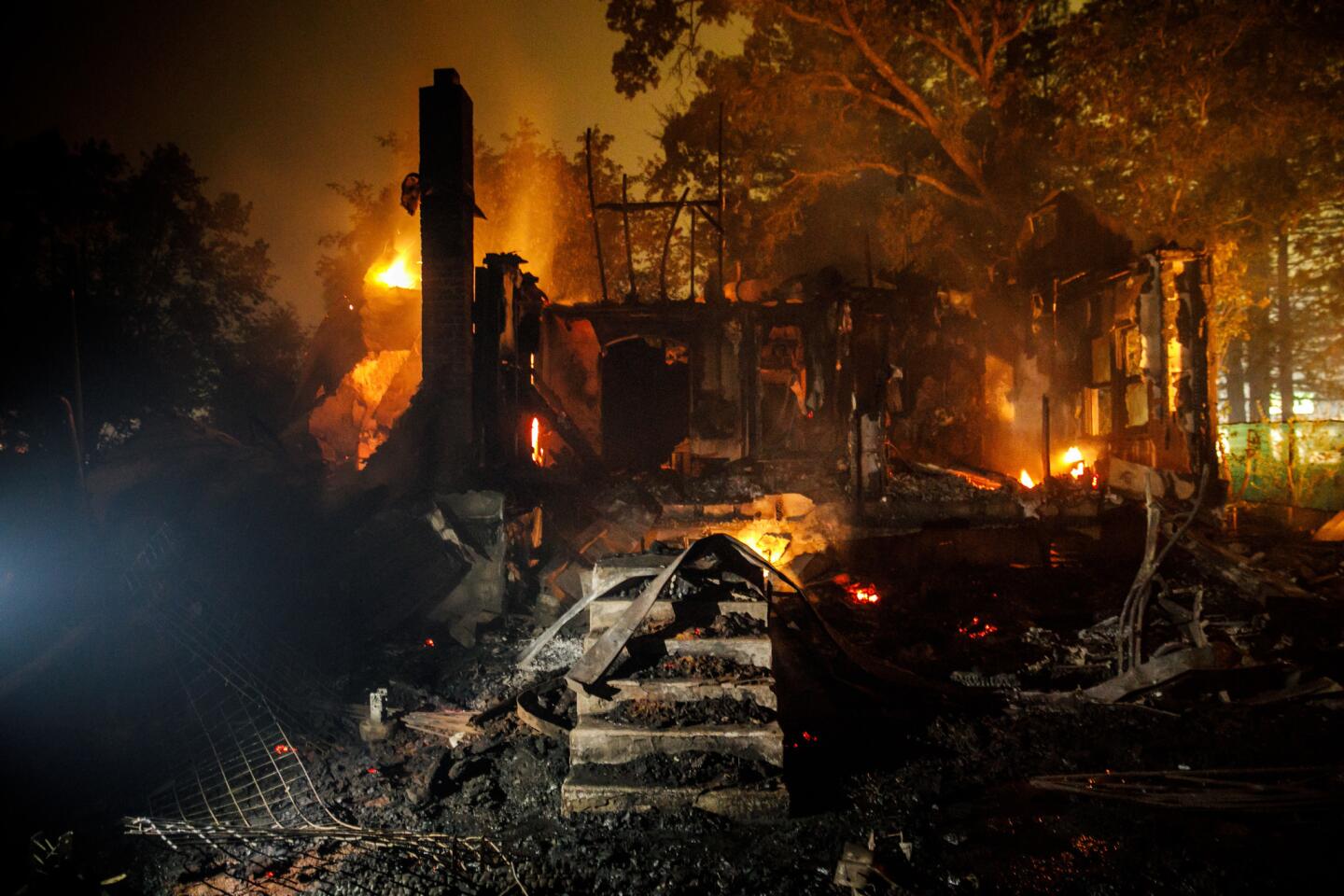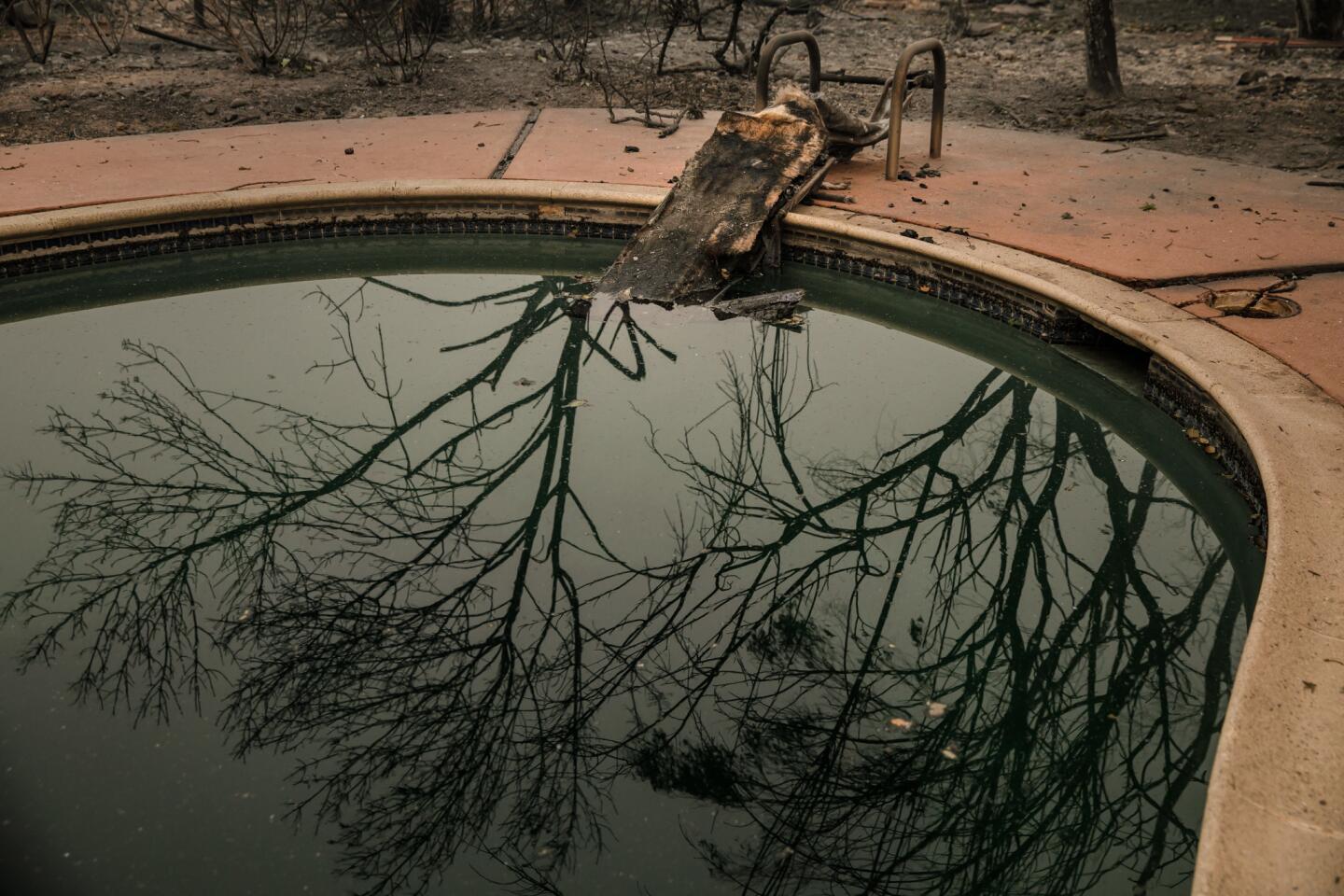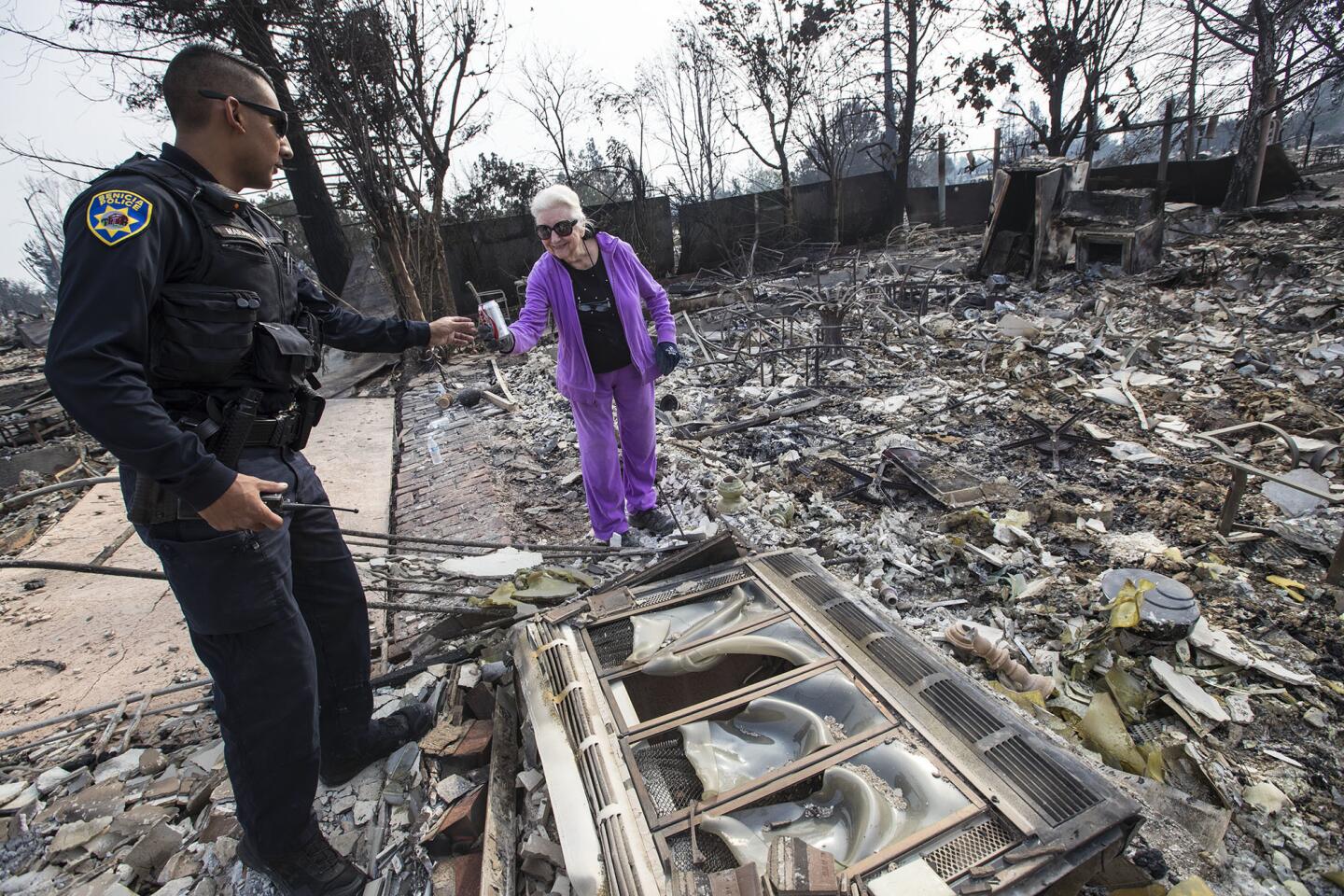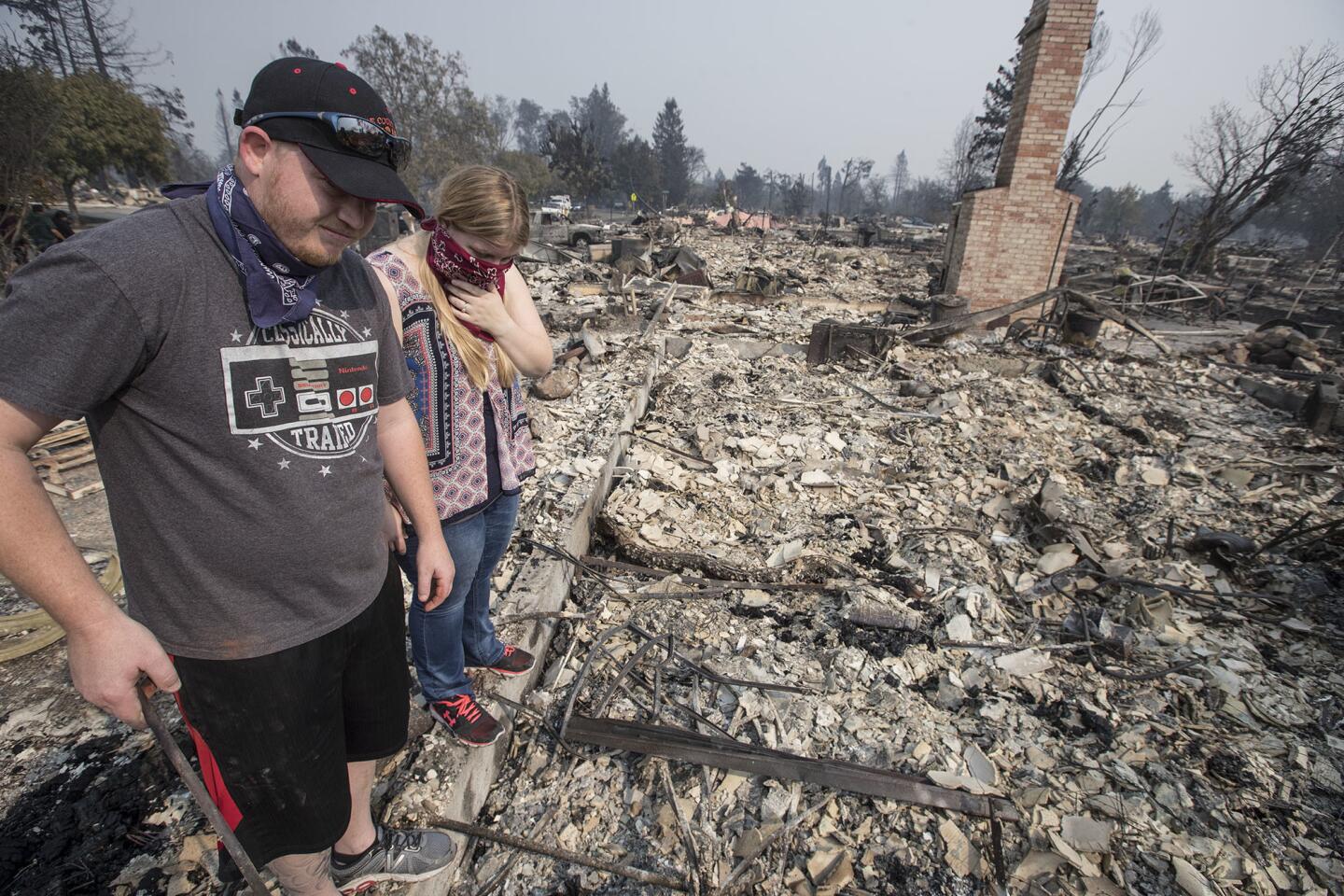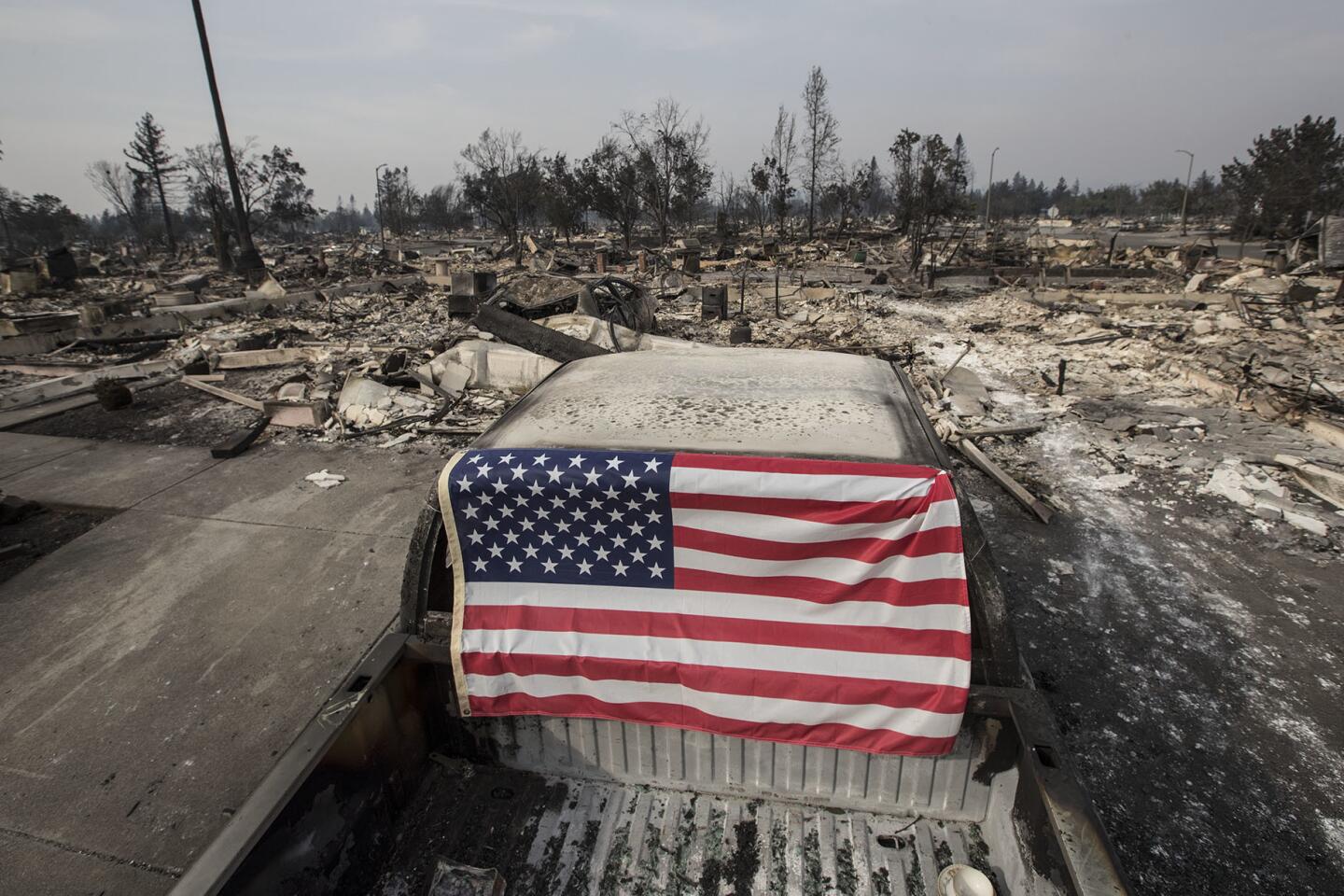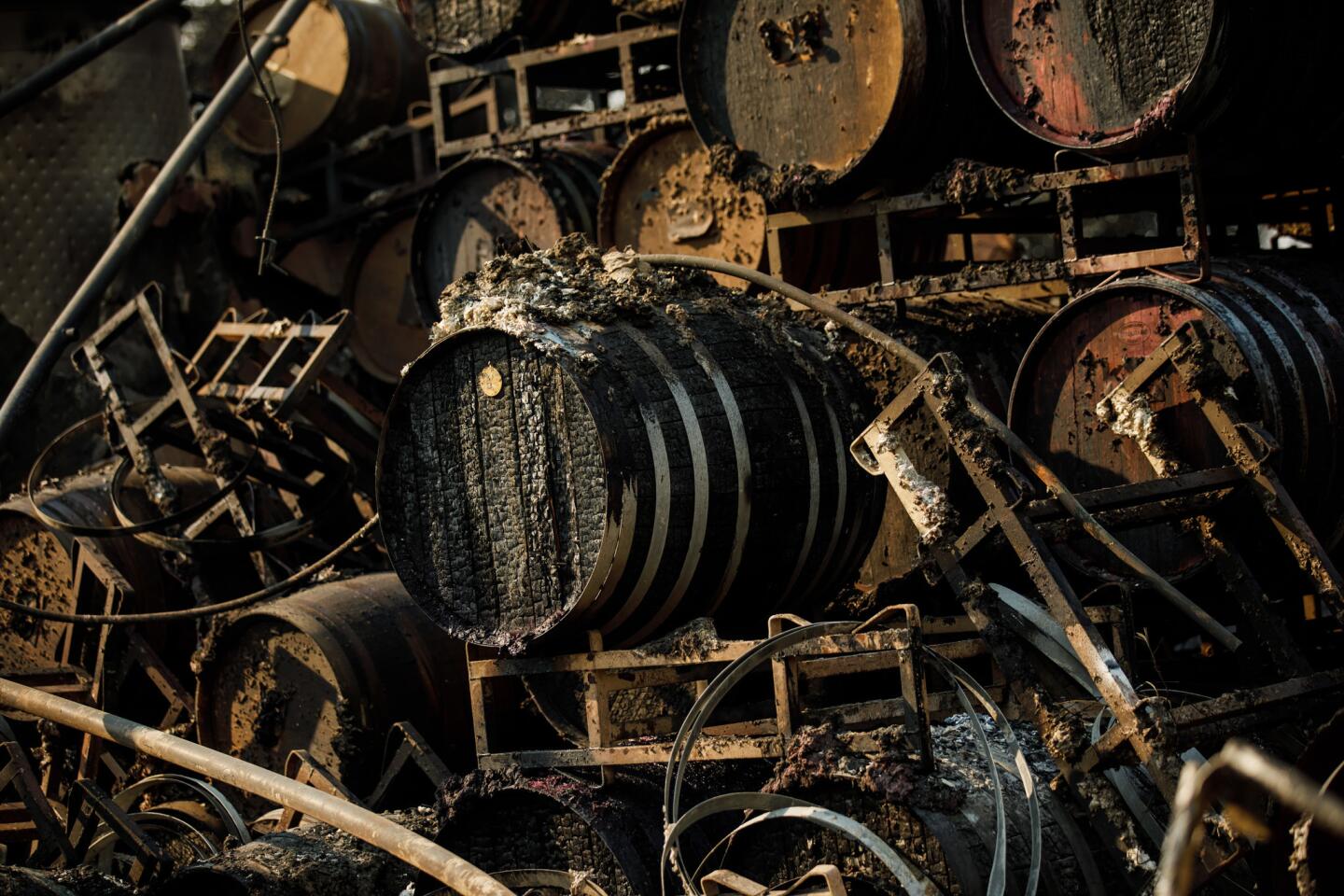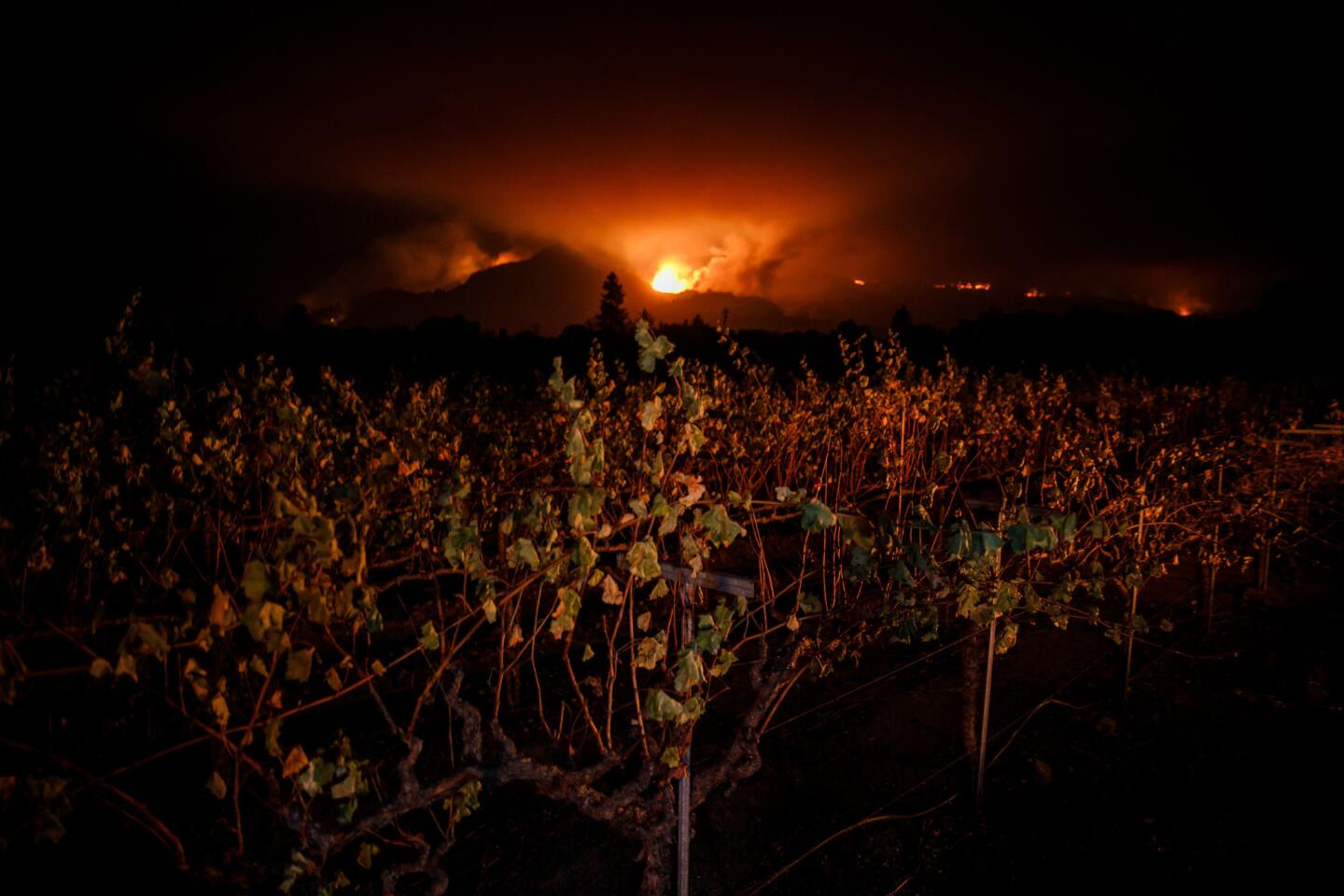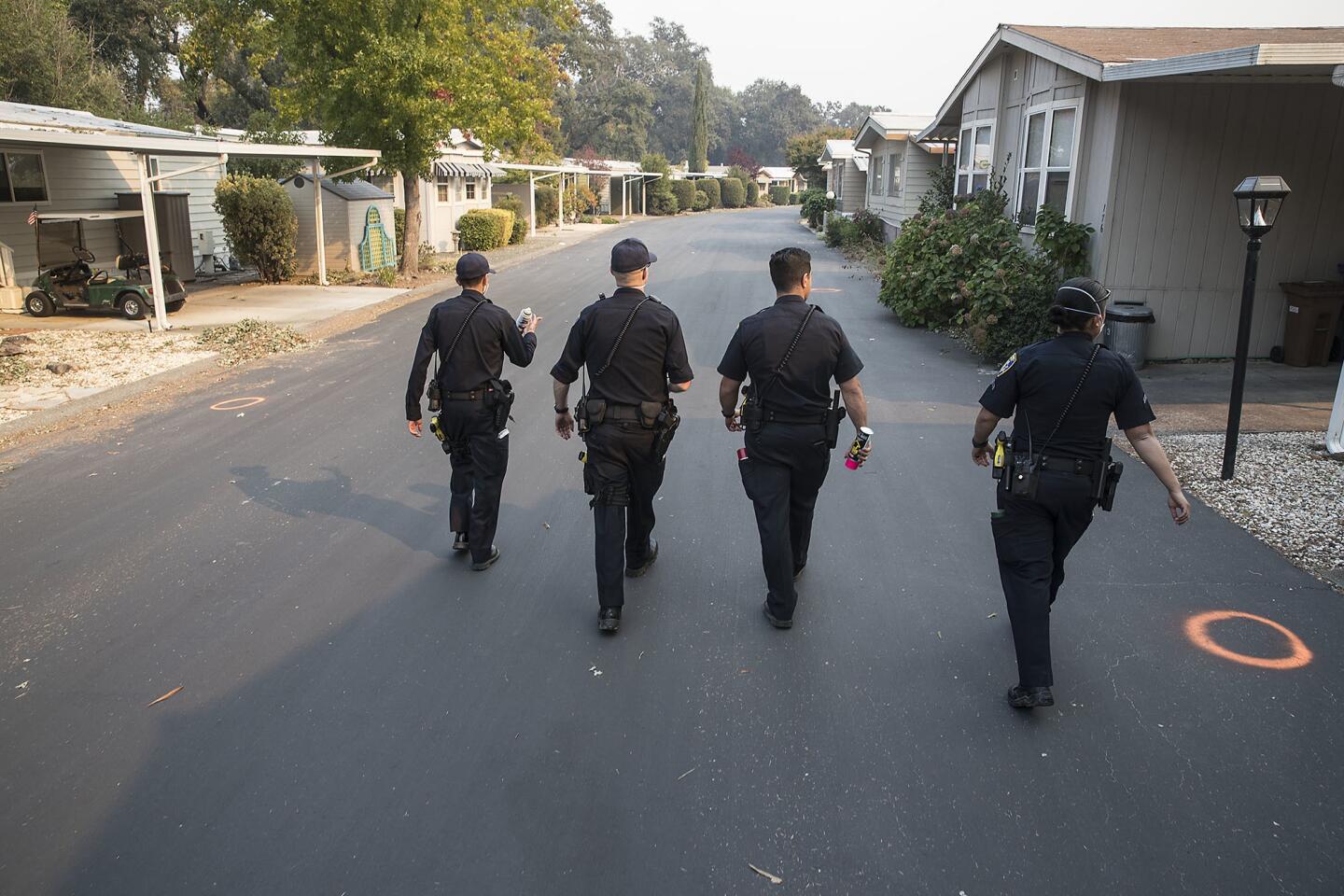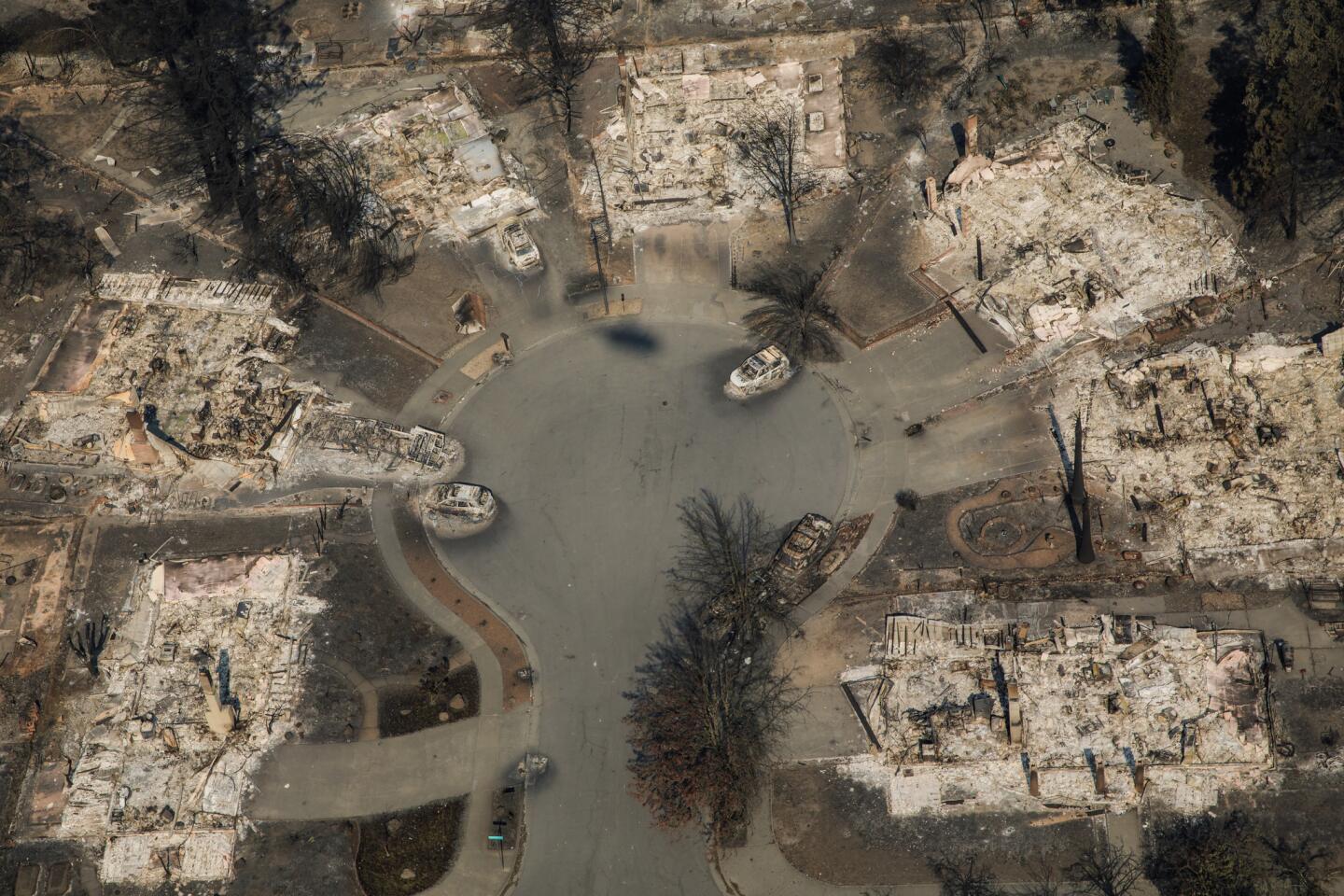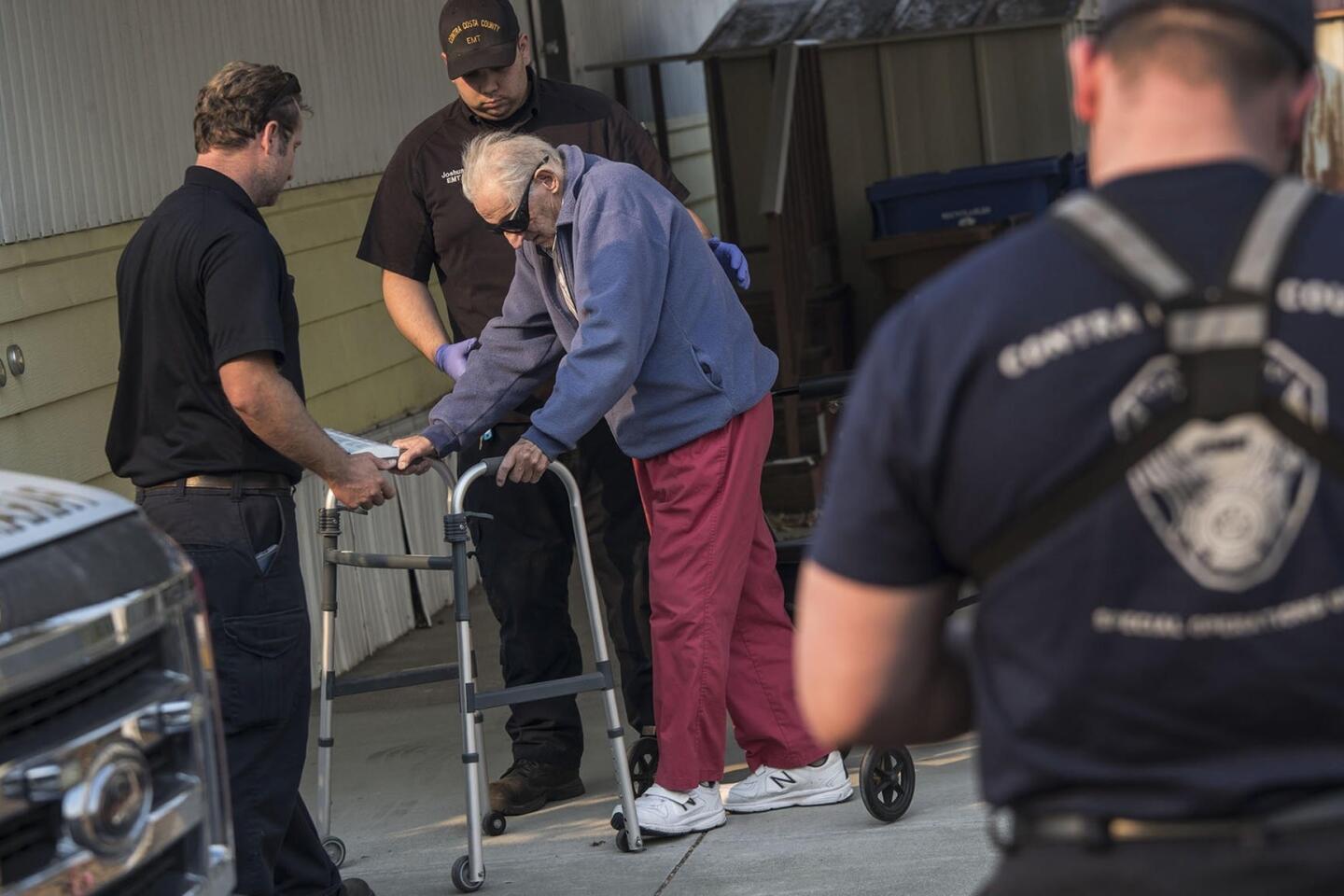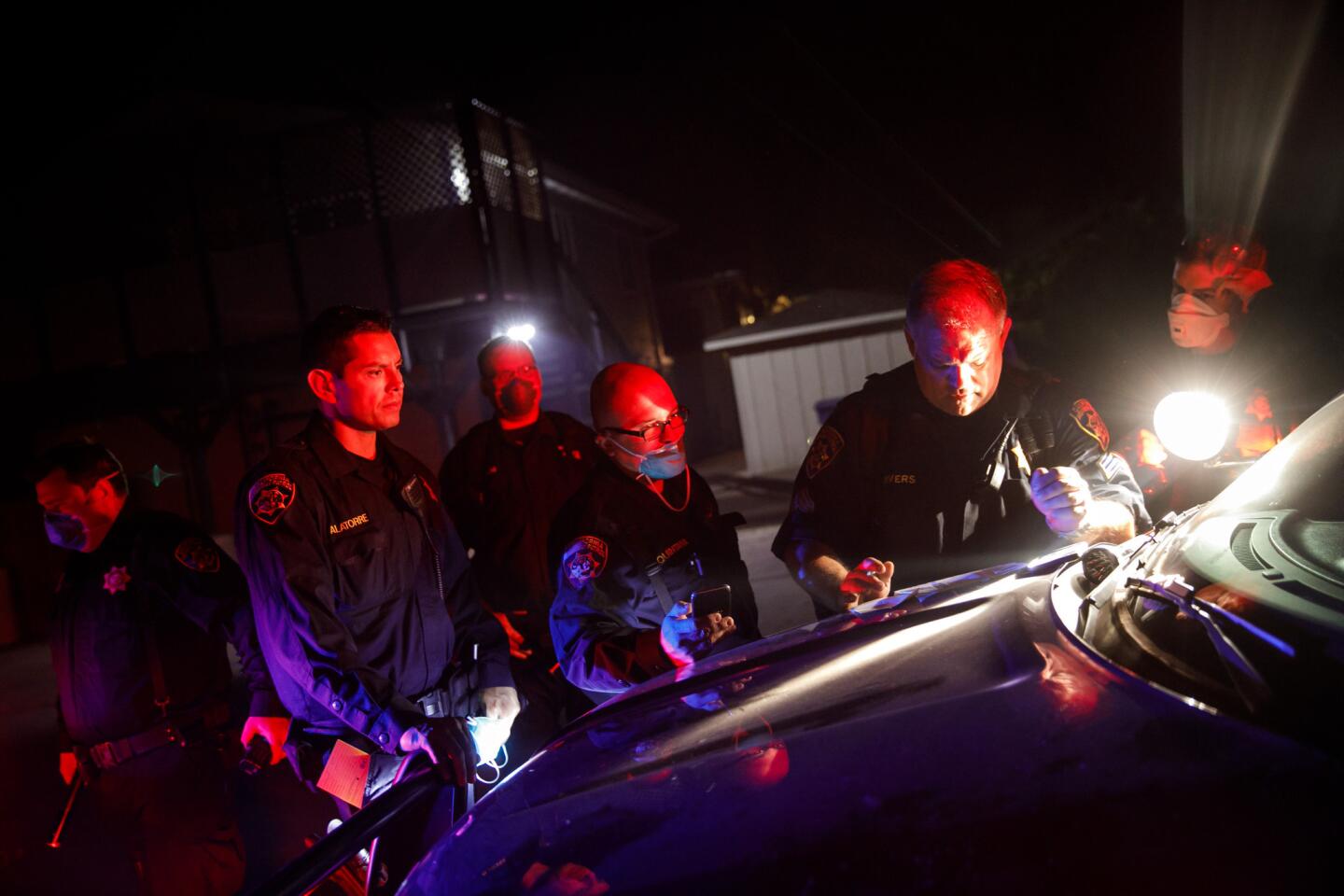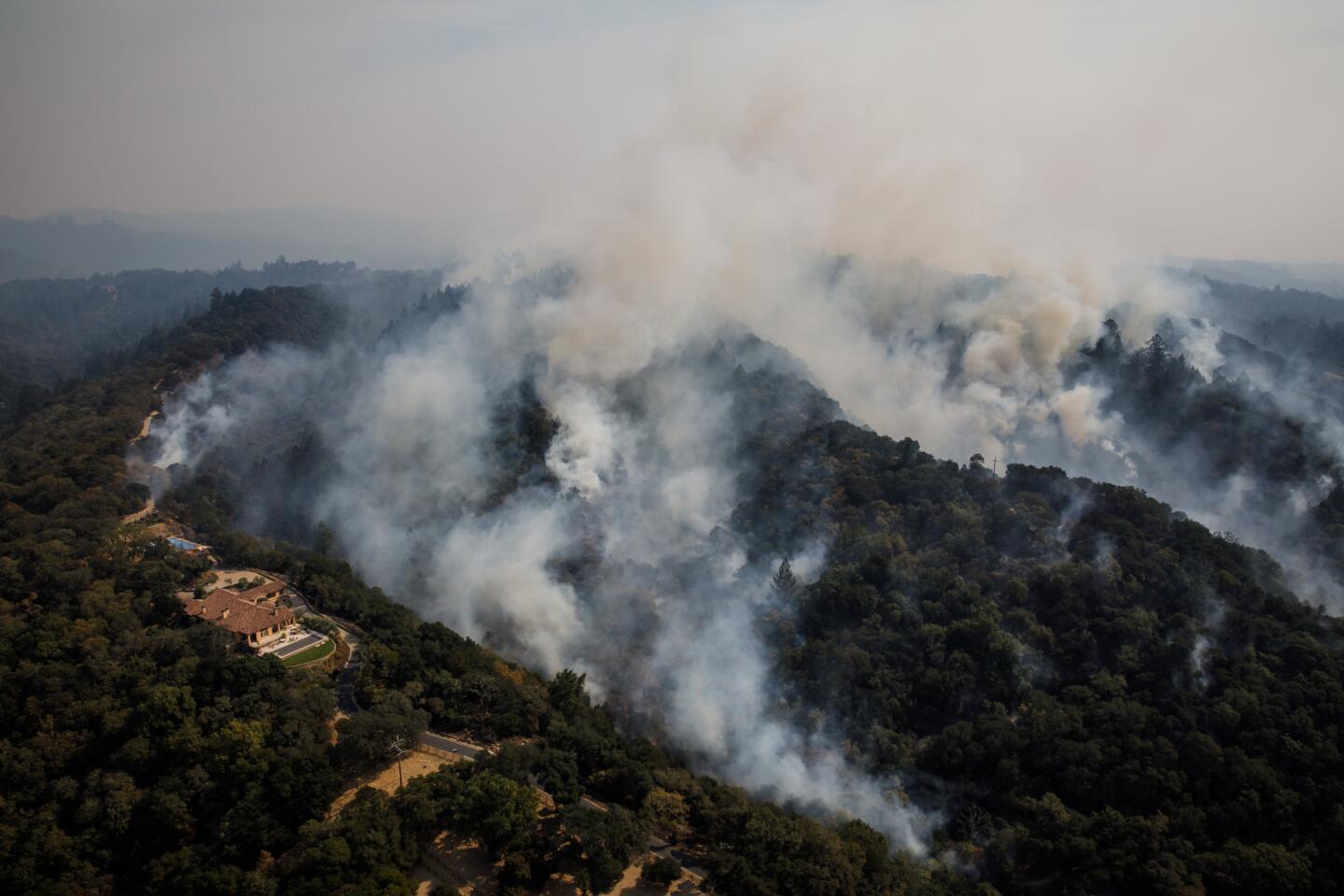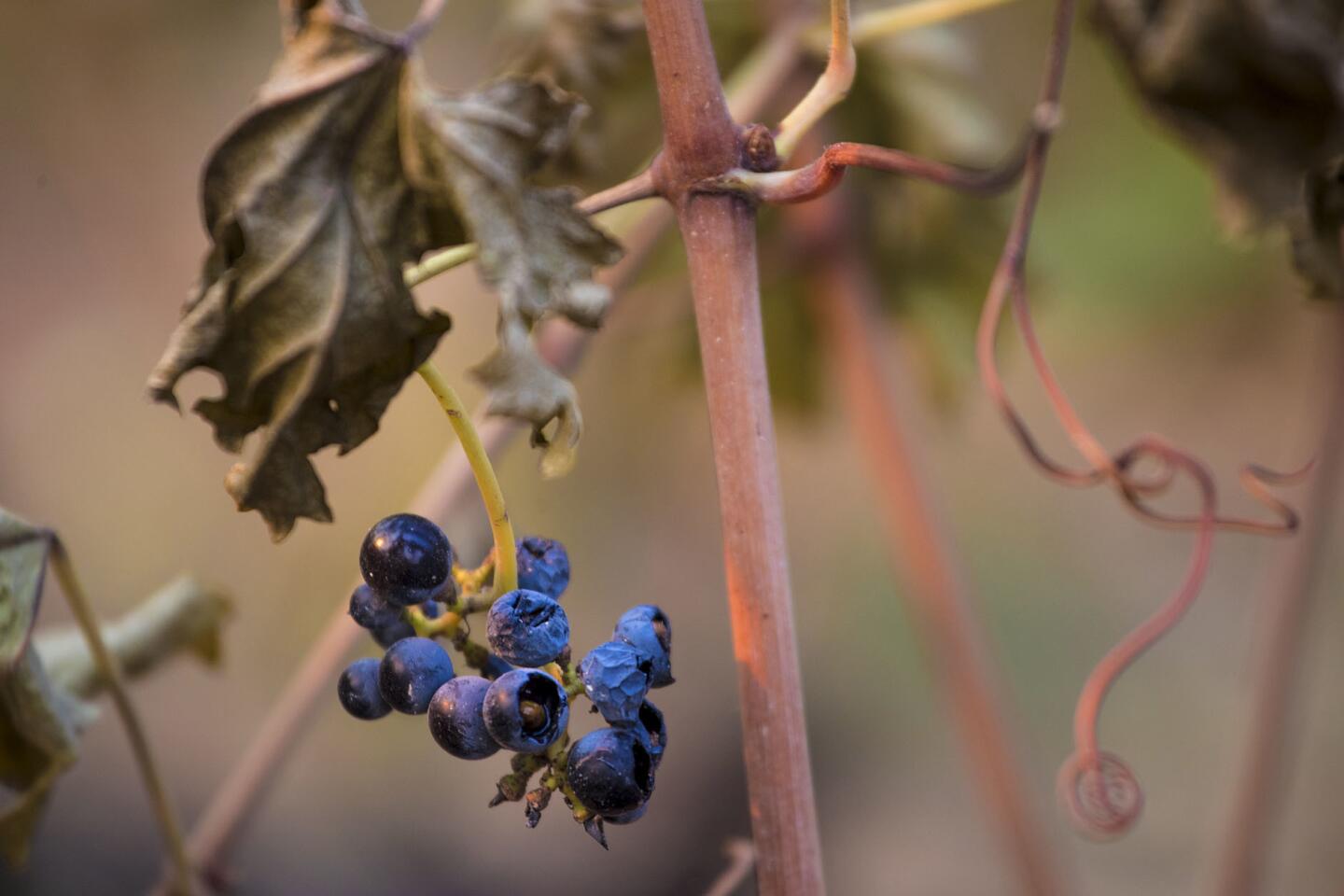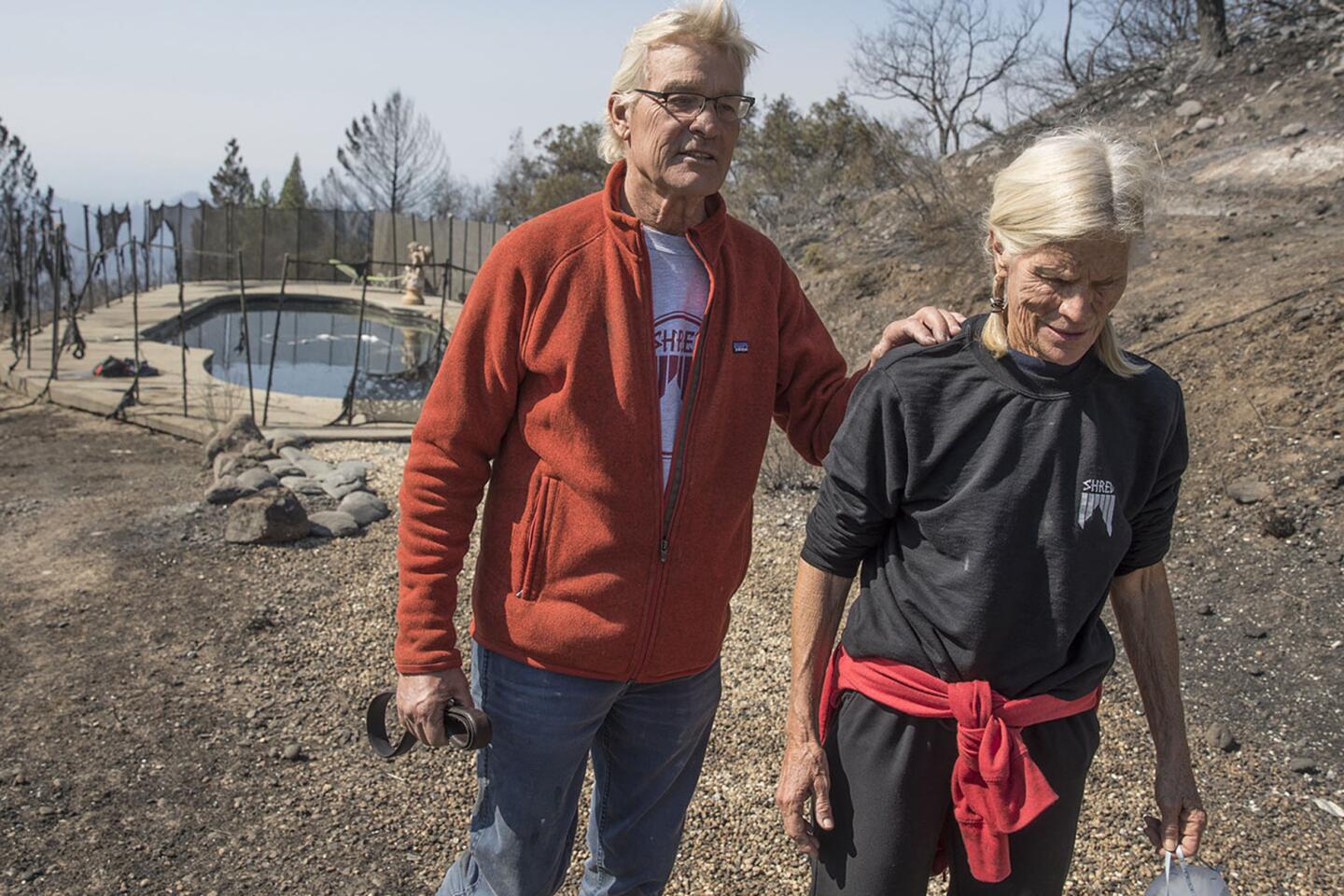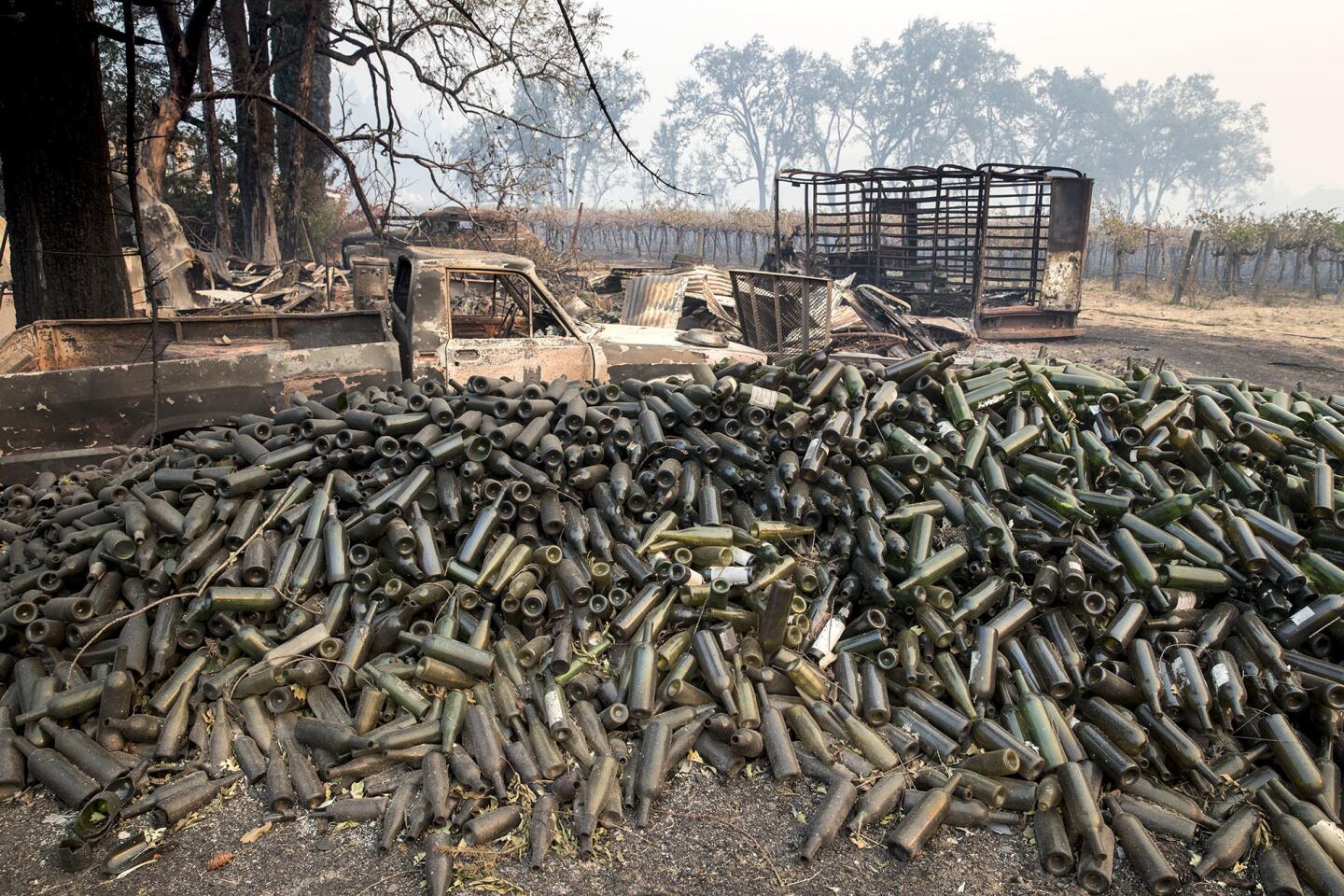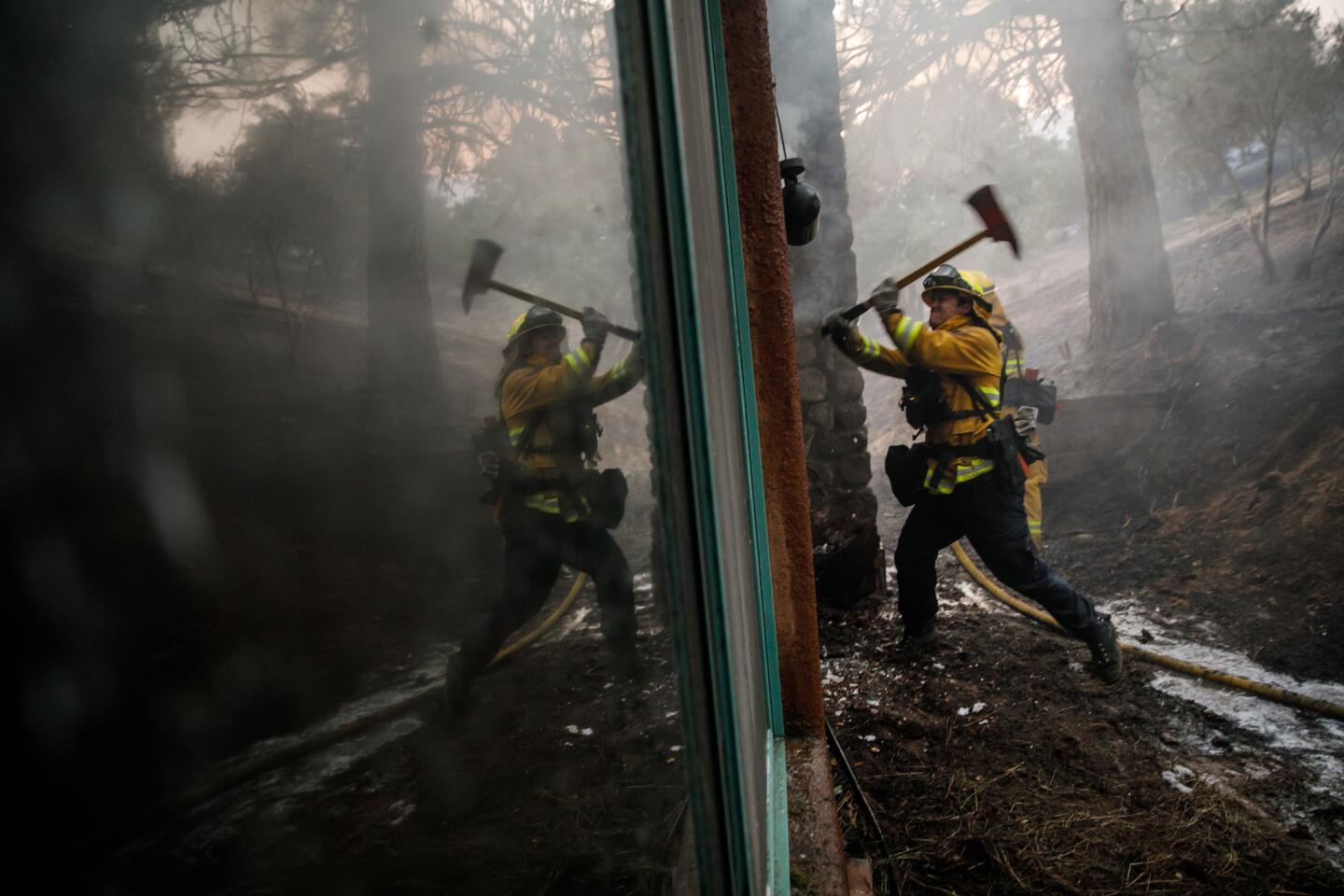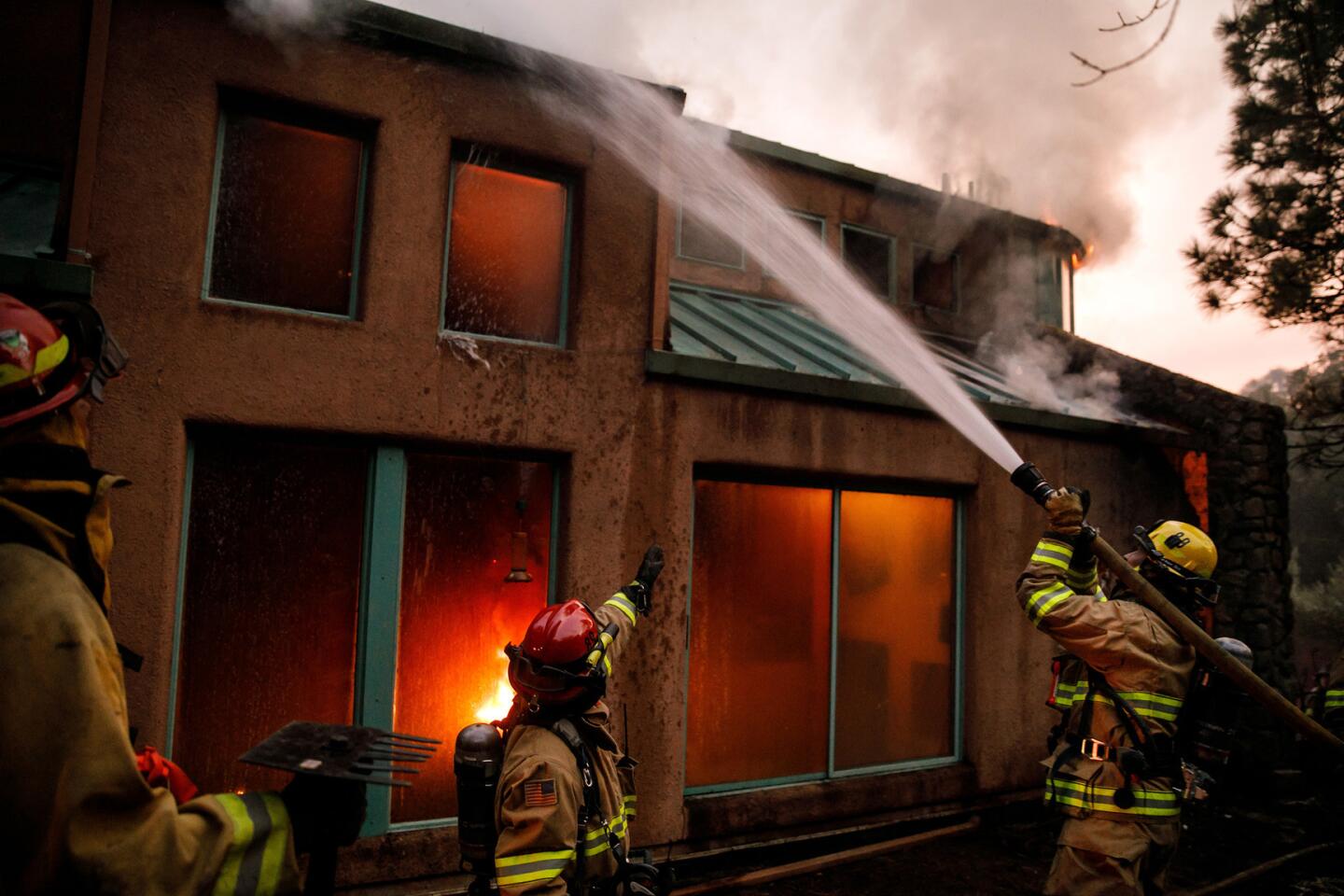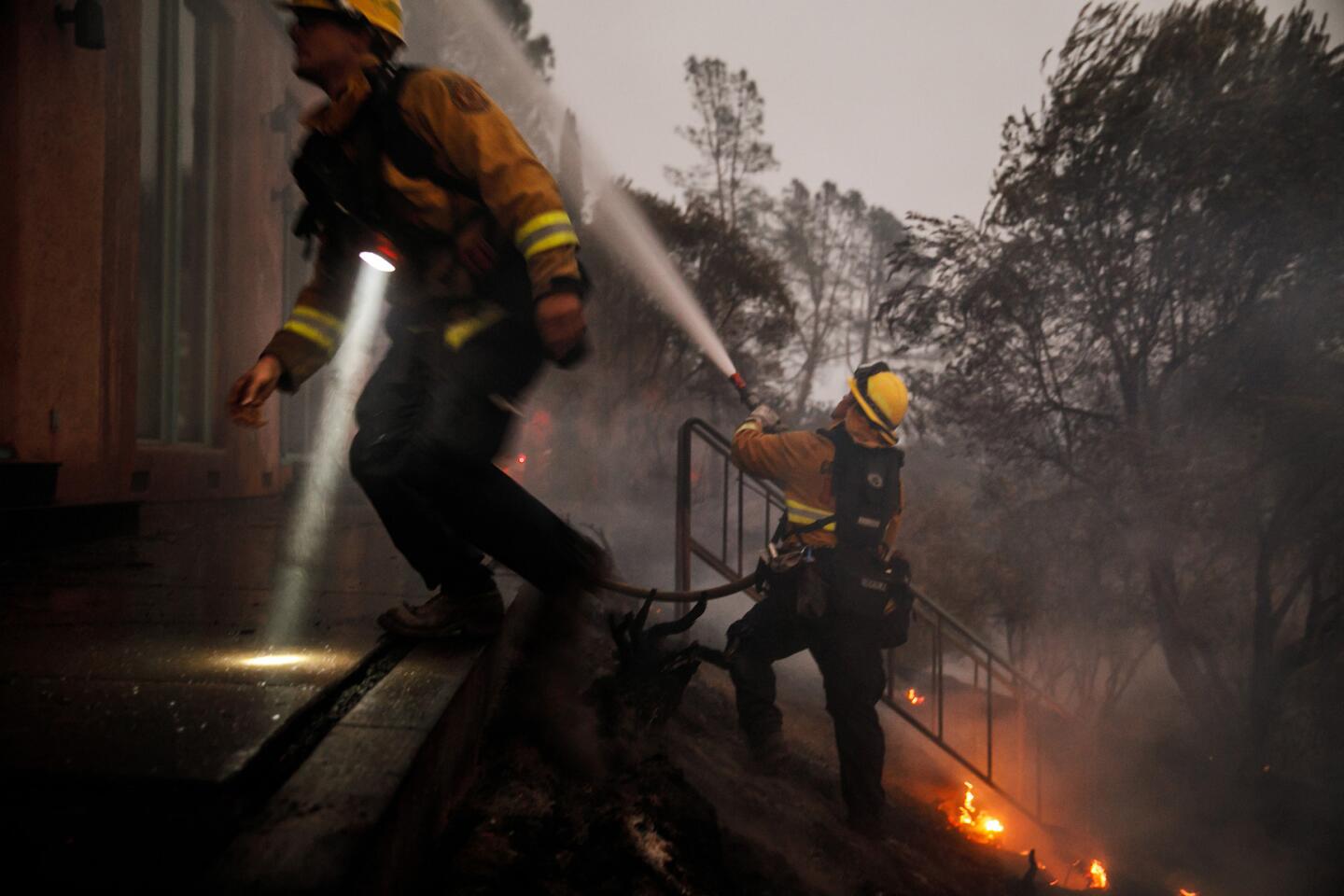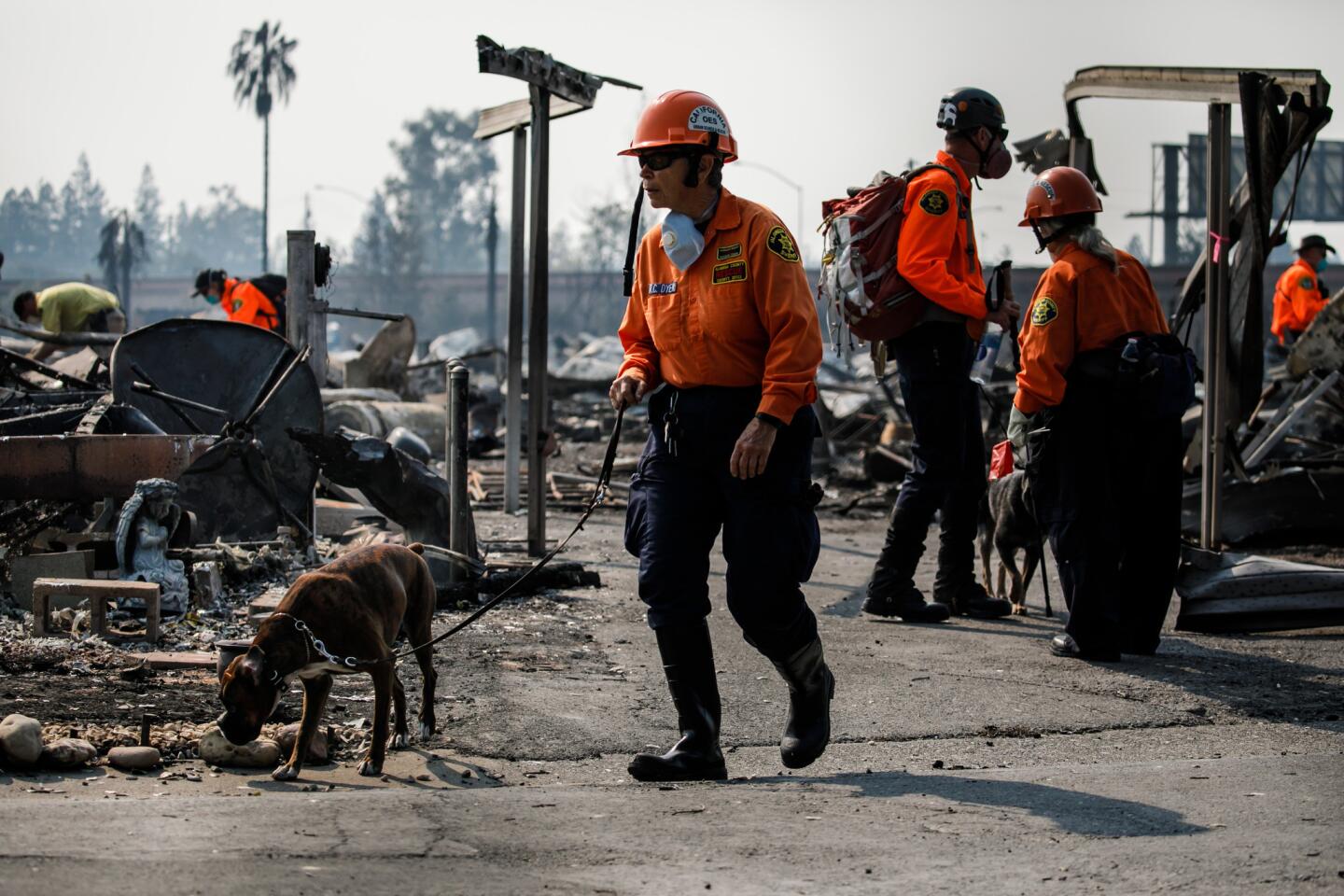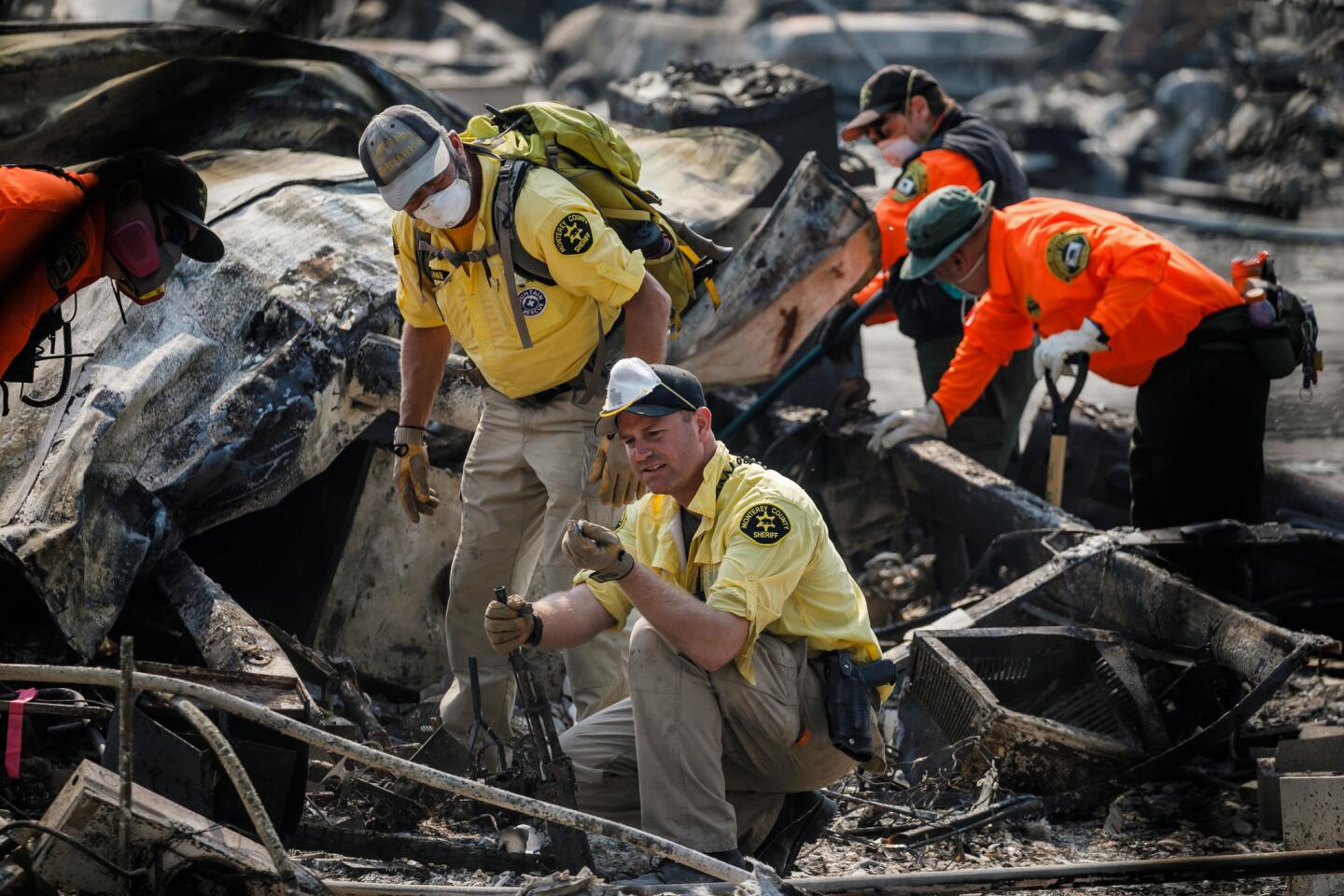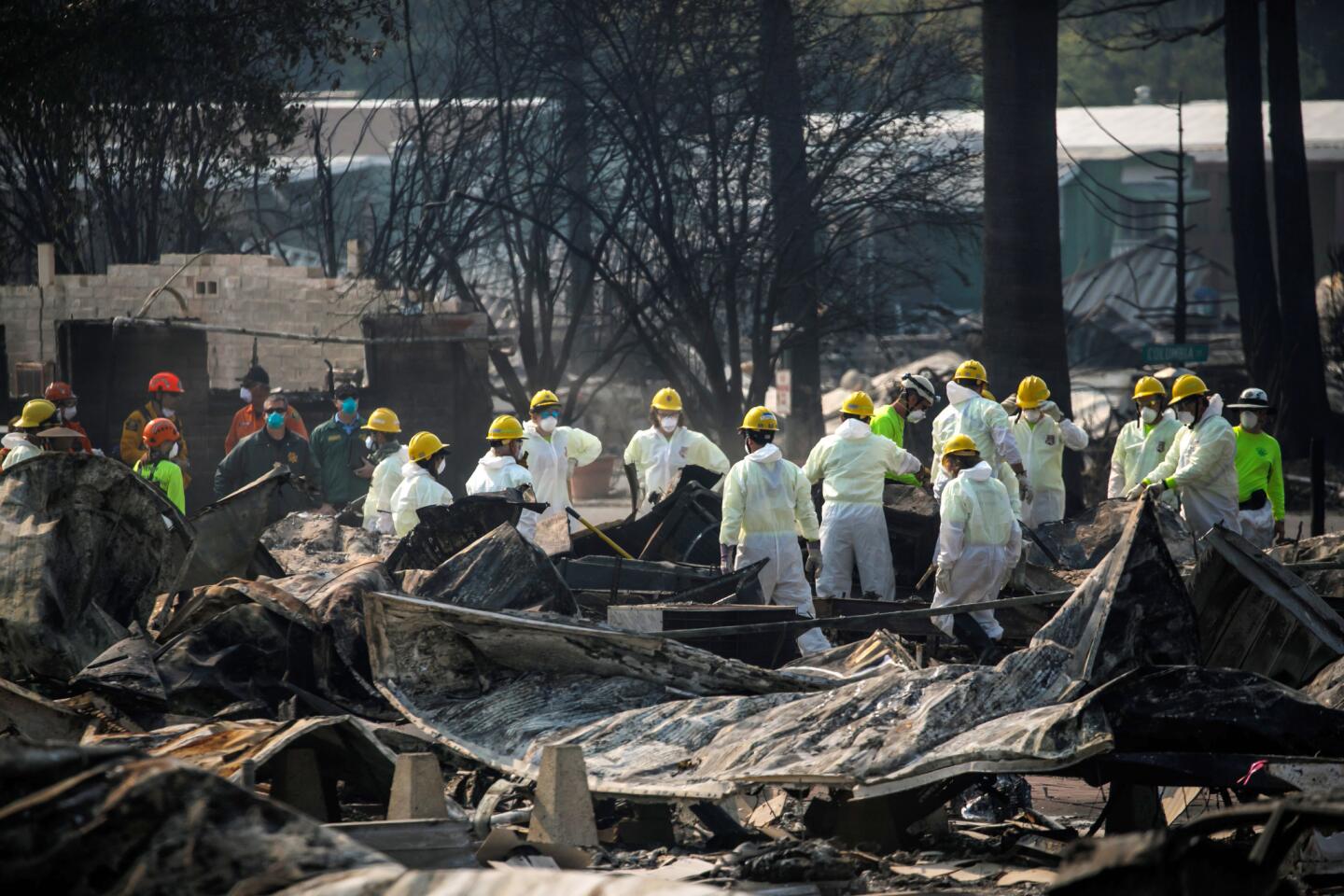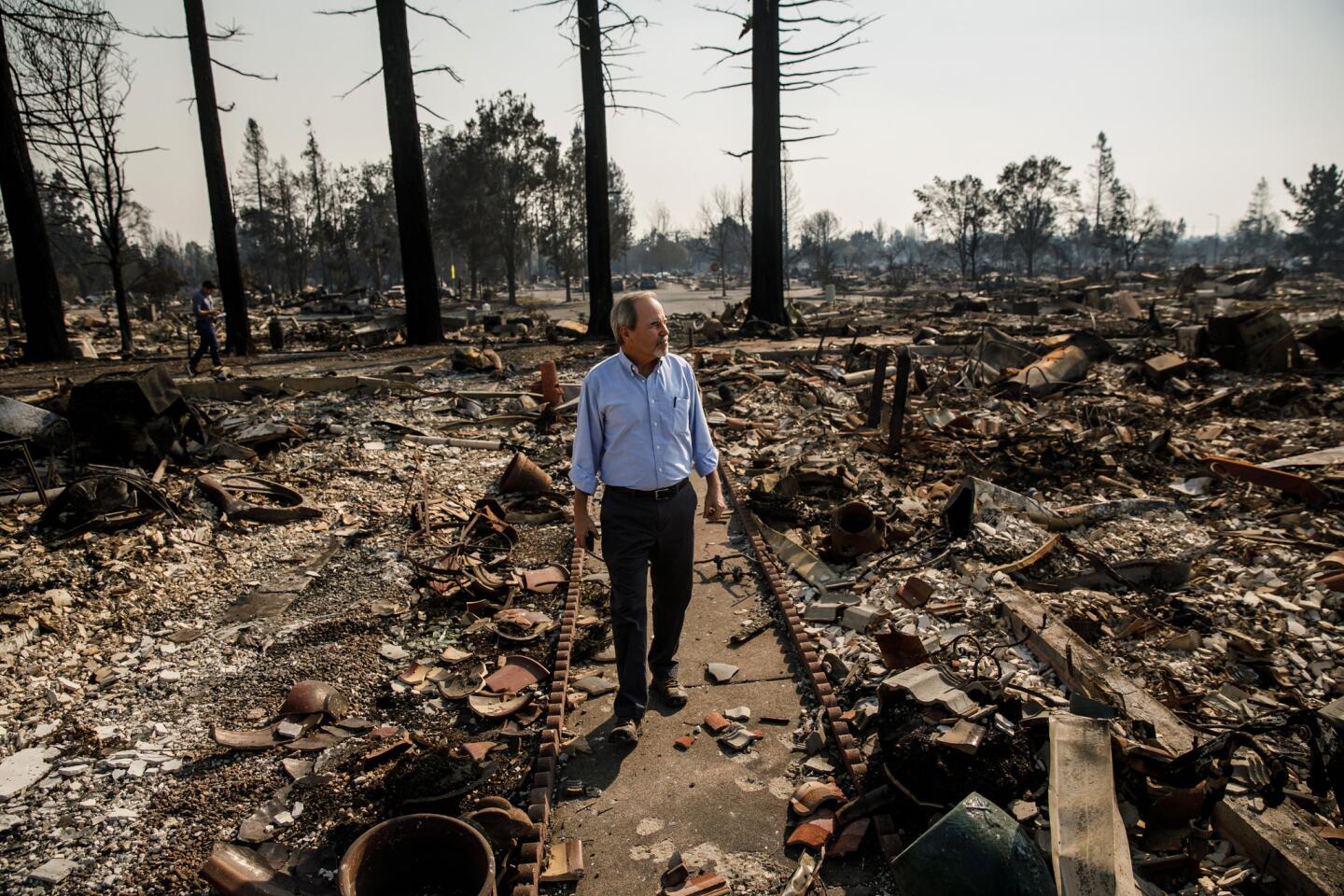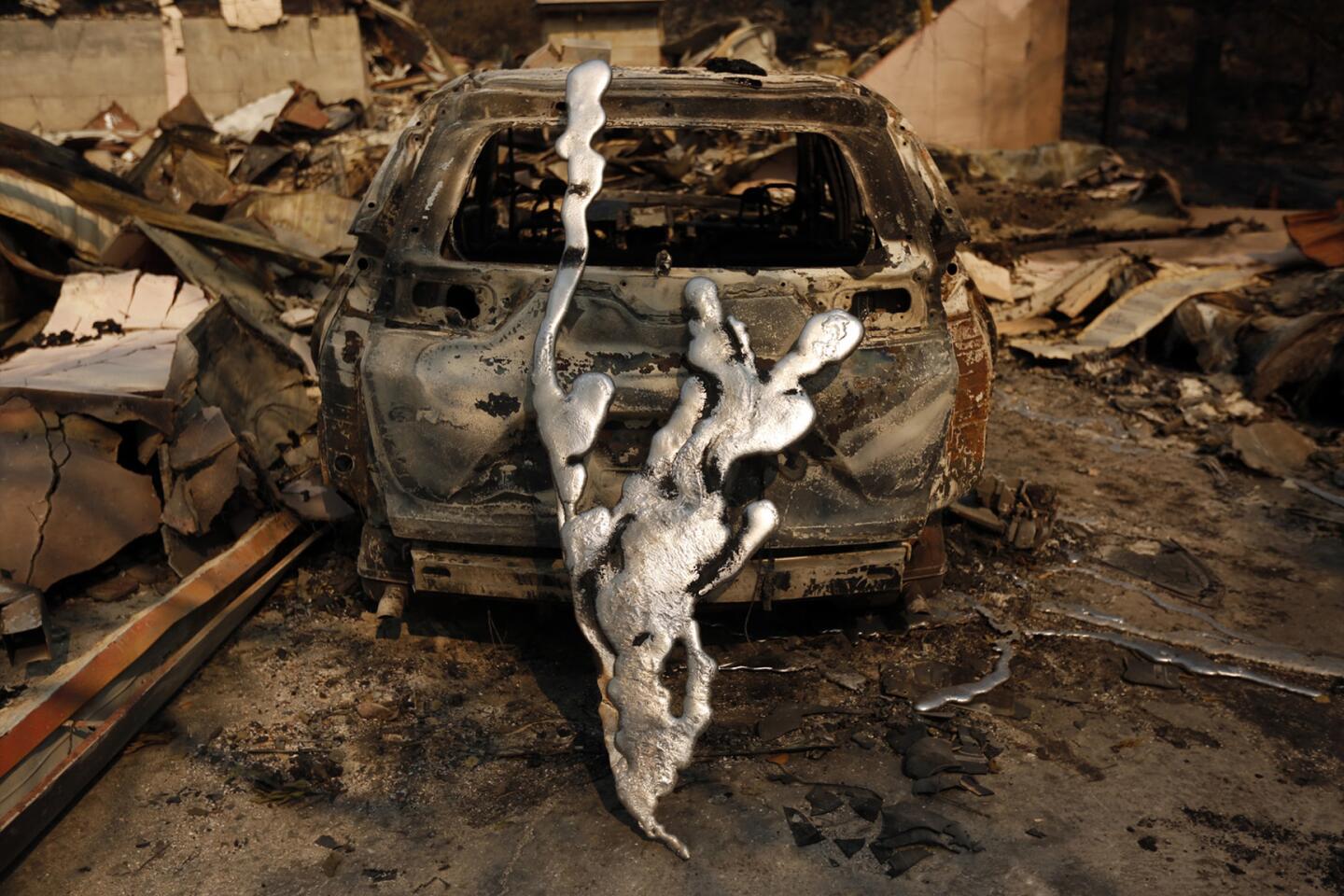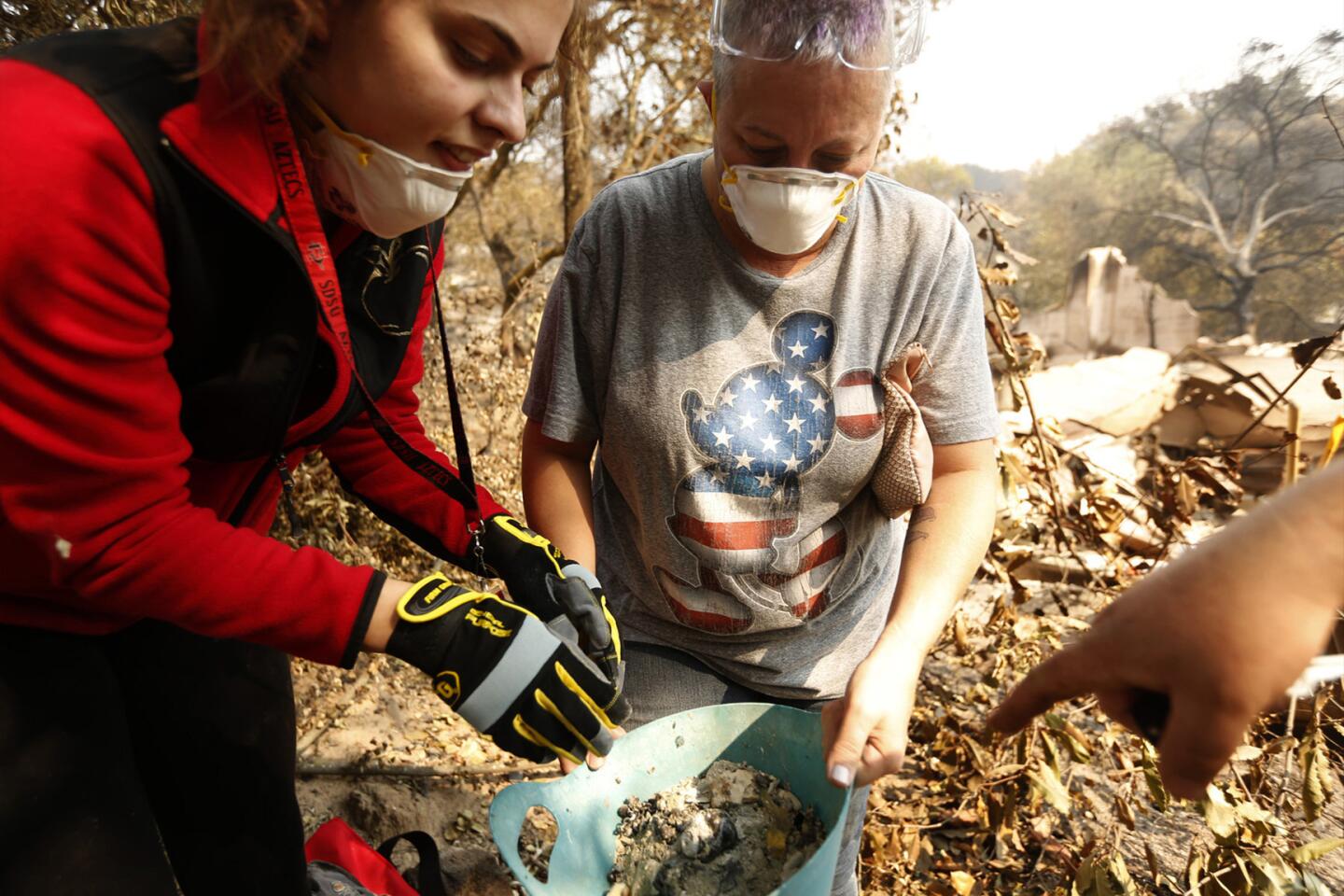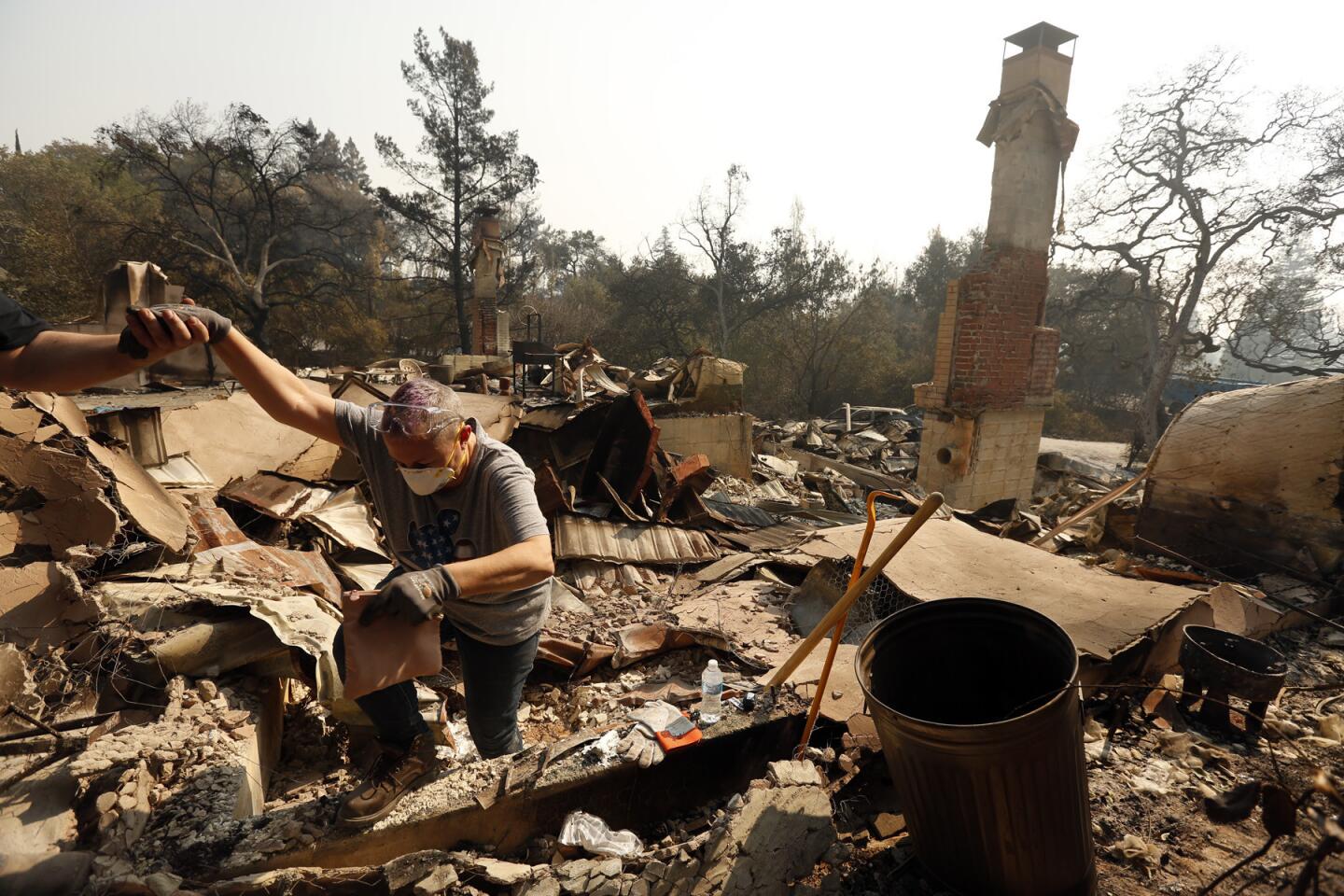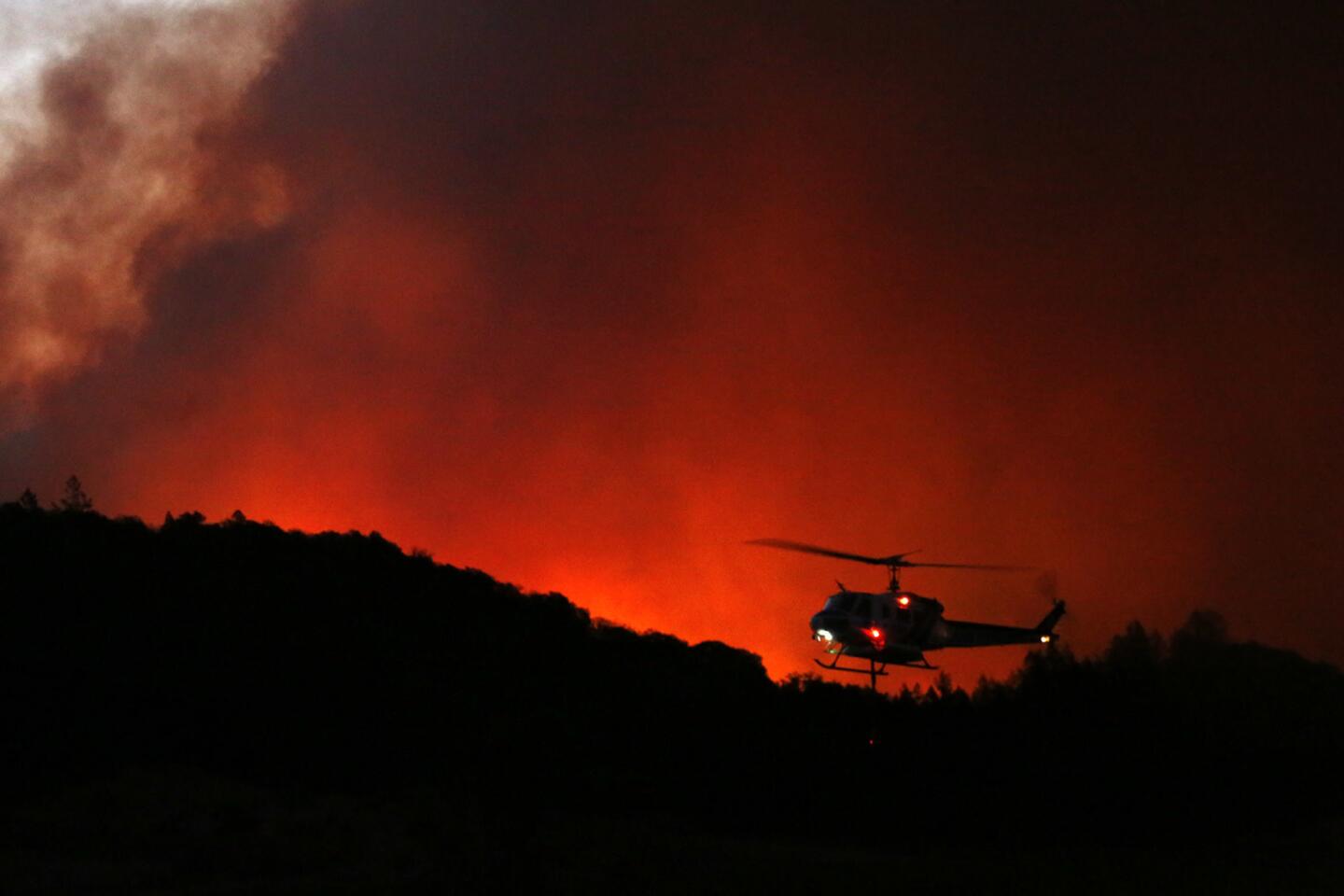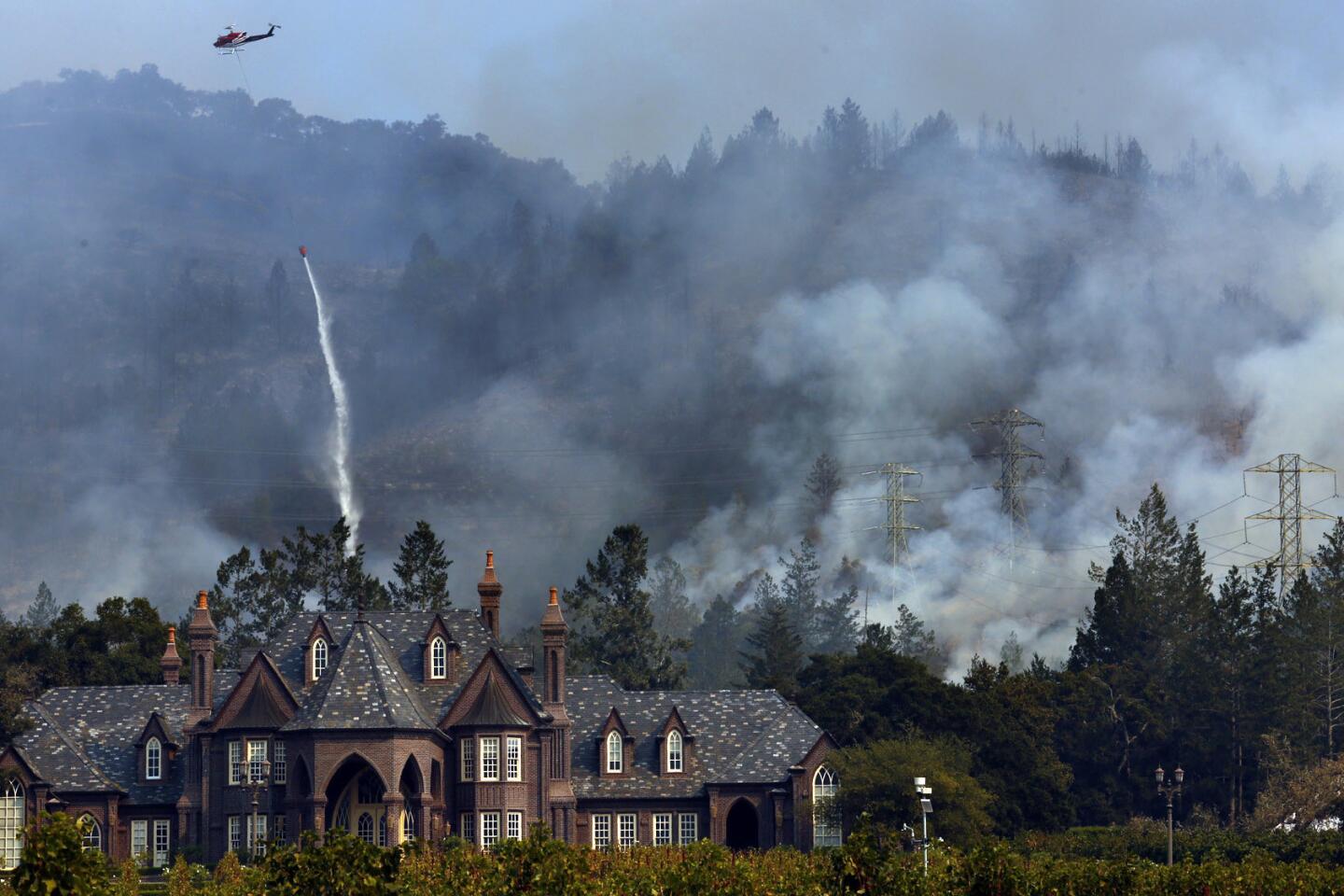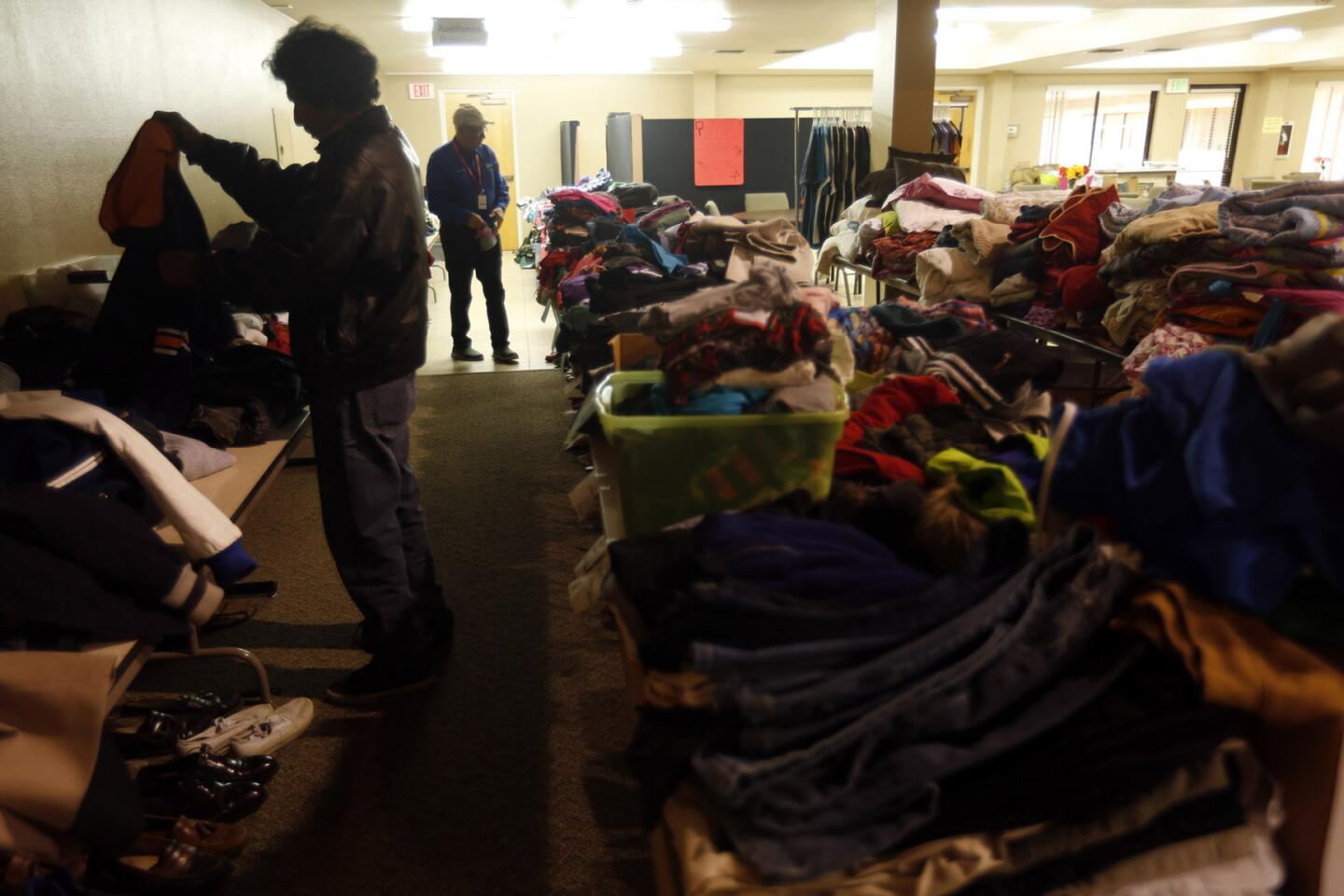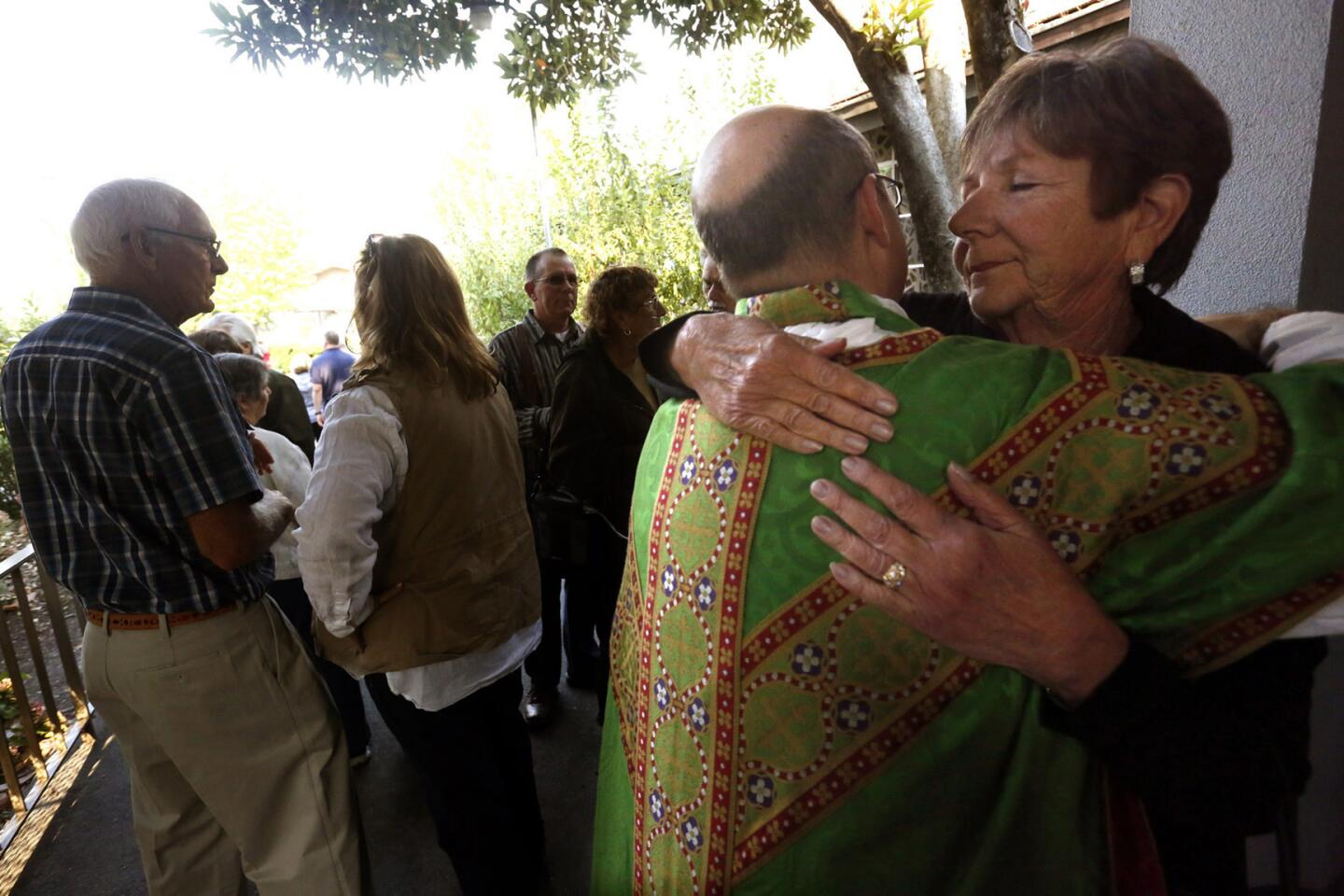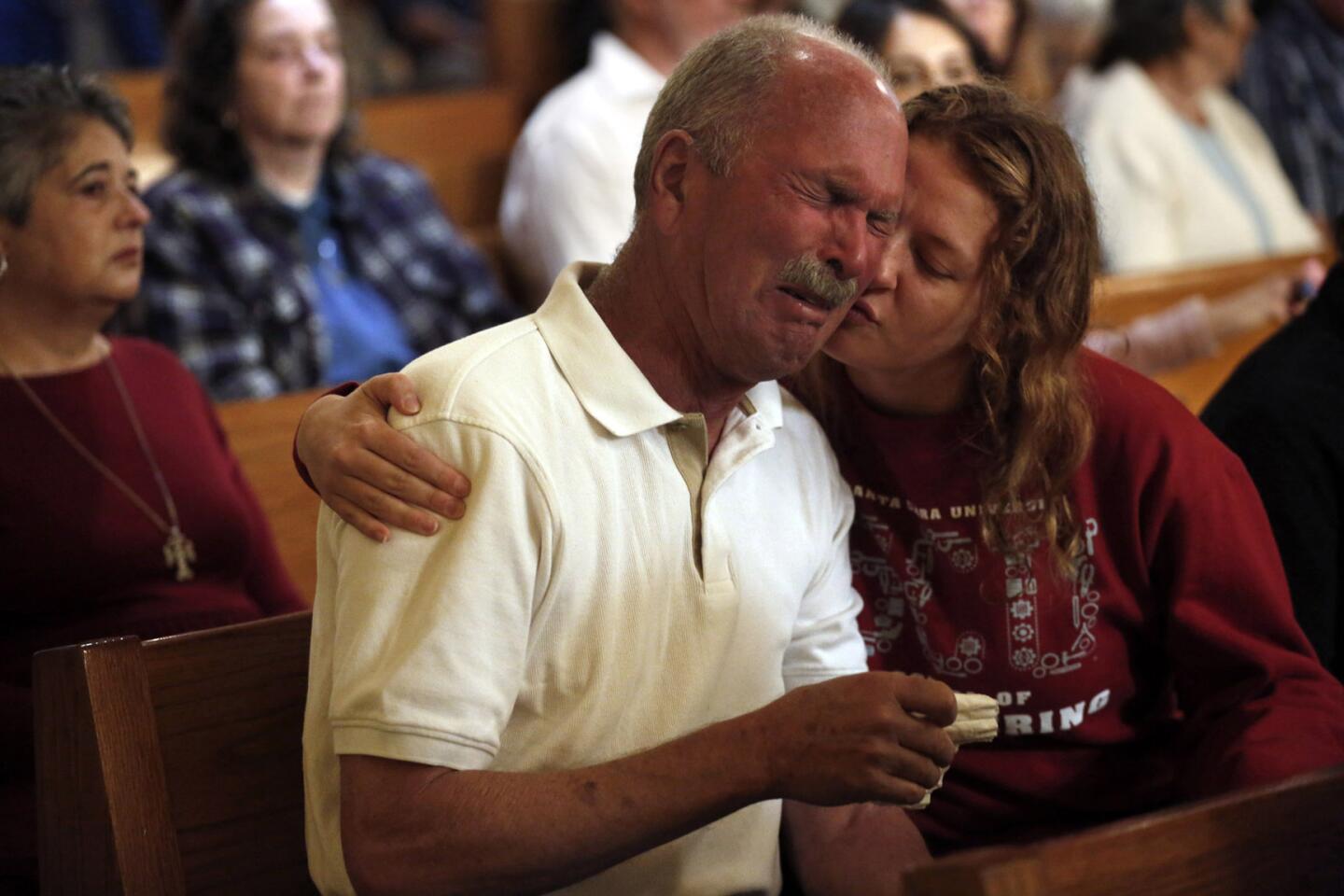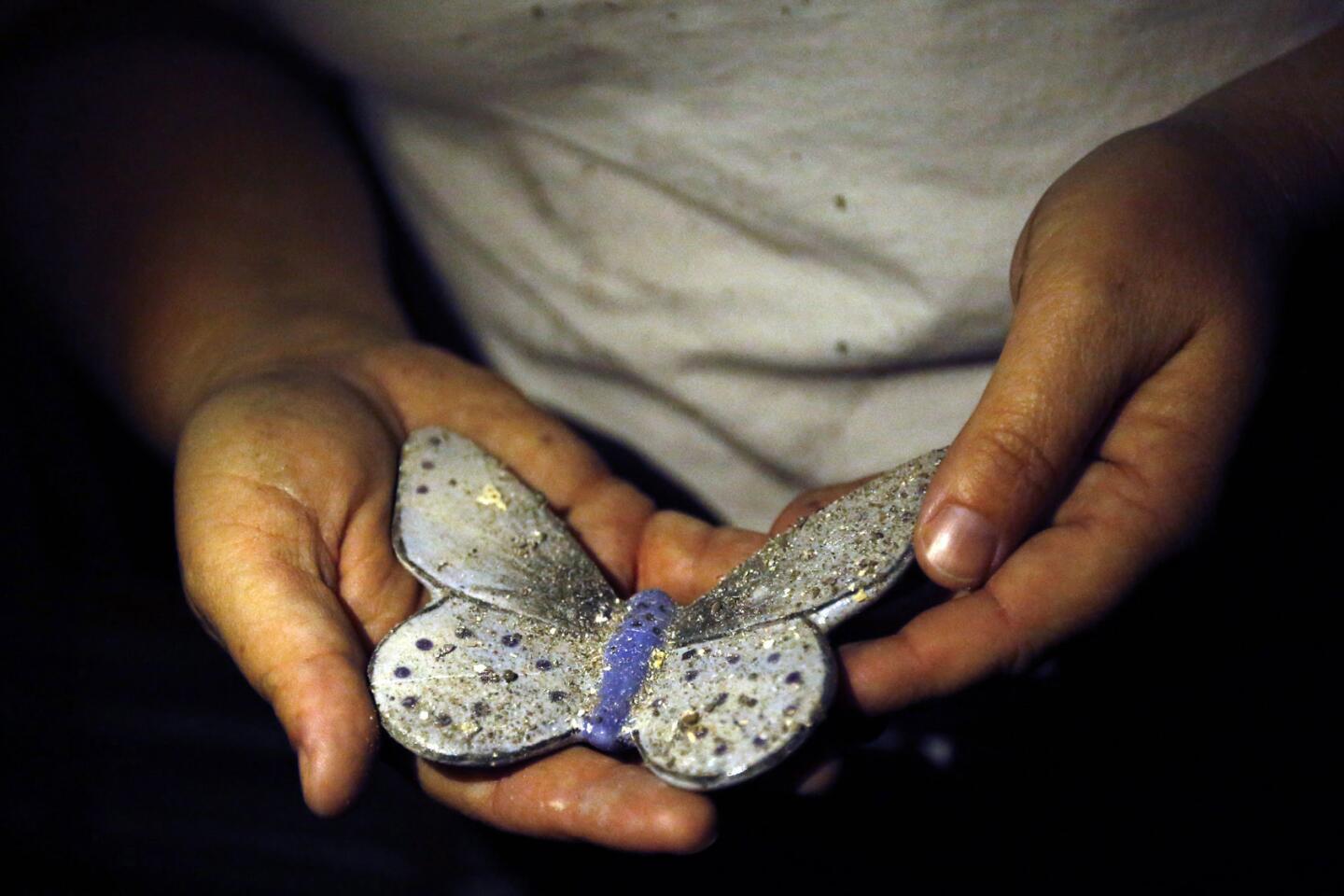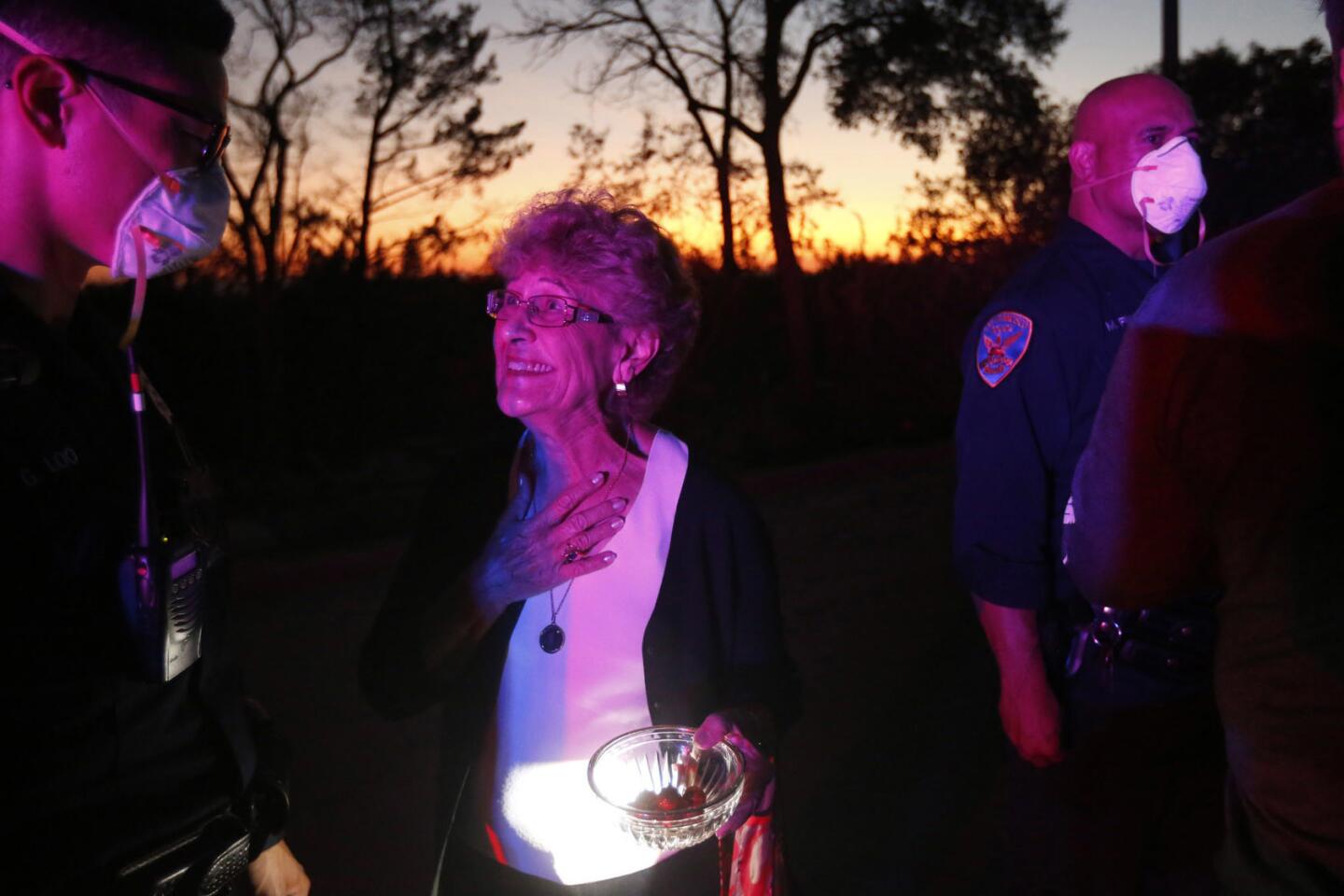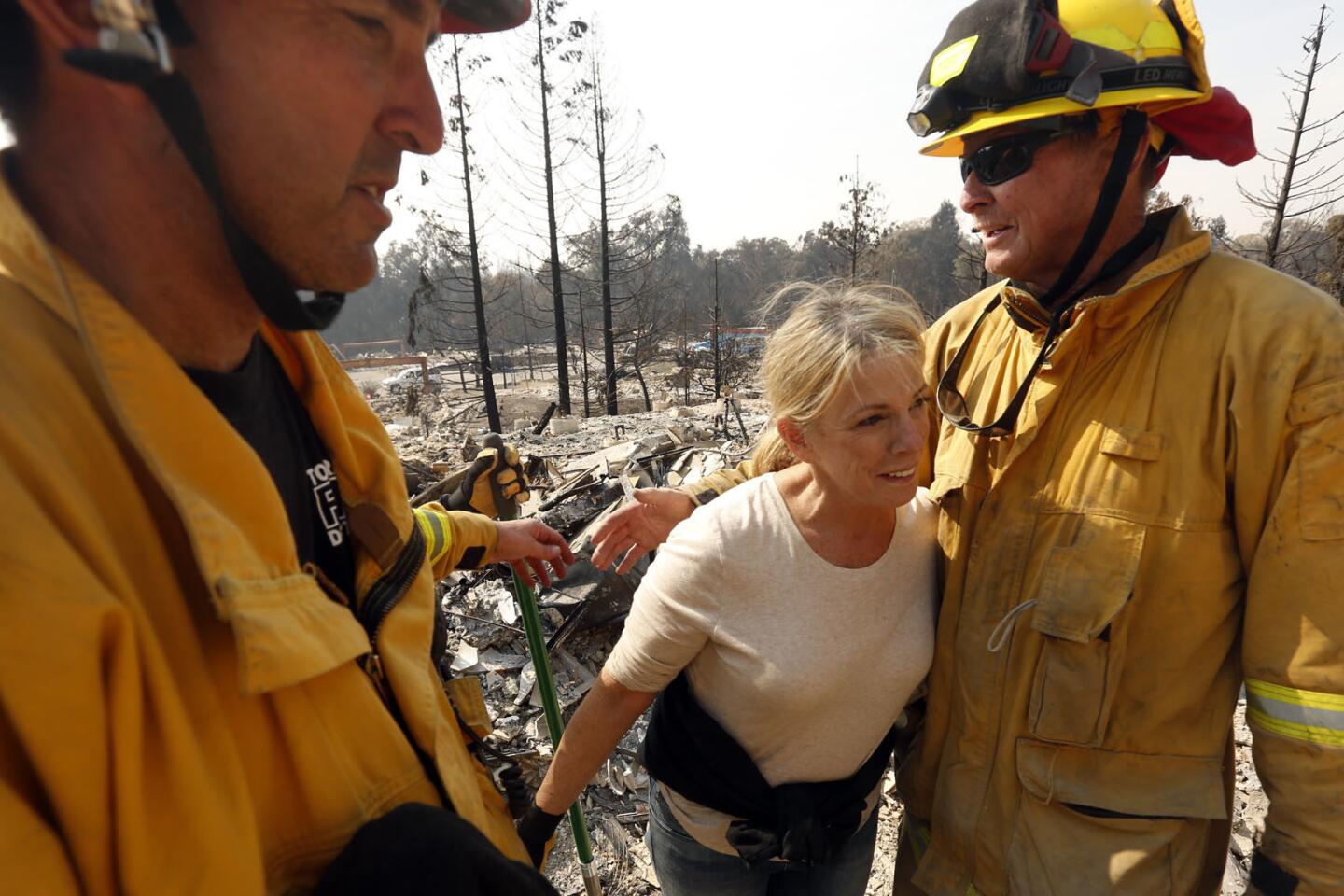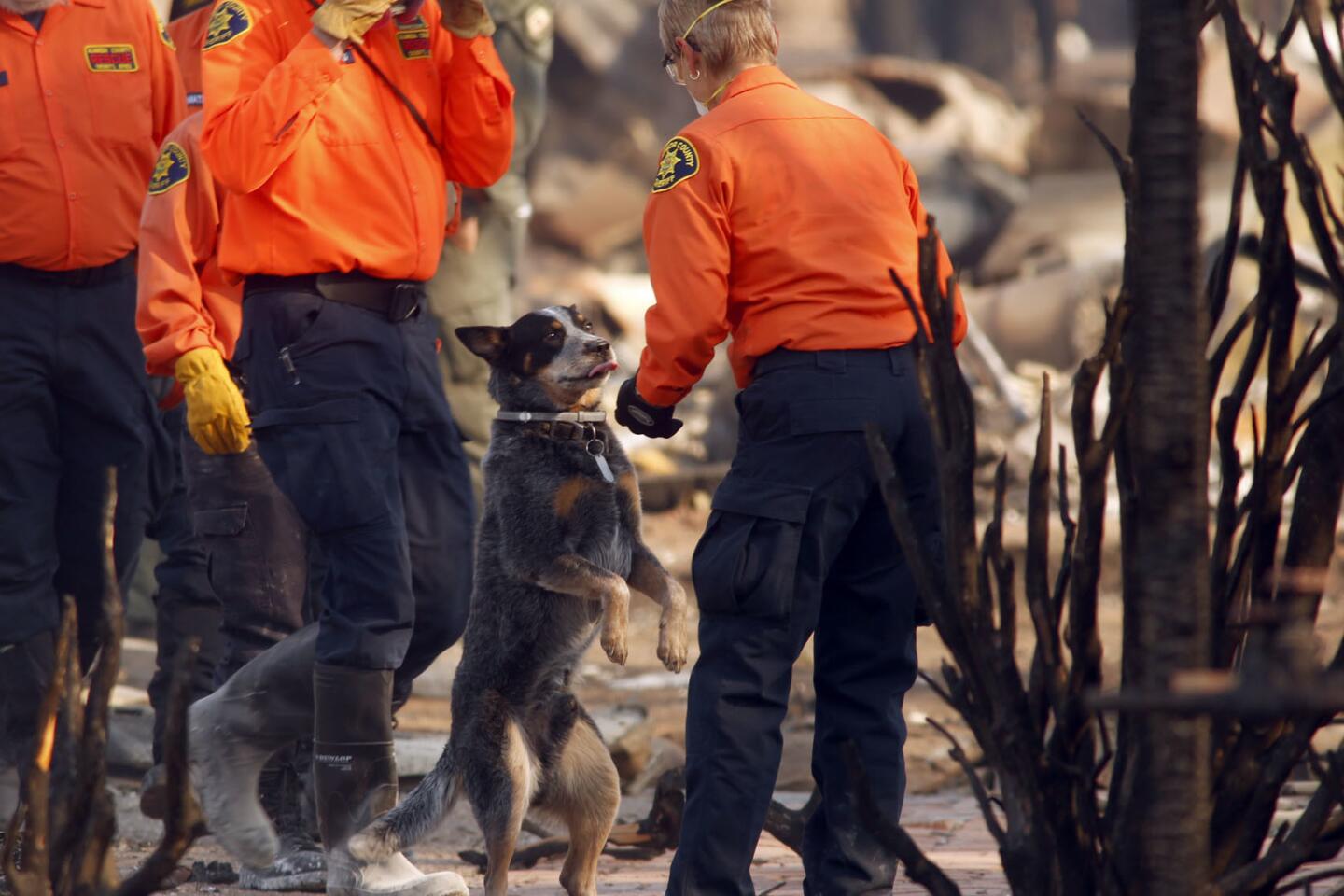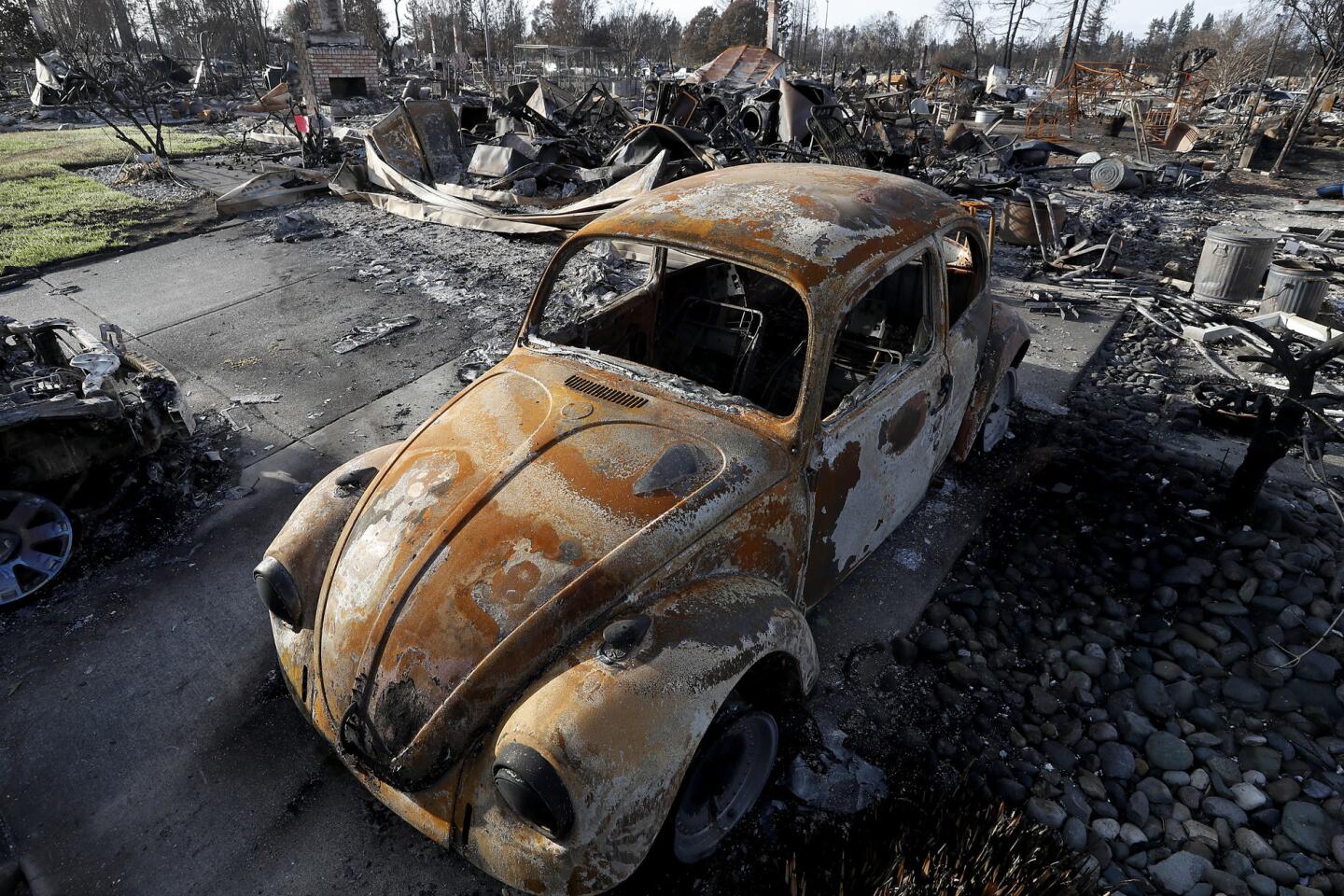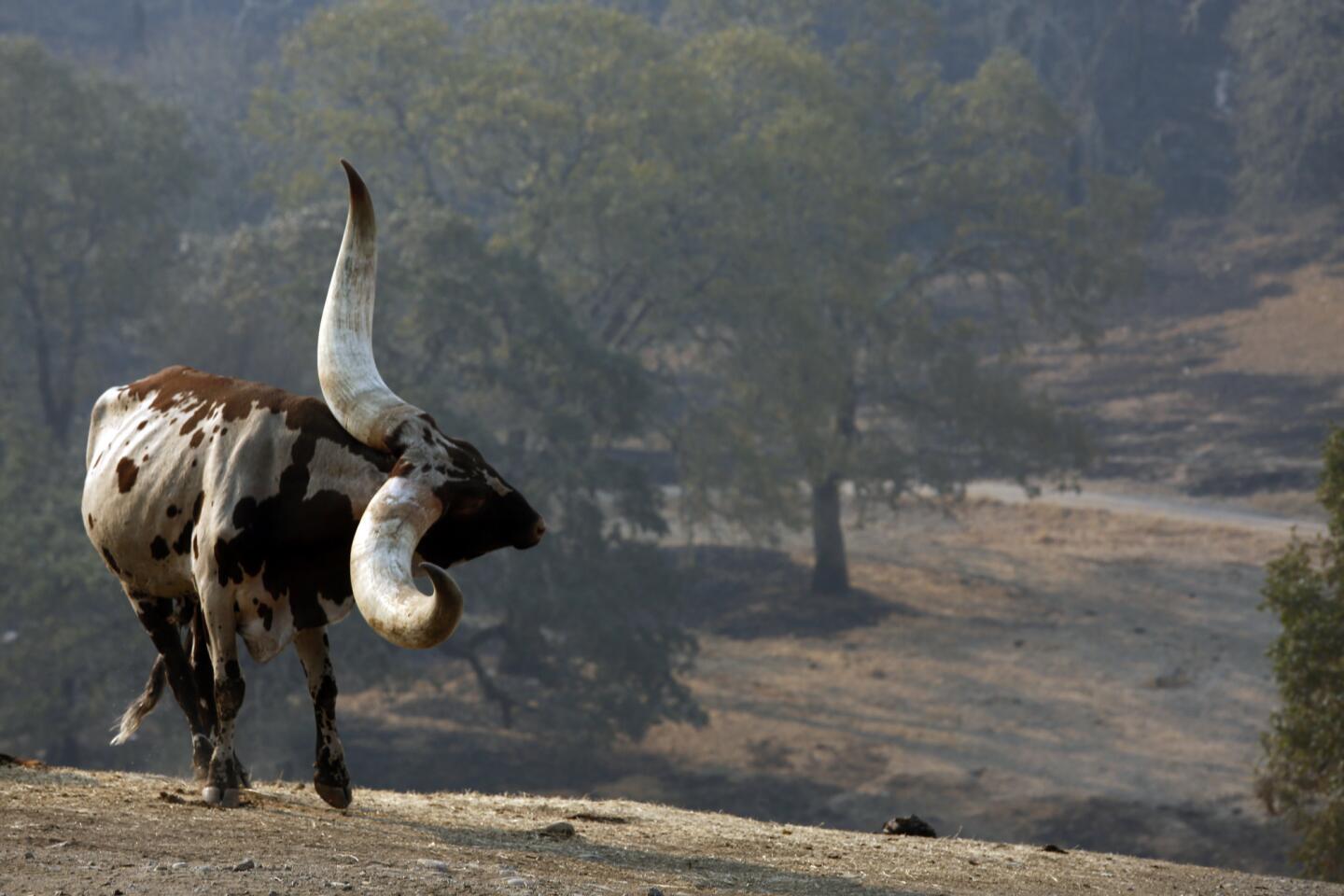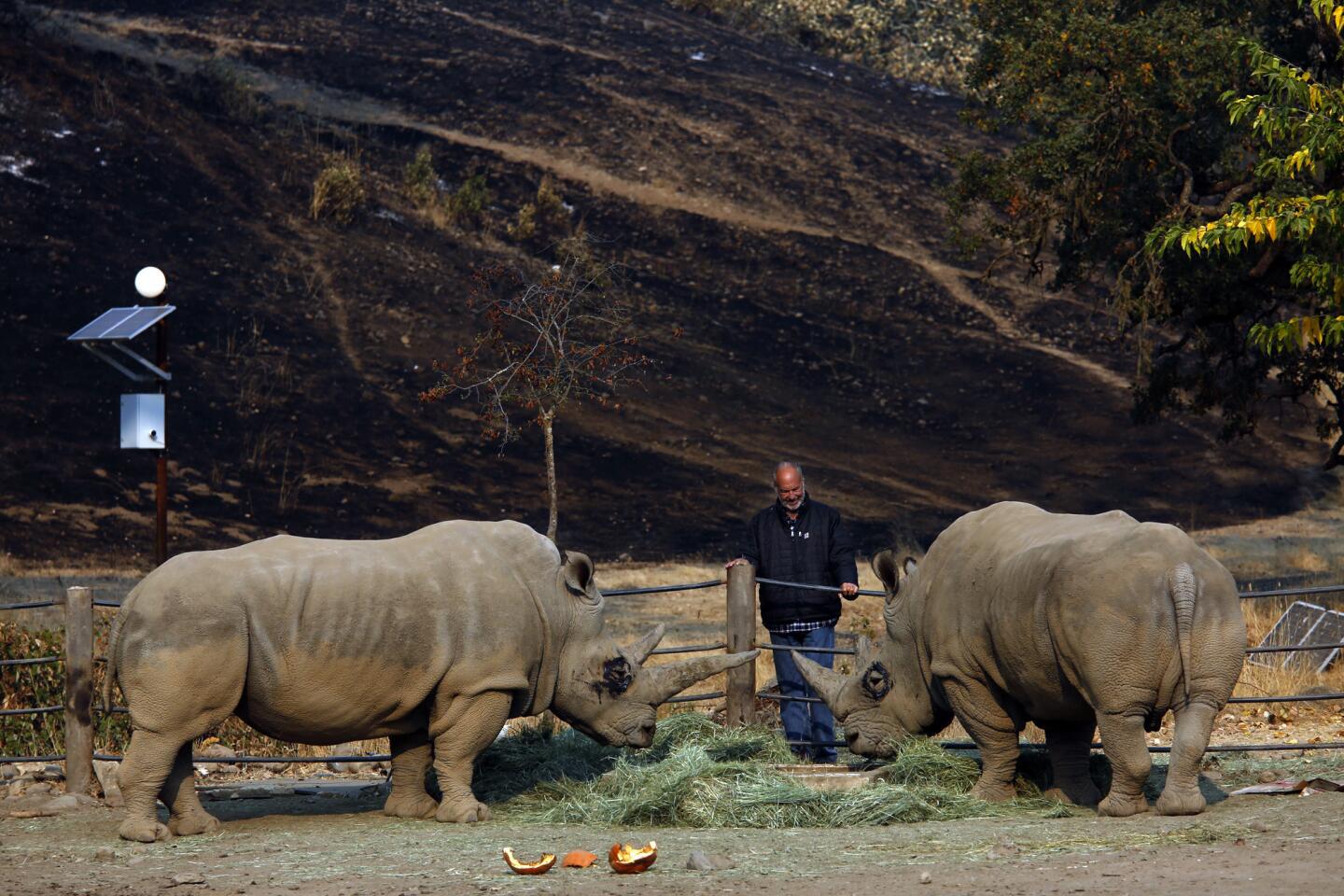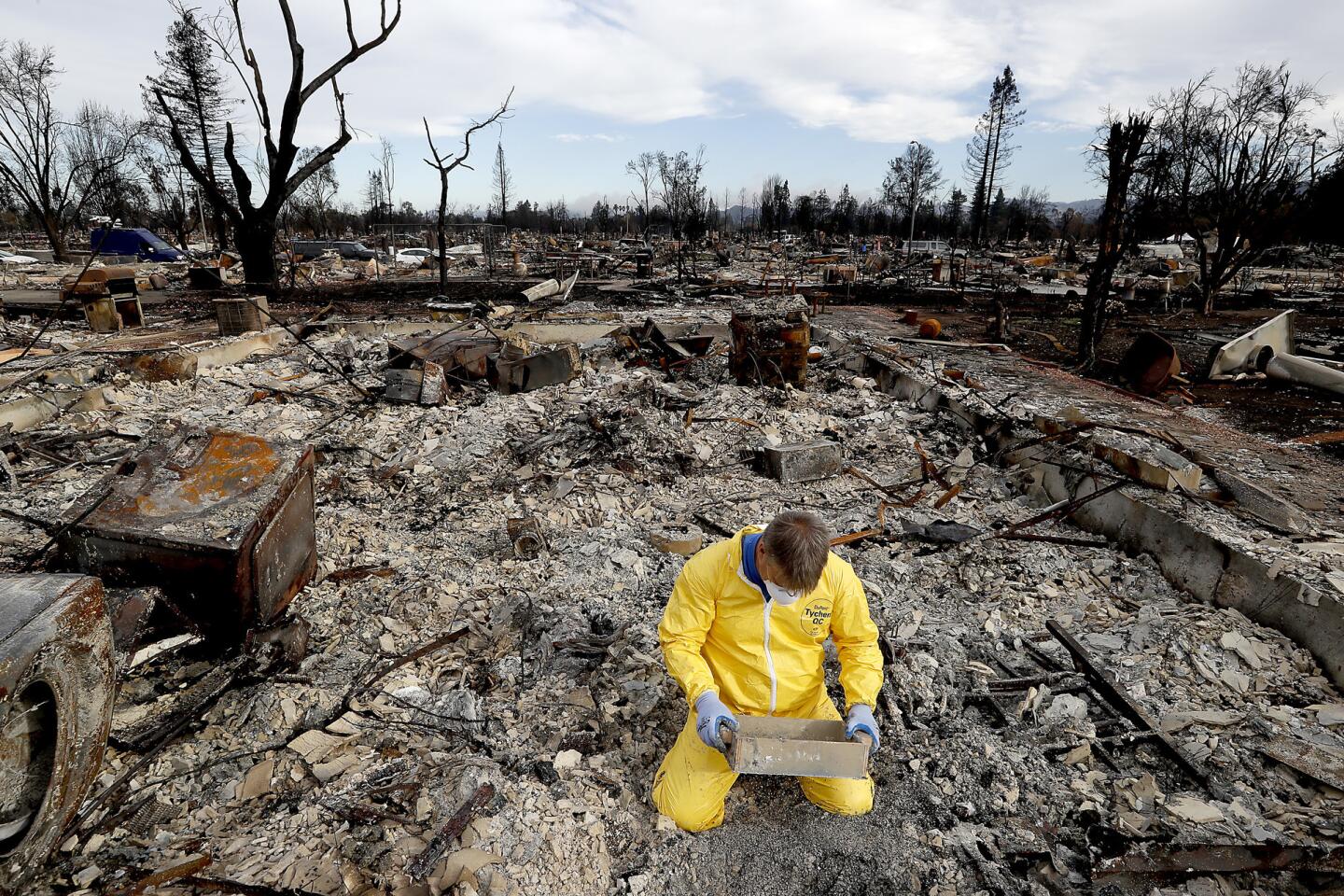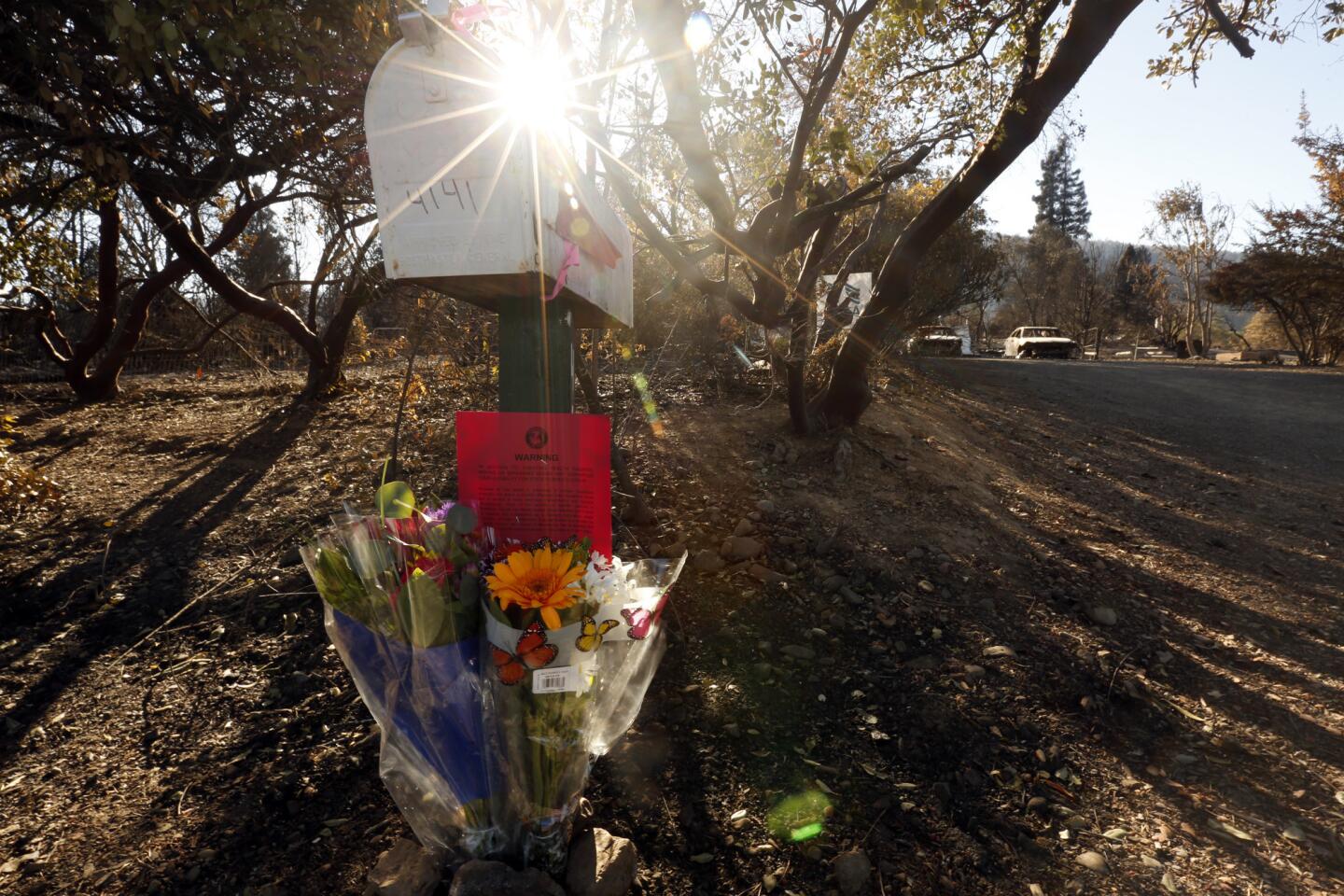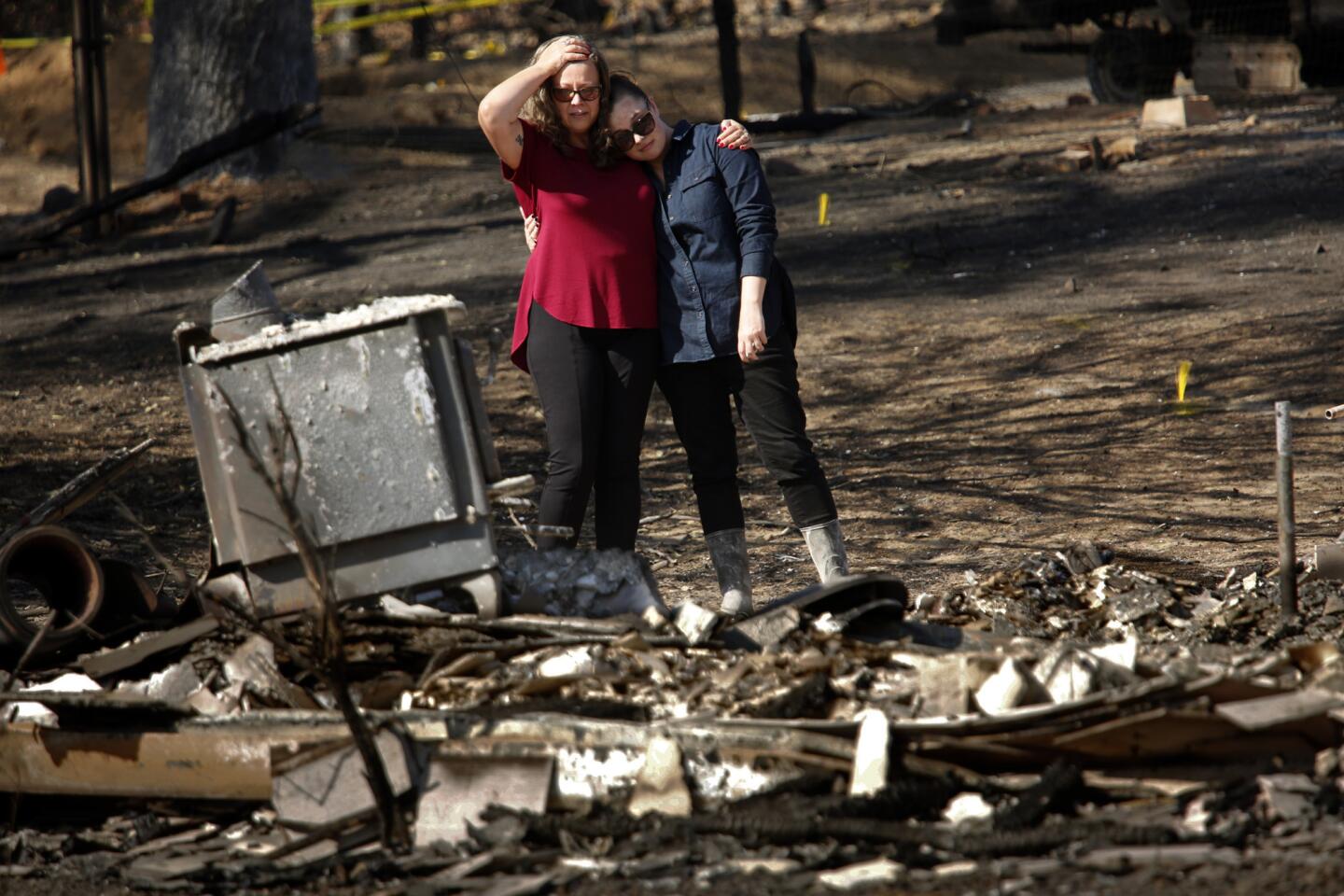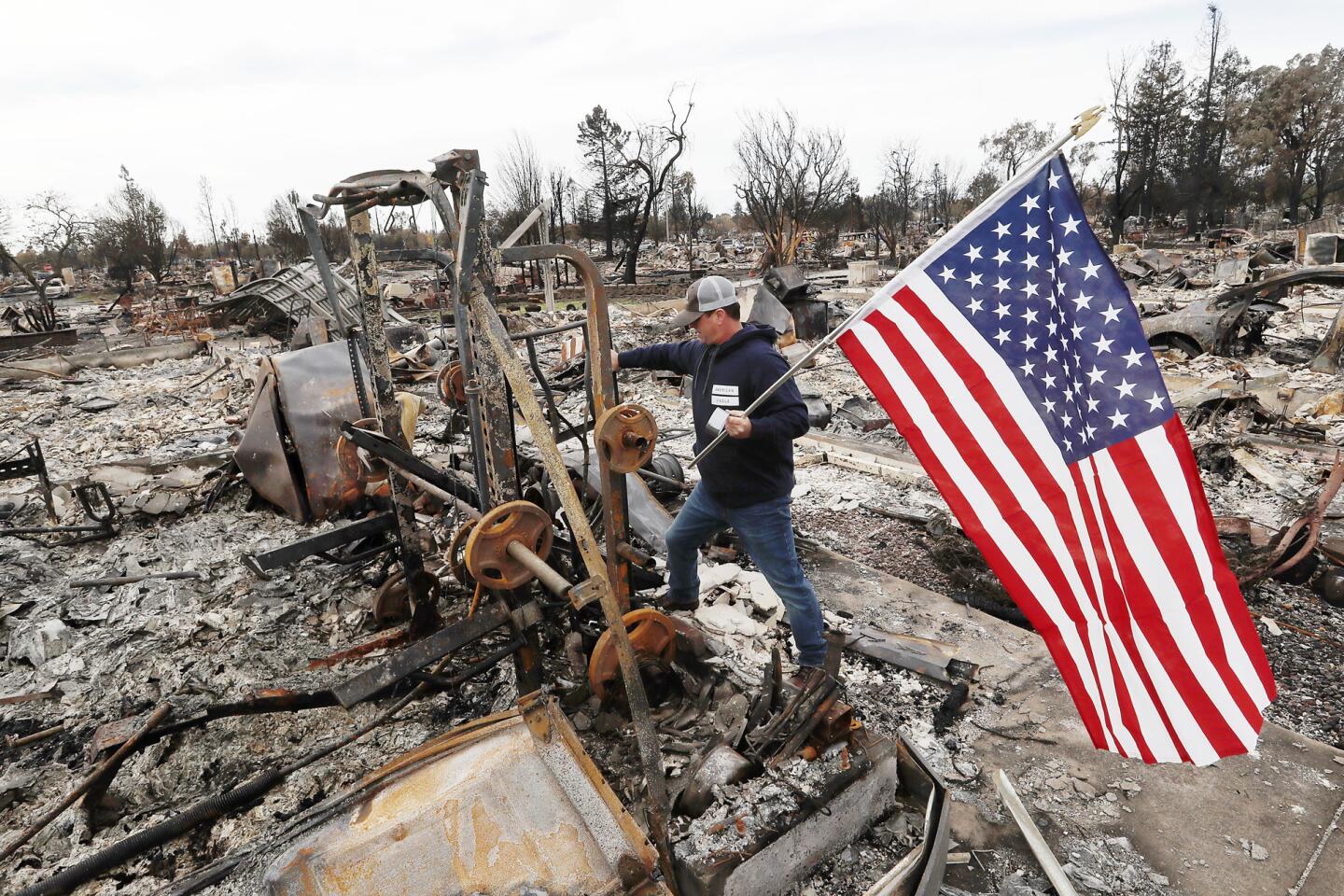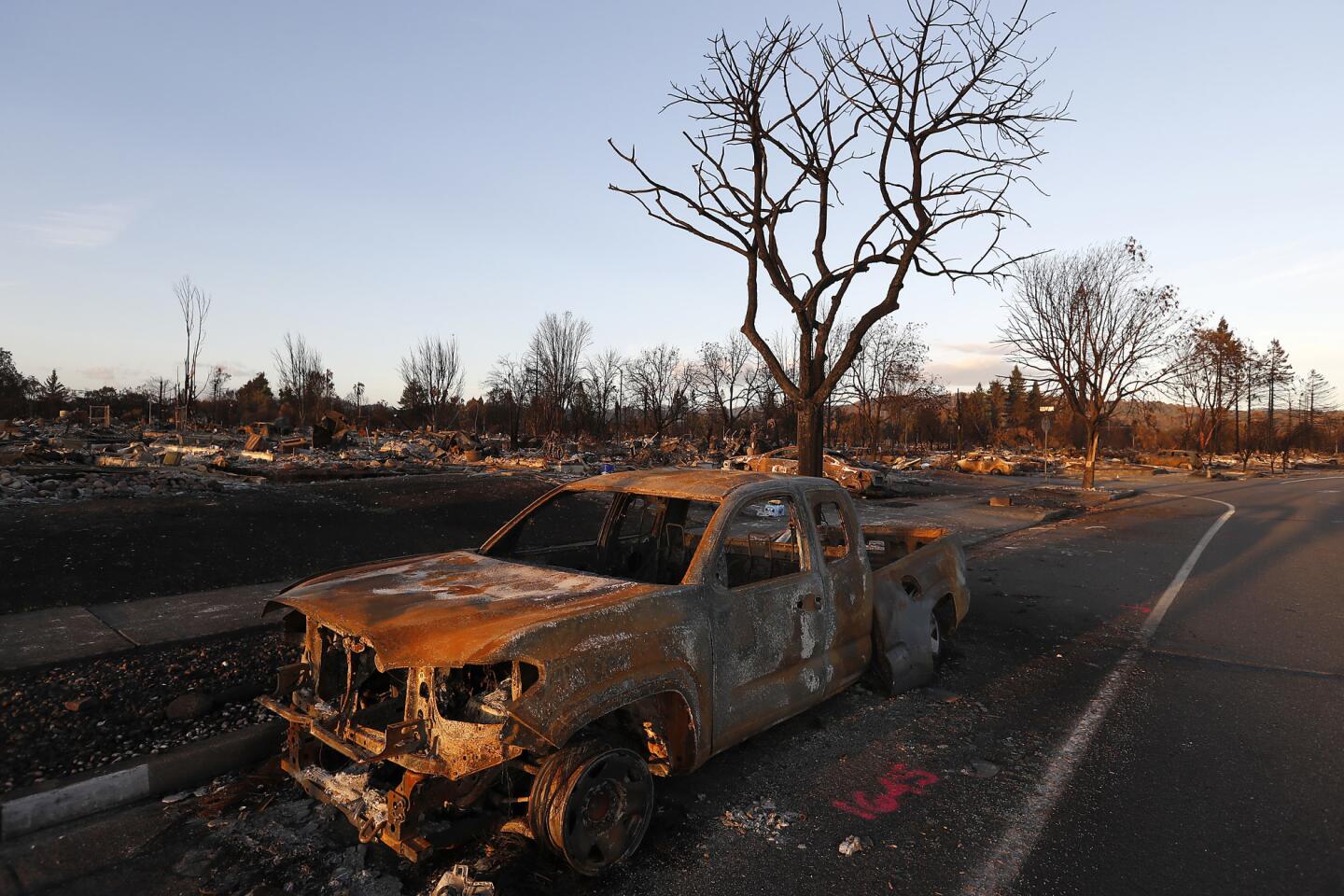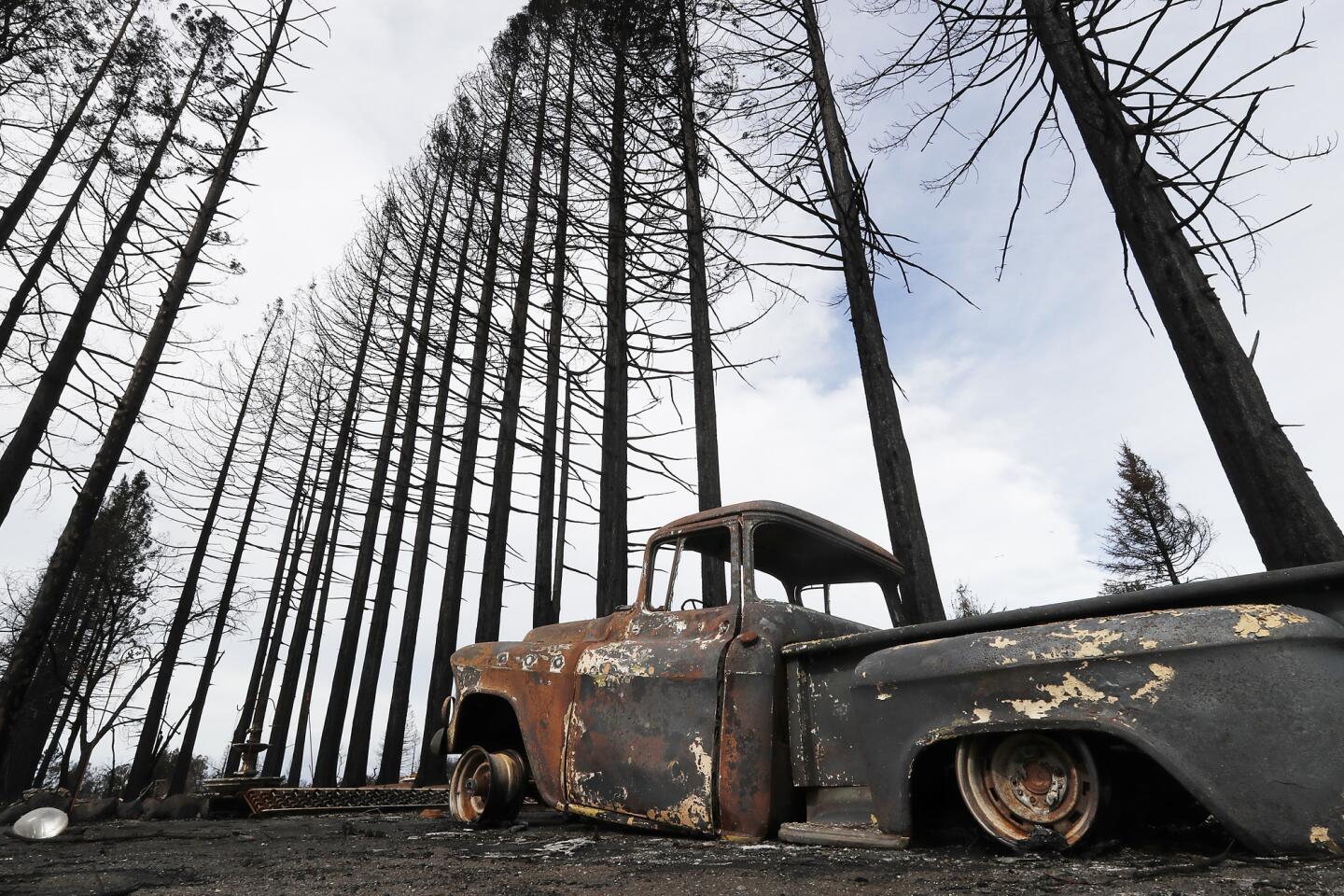Death toll from Northern California fires jumps to at least 34; 5,700 structures destroyed
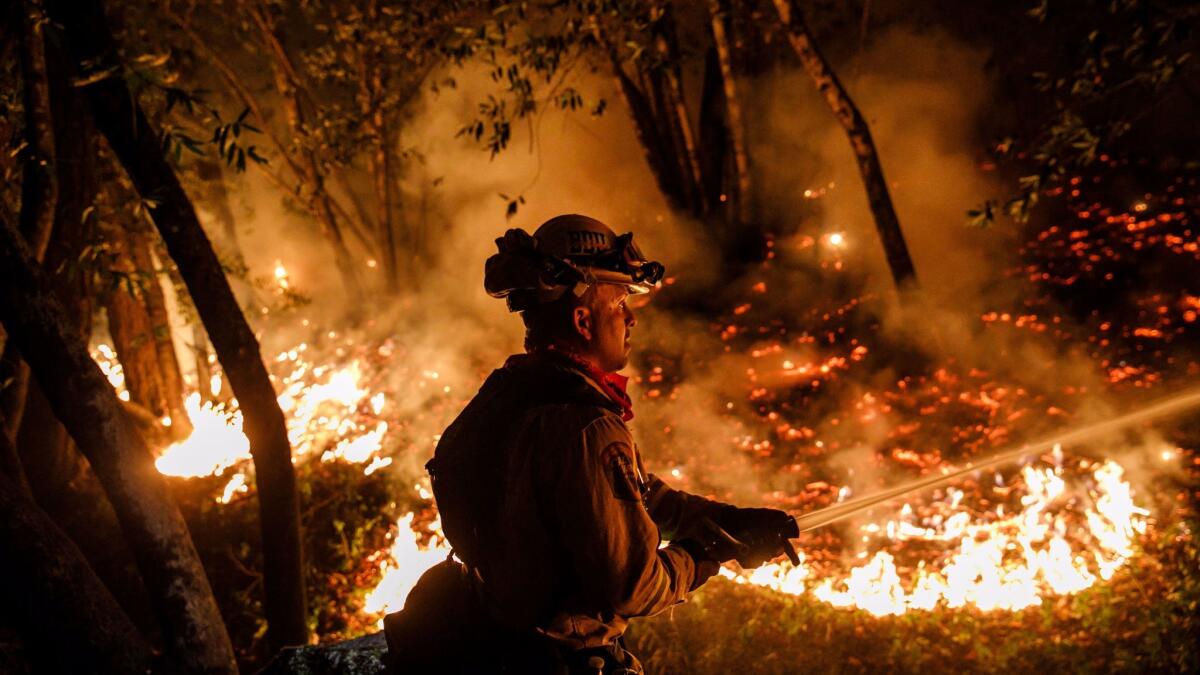
- Share via
Reporting from Santa Rosa, Calif. — The grim toll from the Northern California wildfires continued to rise Friday as officials said that an estimated 5,700 structures were destroyed and that at least 34 people died.
Firefighters continued to gain control of some fires scorching wine country, thanks in part to continued calm winds in some parts of the region. Officials expect the death toll to rise as search efforts continue in neighborhoods from Santa Rosa to the hills of Napa County.
In Mendocino County, where at least nine people have died, officials identified three victims from the Redwood Valley: Kai Logan Shepherd, 14; Roy Howard Bowman, 87; and his wife, Irma Elsie Bowman, 88.
The teenager was found near his family’s house on the 11300 block of West Road. Authorities believe he was trying to escape the fire when he was overtaken by flames, according to a Mendocino County Sheriff’s Office statement.
The Bowmans were found in their home on the 4000 block of Fisher Lake Drive. “The residence was completely destroyed by the fire,” according to the Sheriff’s Office statement.
The Redwood Valley fire in Mendocino County has burned 34,000 acres and was 10% contained as of Friday. Between that fire and the 2,500-acre Sulphur fire, about 8,000 people have been evacuated, according to the California Department of Forestry and Fire Protection.
“Steep inaccessible terrain coupled with critical fuel moistures, and northwest winds will provide challenges for crews working on the fire,” a Cal Fire incident report read Thursday night.
The town of Ukiah is quickly becoming a place of refuge for those displaced by the deadly Mendocino County fires.
Employees at Ukiah Natural Foods Co-op make ham and turkey sandwiches every day for the volunteer firefighters. Officials are running an evacuation center at the high school, while the fairgrounds are home to a growing number of tents and RVs.
Magnus Kuhne Petersson, 34, his wife and their 10-month-old baby fled their home in Redwood Valley and are staying at a friend’s place in Ukiah.
At Mendo Baby, a local store, the owner wouldn’t accept money for baby clothes they needed to buy, Petersson said.
The owner’s house burned down, but she still insisted on giving away the items for free, he said.
“We’re very fortunate,” Kuhne Petersson said. “The community is very strong and supportive.”
The death toll from the Tubbs wildfire in Sonoma County rose to 18 Friday afternoon and will likely continue to rise as responders pursue more missing-person reports, officials said at a news conference Friday afternoon.
The Tubbs fire has consumed at least 2,834 homes and 400,000 square feet of commercial space in the city of Santa Rosa alone, and has burned 34,770 acres overall as of Friday morning. The fire was 25% contained, a jump from the 10% containment gained Thursday night.
Santa Rosa Mayor Chris Coursey estimated the flames had caused $1.2 billion in damage and destroyed 5% of the city’s housing stock.
Firefighters scrambled Friday to dig fire lines and bulldoze debris to gain an advantage over the blazes before winds pick up later in the day. Meteorologists have predicted overnight gusts of up to 40 miles per hour on ridges above 2,000 feet where the Pocket and Tubbs fires are burning, officials said.
That could cause problems for firefighters trying to restrain the fires from racing through canyons in the area.
“We’re making a lot better progress today,” said Steve Crawford, Cal Fire operations section chief for the Tubbs and other nearby fires. “We told the guys, ‘Do hard work today and by this evening when this wind comes up, we’ll be ahead of the curve.’ ”
“The emergency is not over, and we continue to work at it, but we are seeing some great progress,” added the state’s emergency operations director, Mark Ghilarducci.
After the flames from the Tubbs fire died down in Santa Rosa, Sonoma County Sheriff Rob Giordano drove through the ruins of the city’s Larkfield-Wikiup neighborhood.
Twisted beams, layers of ash and garage doors crumpled like old newspapers littered spaces once occupied by tidy homes. Cars were reduced to charred frames, their wheel rims melted into rivulets of gleaming aluminum that pooled in the gutters.
“I don’t think anyone can comprehend the amount of damage,” Giordano told the Los Angeles Times. “It’s devastating. I’ve only driven maybe 5% of the fire area.... I don’t even think I understand what the damage toll is going to be, and I have a better handle on it than most.”
Rescuers are still sifting through the flattened neighborhoods, looking for victims. Then hazardous-material specialists will need to remove toxic substances from the areas, Giordano said.
Officials said they were working to return lost power to homes and reopen the Kaiser hospital that was evacuated when flames burned nearby earlier in the week.
Some Santa Rosa residents may be allowed to return home Saturday or Sunday, officials said Friday afternoon.
Meanwhile, the city’s residents are grasping for a sense of normality.
At a synagogue in the southeast part of the city, about 30 families in the congregation of 460 lost their homes. A former president of the synagogue died, the rabbi said.
At Santa Rosa High School, where the newspaper and yearbook clubs are using social media and word of mouth to keep a tally, students know of at least 40 classmates so far whose homes burned down.
At a downtown motel where evacuees had taken refuge, David Joslyn, a longtime resident of Mark West Springs Road, asked a young woman wearing sweatpants and carrying a cat, “How’re you doing?”
“I’m OK,” she said. “My house burned down, so it’s kind of sad.”
“Mine, too,” Joslyn said.
Joslyn, a special-education teacher, isn’t sure if he and his wife will rebuild on the land, or when.
For now, he’s focused on the immediate future. On Thursday he went shopping for new clothes and a couple of pairs of shoes.
He also found an apartment to rent, a three-bedroom unit in a complex with dozens of others like it. It’s in the middle of town, with no views of trees.
Even as thousands of families remain evacuated, Santa Rosa is beginning to return to the rhythms of daily life. Street lights have come back on. Restaurants have reopened. Rush hour traffic is picking back up.
“One of the things that’s almost working against us is that the city is coming back to life everywhere,” Giordano said, emphasizing that the community is not out of the woods yet. “People think it’s over. It’s not over. These fires are still blazing.”
Winds over the weekend could stoke the fires and stall the progress firefighters have made, officials said.
“We had the right conditions for weather [Thursday night],” Richard Cordova, a Cal Fire spokesman, said Friday morning. “But we’re really concerned about the winds that are going to come up this evening and overnight.”
The fires are primarily burning in woodland areas thick with brush, which grew explosively over the last year after a winter of heavy rain. The grasses are at their driest point, officials said, making them extremely susceptible to fires.
There were no new mandatory evacuations related to the Tubbs fire, but the town of Calistoga, as well as large swaths of Santa Rosa and Sonoma County, remained under evacuation orders, as the fire spread north and east Thursday.
Hotels and shelters are packed with families wondering when they can get back home — or if they even have a home to return to. As burn areas cool and recovery teams sift through the ashes for human remains, neighbors and family members outside the region are starting to find out who perished in the fire. On Thursday night, Sonoma County released the names of 10 people who had died because of the Tubbs fire — many of them in their 70s.
Of renewed concern is the Nuns fire in Sonoma County, which was active overnight and merged with the Adobe and Norrbom fires, growing to 44,381 acres and burning at 5% containment, according to Cal Fire.
The fire has grown, Cordova said, but some of the growth can be attributed to more firefighters on the ground and in the air, getting better information on the fire.
“Before, it was kind of a guess on the map and the lines,” Cordova said. “Now we have guys out there, and our aircraft are mapping it. These fires are going to grow. That doesn’t necessarily mean we had major fire activity.”
Families won’t be able to get back to their homes for a while, Sonoma County Sheriff’s Deputy Brandon Jones said. Crews have to remove debris and fix downed power lines, as well as trees that have been burnt out and may pose a risk of collapsing. In Sonoma County alone, about 16,000 homes are still without power.
The massive Atlas fire, threatening Napa and Solano counties, grew to 48,228 acres overnight and was 45% contained as of Friday night , according to Cal Fire.
Firefighters managed to stretch control lines along the western edge of the Atlas fire facing Napa, according to Cal Fire incident planning documents. They also noted that the fire’s movement west had stopped, and it was mostly now moving north toward Lake Berryessa.
Firefighters battling blazes to the south — including the Atlas fire — were told to expect a mild, warm day Friday but strong winds returning Friday evening through Saturday. Gusts of up to 40 mph along ridges were again forecast.
Residents were allowed back into areas of Napa County affected by the fire, including parts of the Silverado Country Club and Monticello Park, according to Cal Fire. Evacuation orders in neighboring Solano County still remain in effect.
Residents returning home were cautioned to be mindful of downed power lines and other hazards.
Yuba County was hit with the 10,171-acre Cascade fire, 75% contained as of Friday night. The fire claimed at least four lives, and the county has released a list of damaged homes.
Among the 13 people identified by Mendocino, Sonoma and Napa county officials, the youngest victim was 14 , the oldest 100.
“The bulk of them are in their 70s and 80s, so there is that commonality,” Giordano told reporters at a news briefing.
A majority were found inside their homes, unable to escape as the fire bore down. At least one was in a wheelchair. Another was lying next to a vehicle. The trend highlights a risk for elderly people when a natural disaster strikes: Health problems may limit mobility. They may no longer drive and often live in areas with unreliable cellphone service.
Immigration officials have suspended operations in the Northern California fire areas, authorities said Friday.
“The only time we’re going to pick someone up is in the event of a serious criminal presenting a current public safety threat,” U.S. Immigration and Customs Enforcement spokesman James Schwab said Friday.
Immigration agents will not detain anyone from evacuation sites, assistance shelters or food banks in the region, Schwab said. He did not say how long the suspension would last.
At a public meeting in Napa on Thursday night, U.S. Rep. Mike Thompson (D-St. Helena) told residents that immigration enforcement is commonly suspended following a natural disaster such as a fire or hurricane.
Gov. Jerry Brown and Sen. Dianne Feinstein plan to visit the fire zone Saturday.
Nelson and Agrawal reported from Santa Rosa, St. John from Napa, and Kohli and Smith from Los Angeles.
Staff writers Cindy Carcamo and Alene Tchekmedyian contributed to this report.
ALSO:
California firestorm takes deadly toll on elderly; average age of victims identified so far is 79
They survived six hours in a pool as a wildfire burned their neighborhood to the ground
What causes the powerful, dry winds that are fanning the flames in Napa and Sonoma counties
UPDATES:
9:30 p.m.: This article was updated with a quote from a state emergency official.
7:55 p.m.: This article was updated with new containment percentages.
6:15 p.m. : This article was updated with news about Gov. Jerry Brown’s visit to the fire zone Saturday and a new death toll.
4:30 p.m.: This article was updated with new numbers on lost buildings.
2:50 p.m.: This article was updated with a revised death toll, information about Sonoma County firefighting efforts and an interview of an evacuee in Ukiah.
1:20 p.m.: This article was updated to reflect the most updated fatality count.
12:50 p.m.: This article was updated with interviews of residents of Santa Rosa.
11:20 a.m.: This article was updated with information about the Redwood and Sulphur fires, and victims in Mendocino County.
9:50 a.m.: This article was updated with updated acreage information and information about immigration activities being suspended.
8:35 a.m.: This article was updated with more information about firefighting efforts.
8:05 a.m.: This article was updated to reflect the latest acreage and containment numbers.
7:35 a.m.: This article was updated to reflect the latest acreage and containment numbers.
This article was initially published at 6:45 a.m.
More to Read
Sign up for Essential California
The most important California stories and recommendations in your inbox every morning.
You may occasionally receive promotional content from the Los Angeles Times.
